ESI at MGIMO International Commercial Arbitration 28 -30
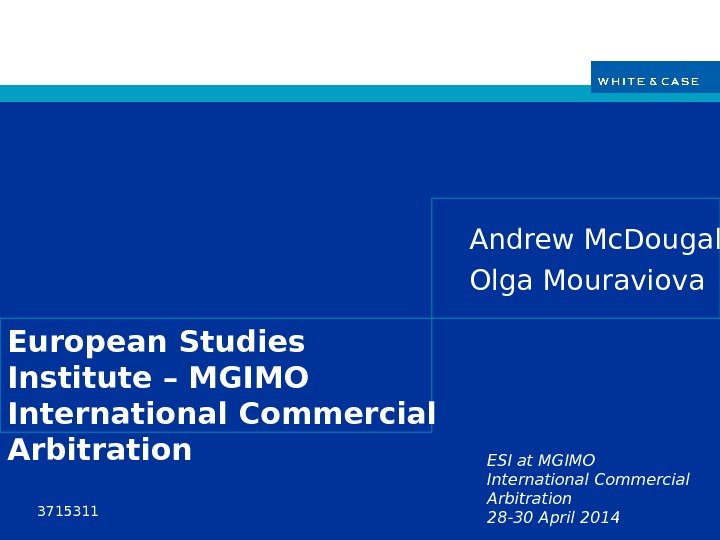
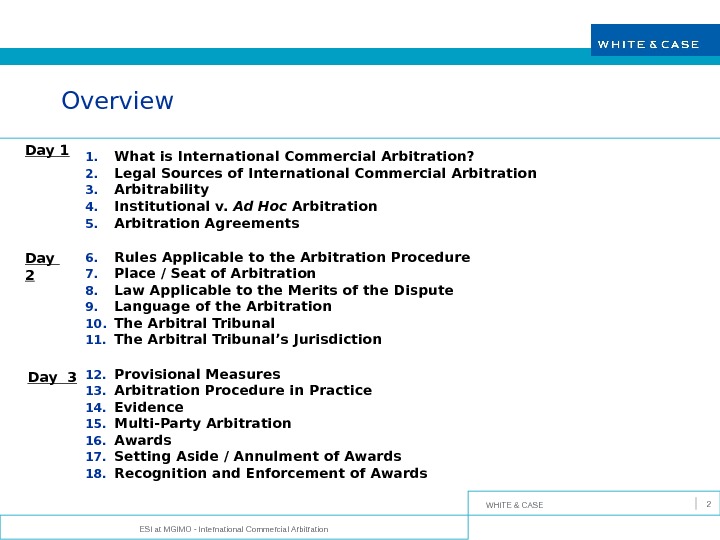
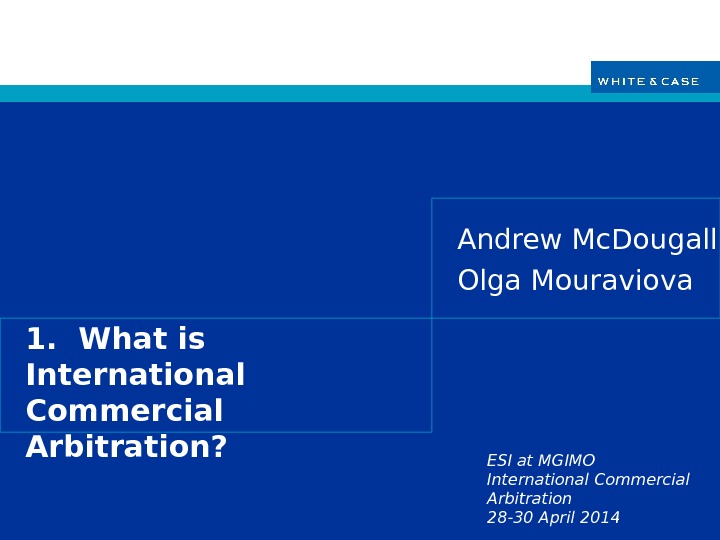
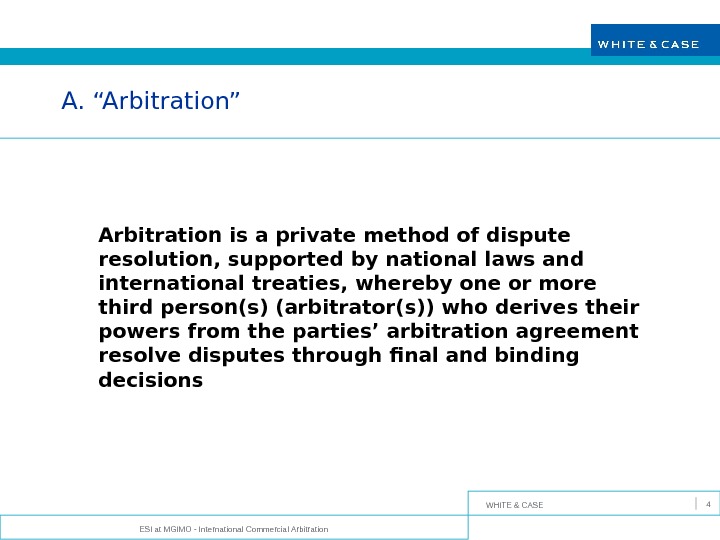
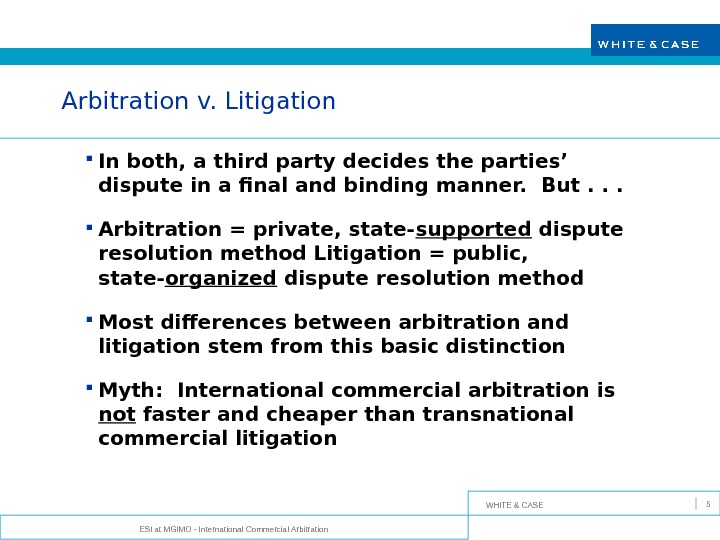
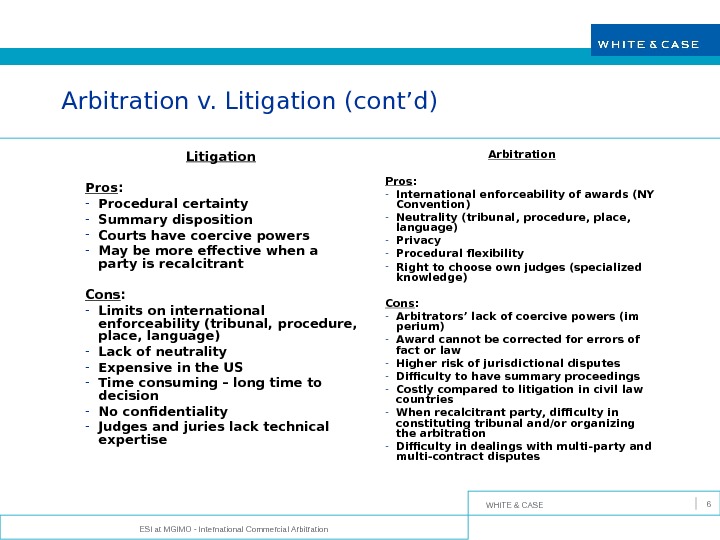
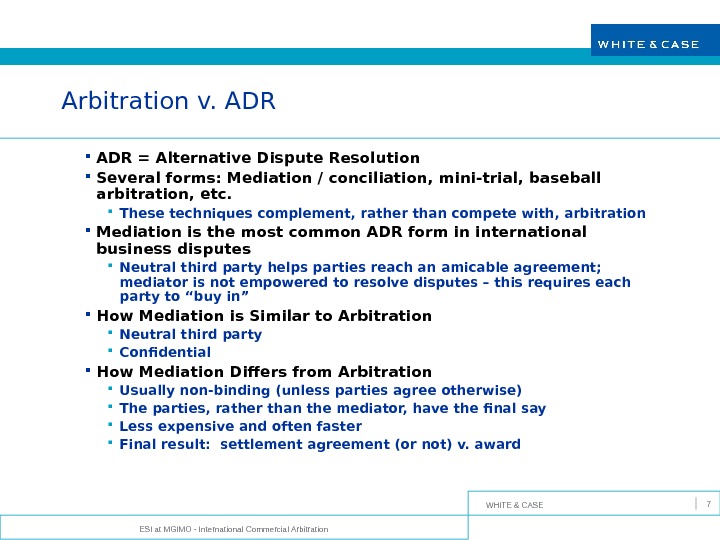
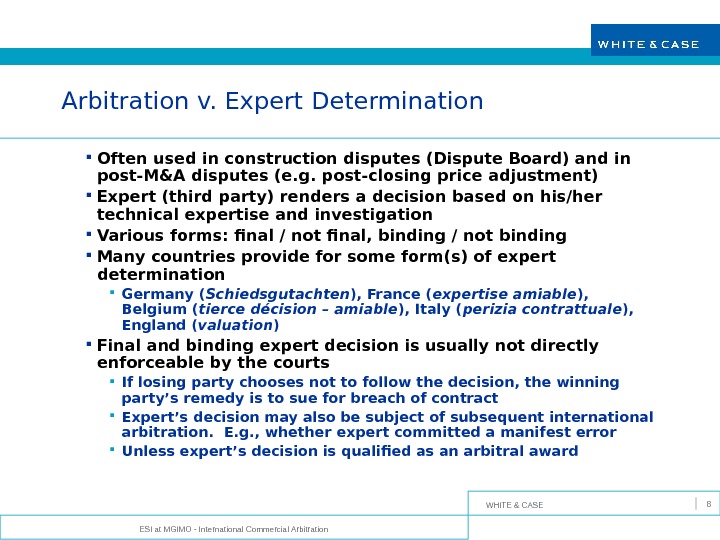
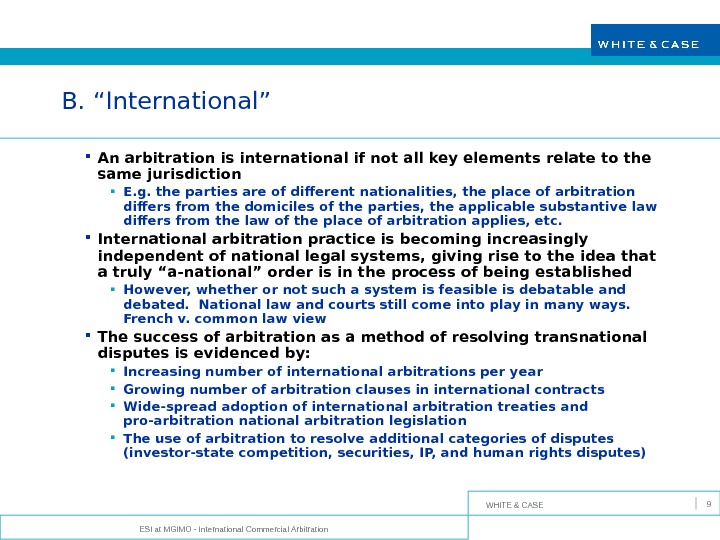
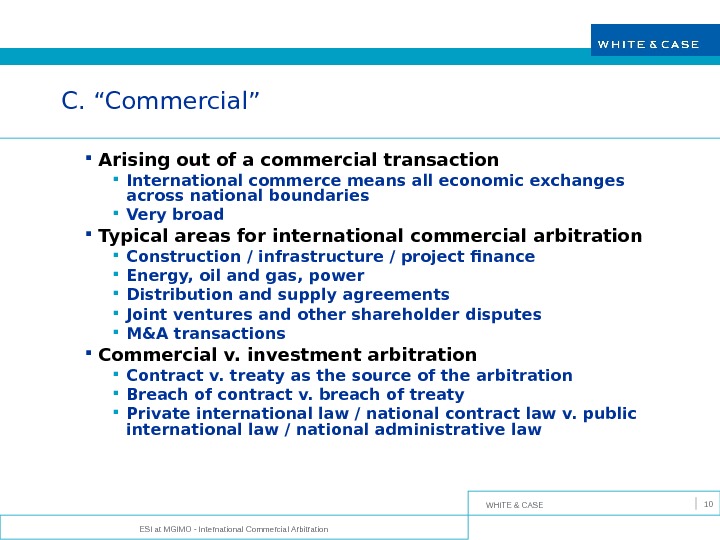
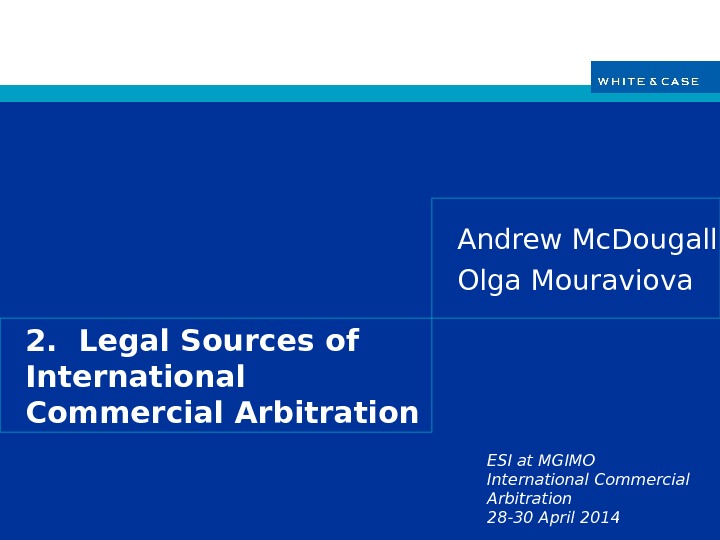
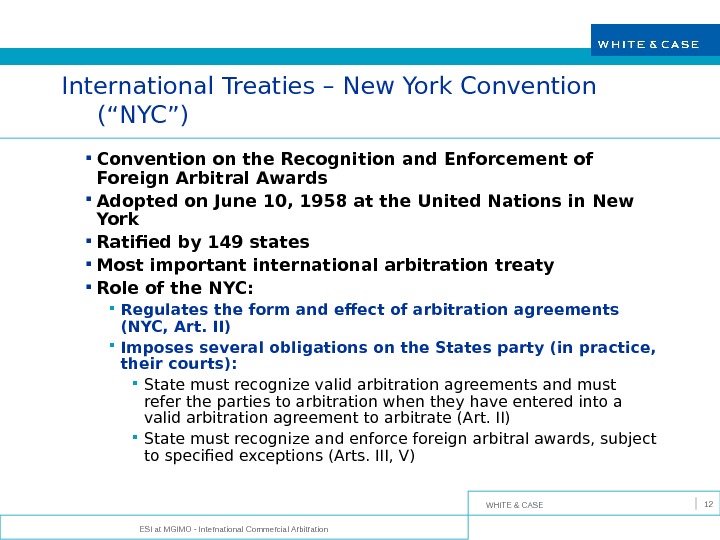
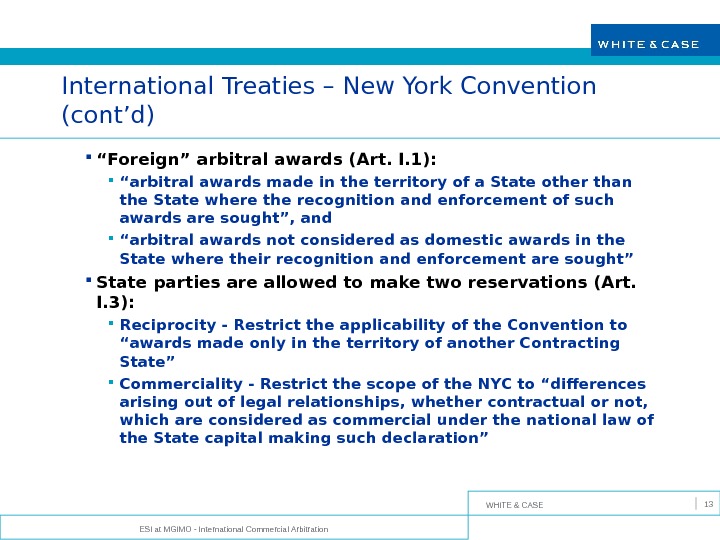

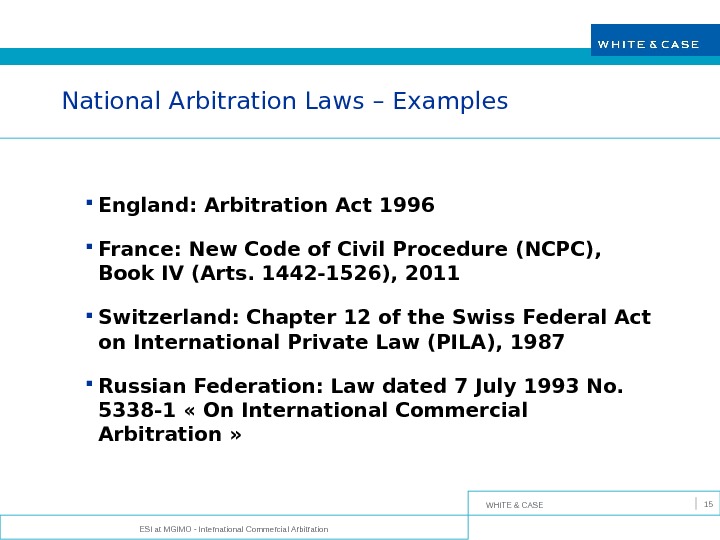
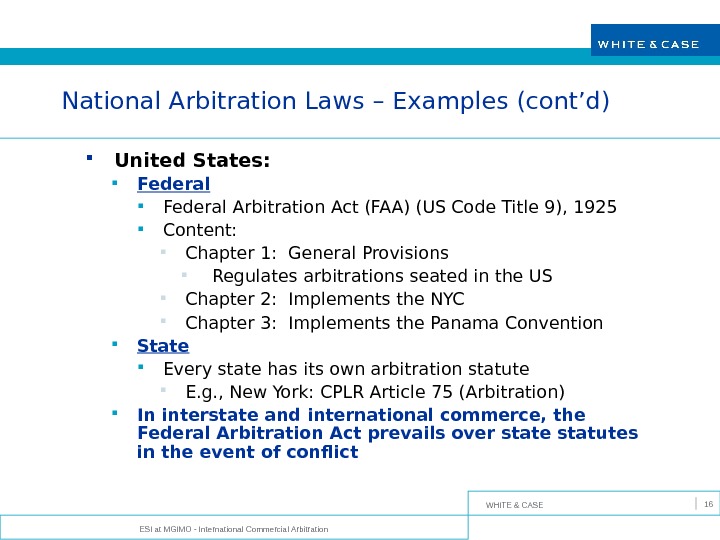
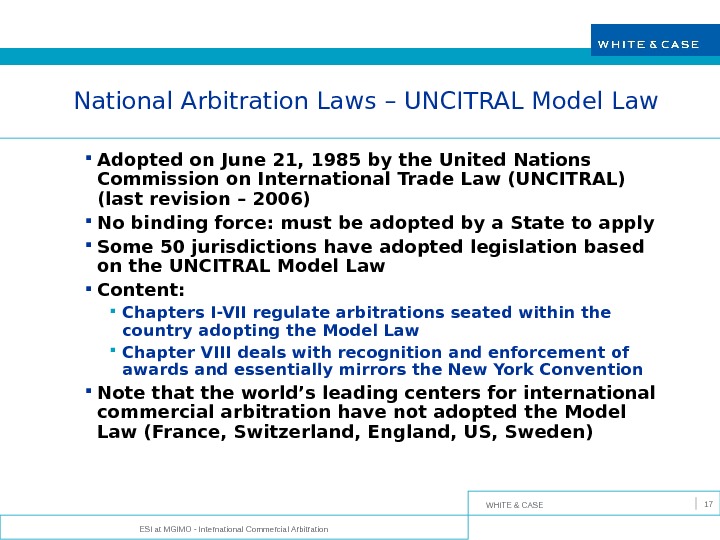
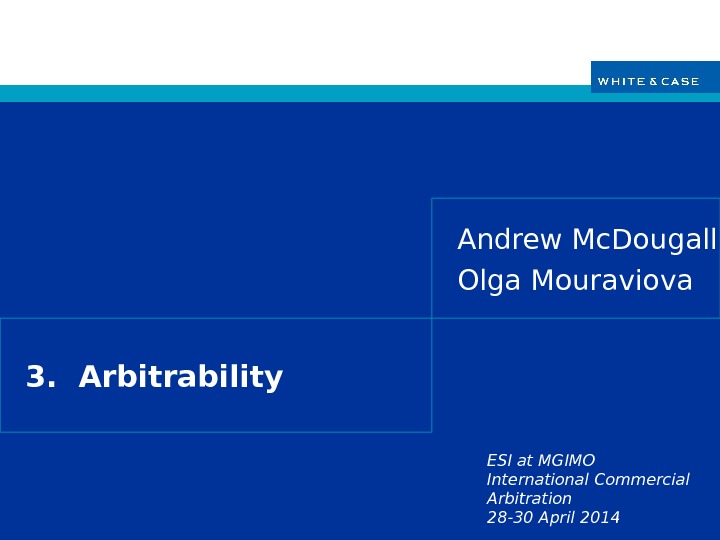
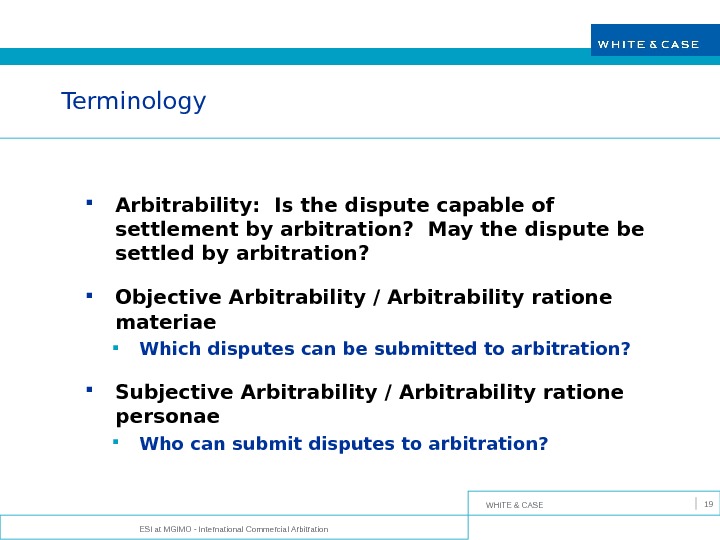
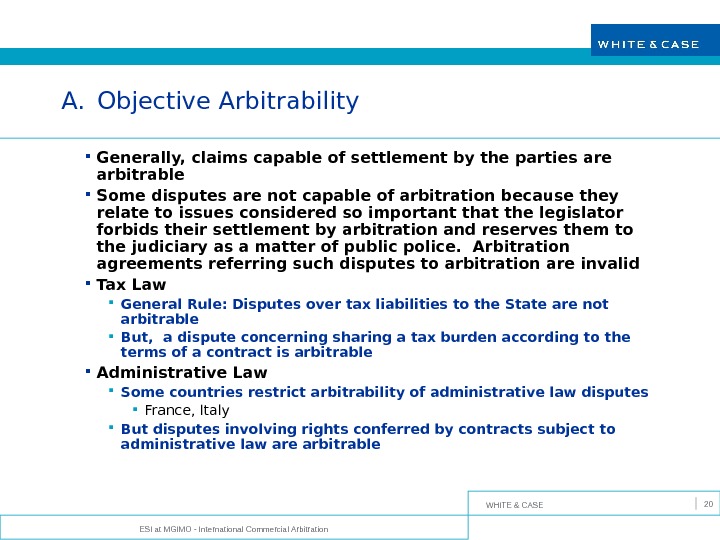
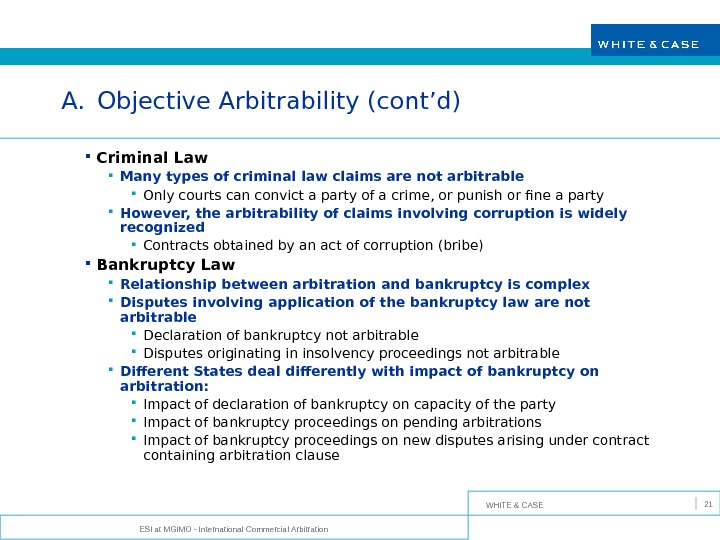
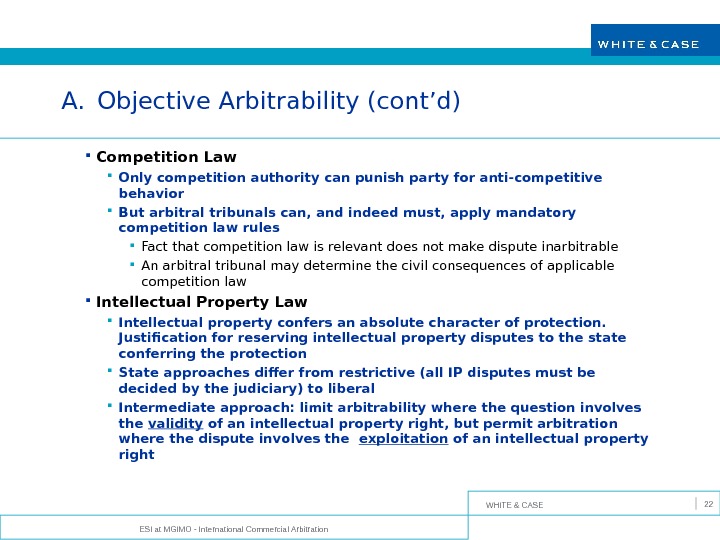
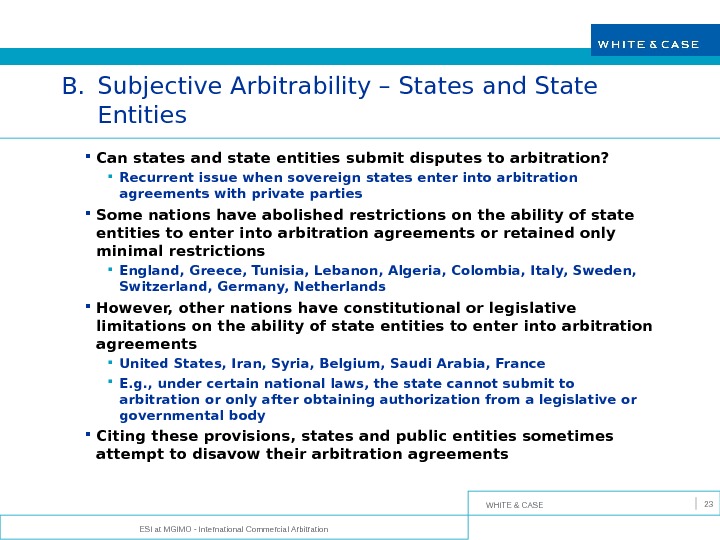

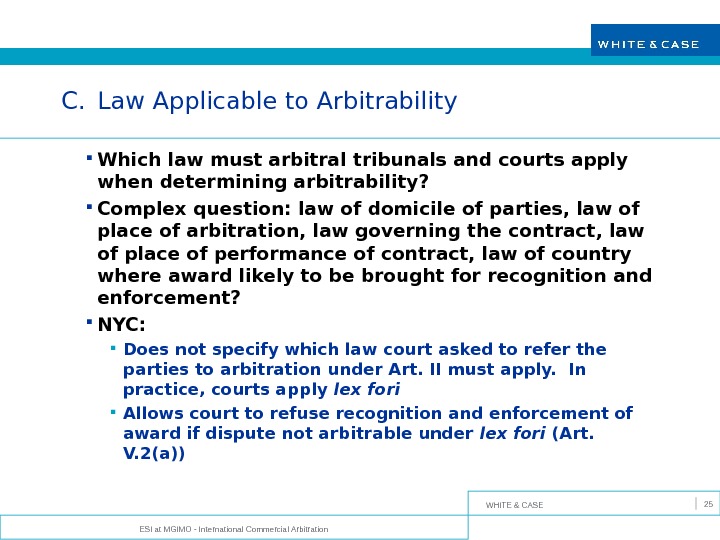
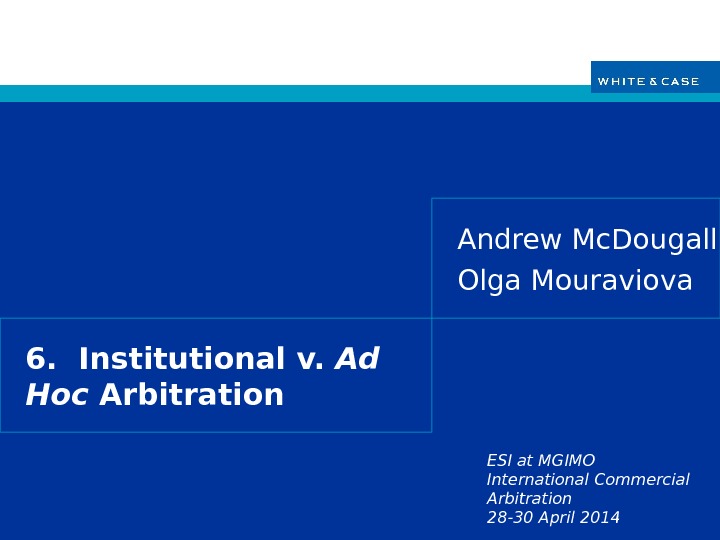
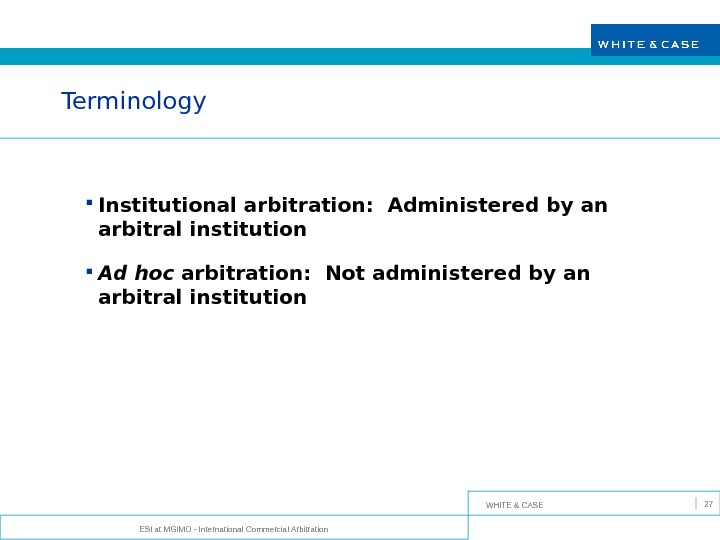
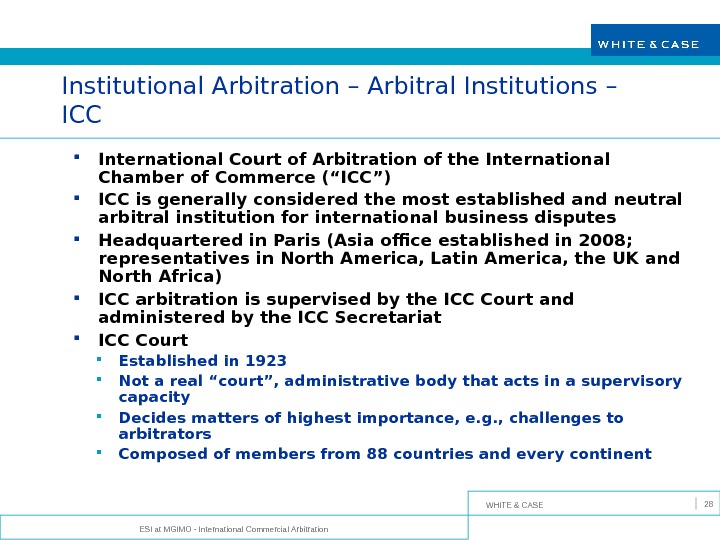
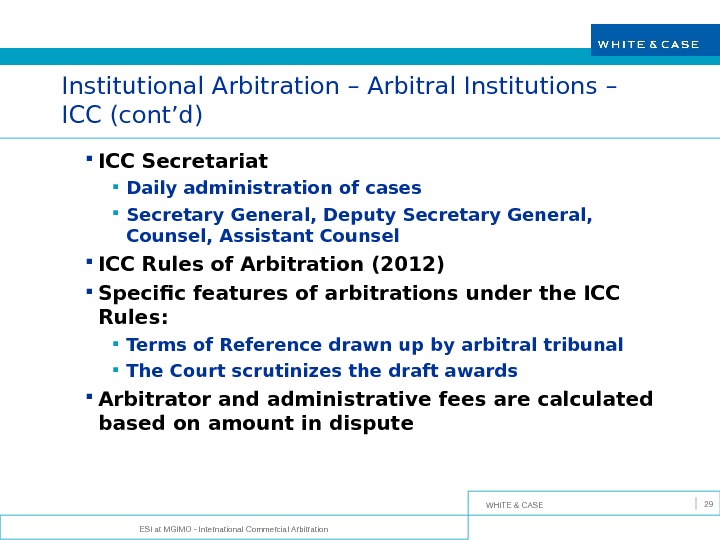
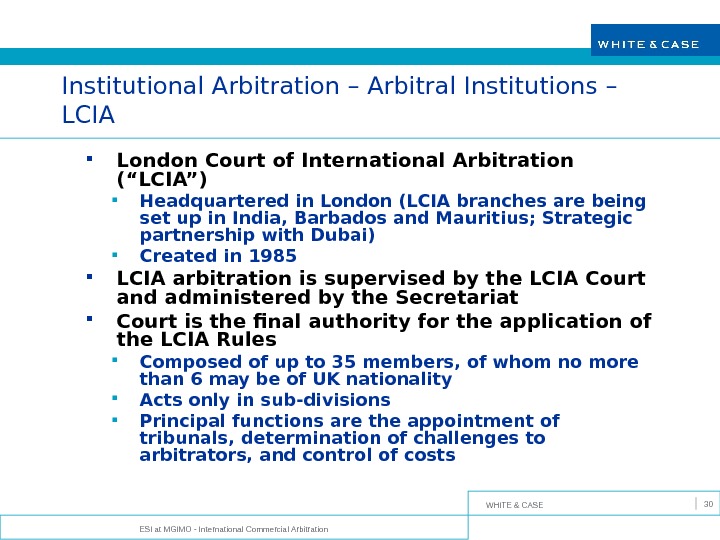
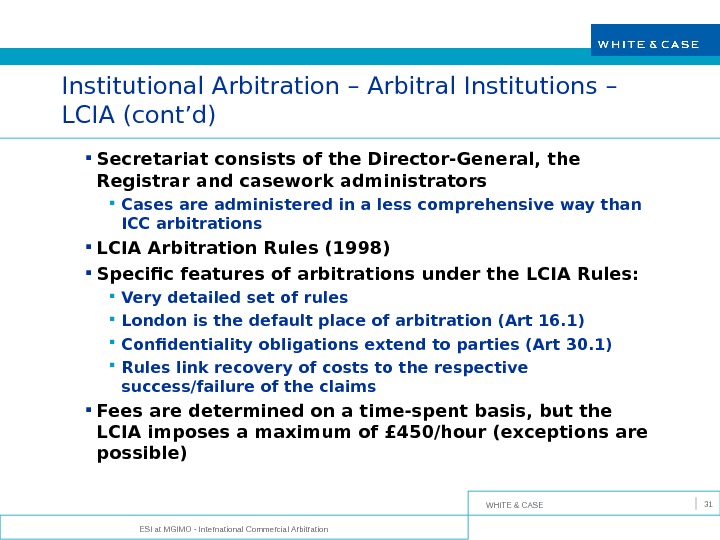
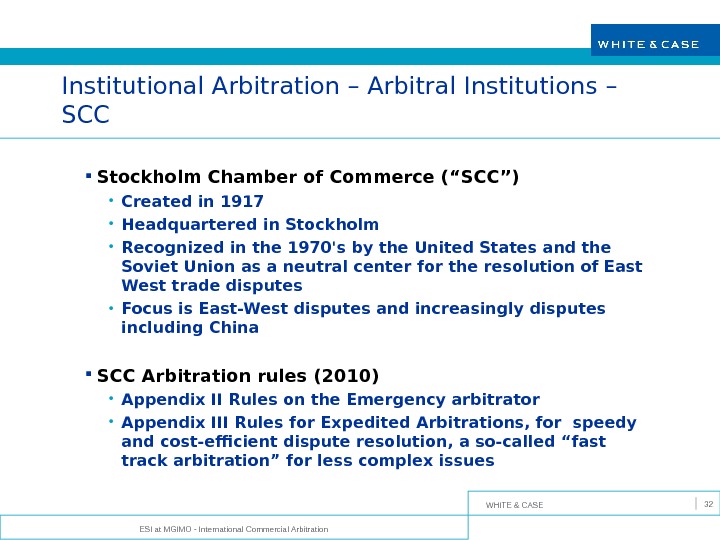
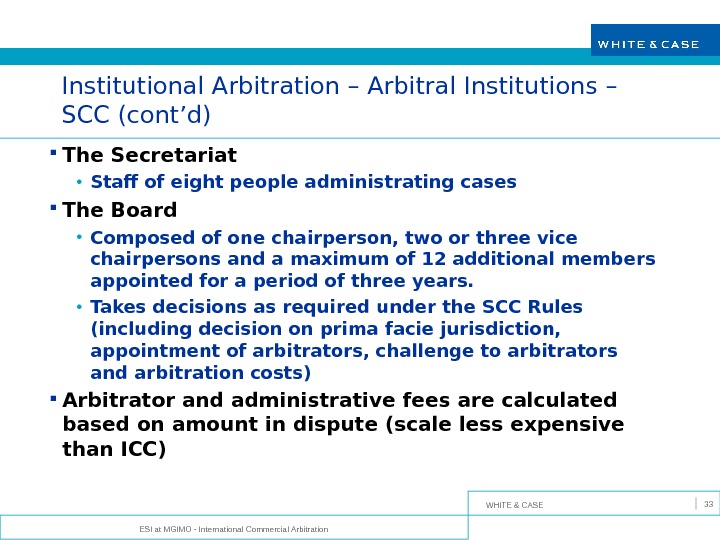
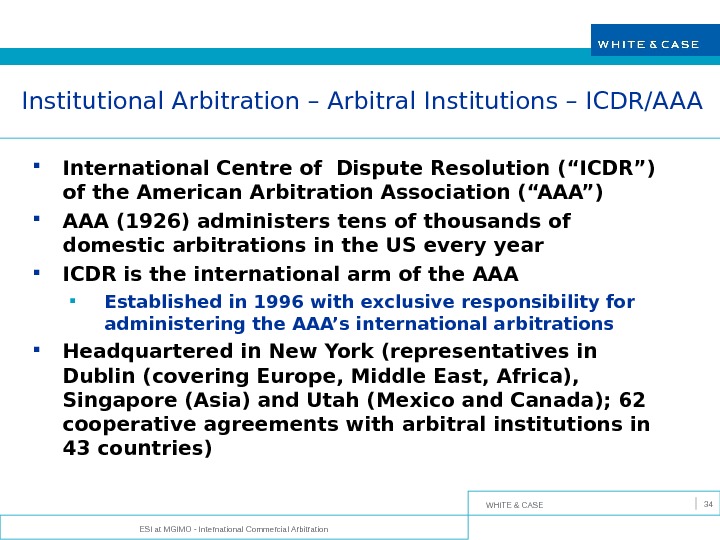
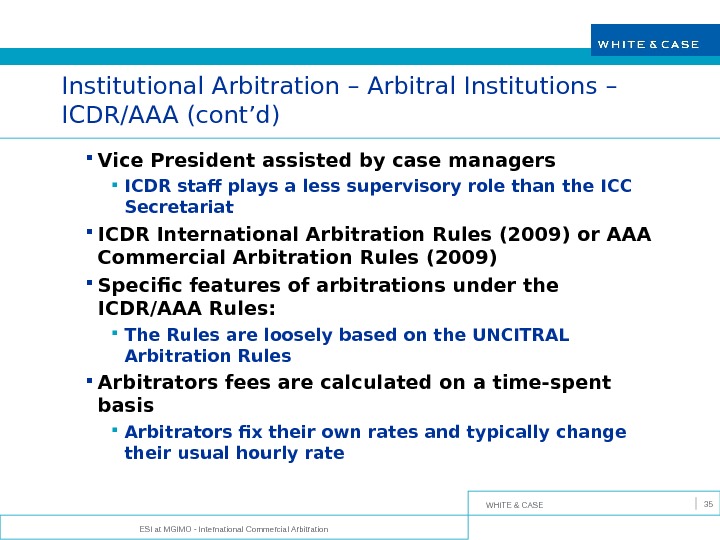
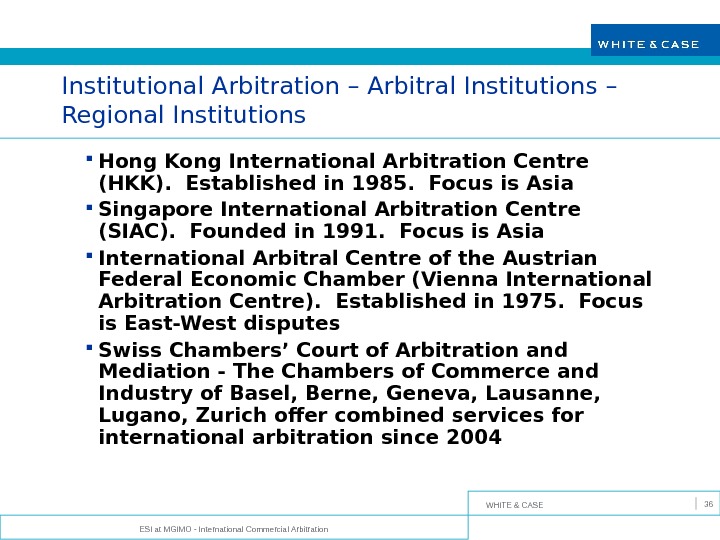
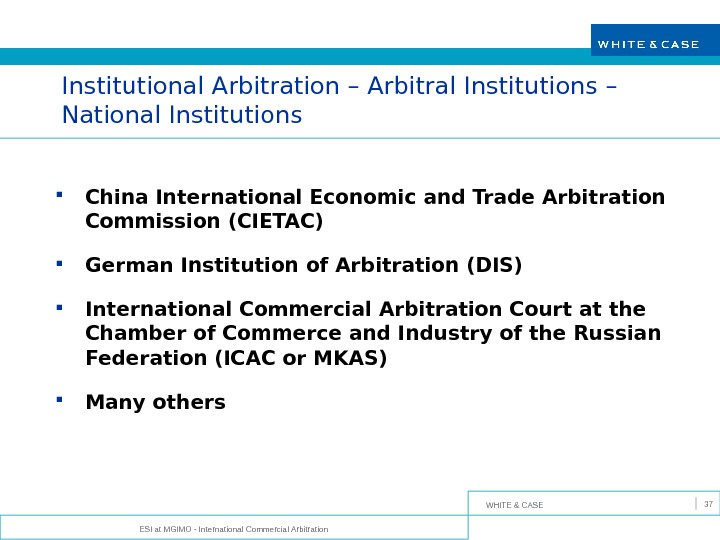
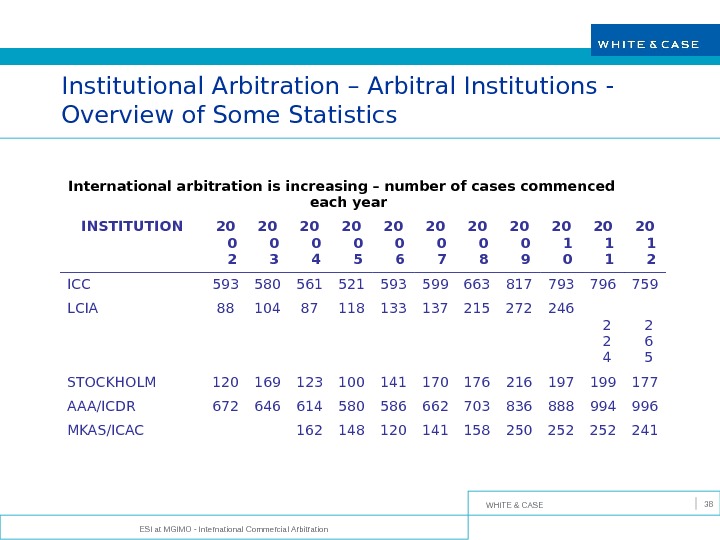
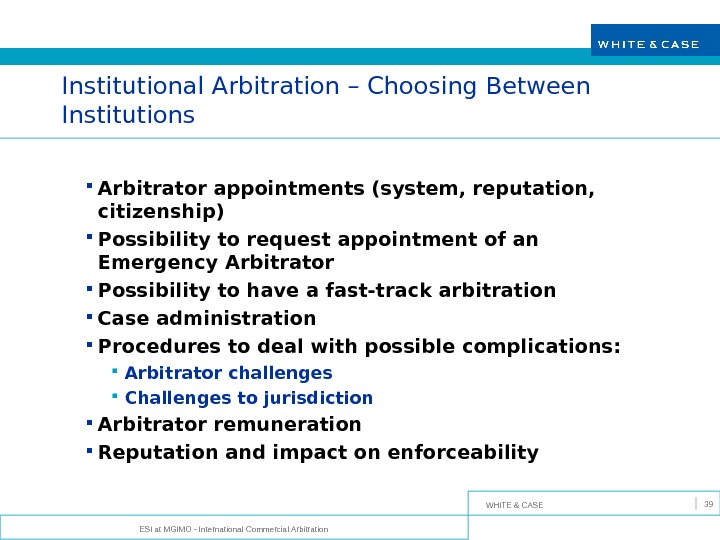
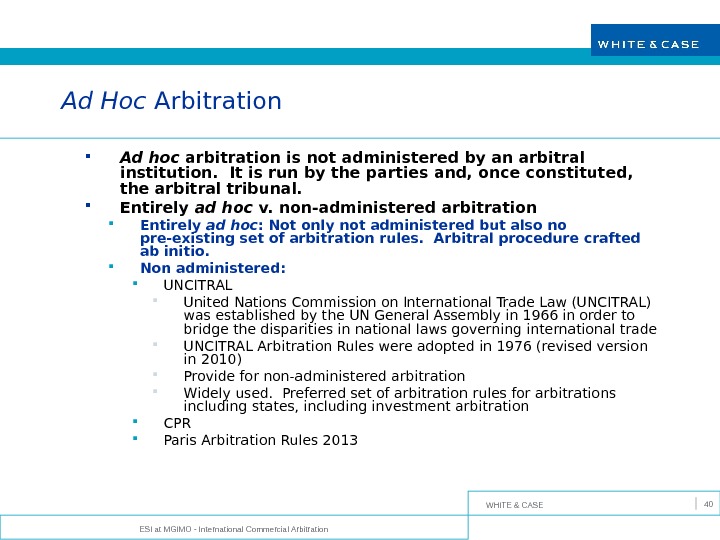
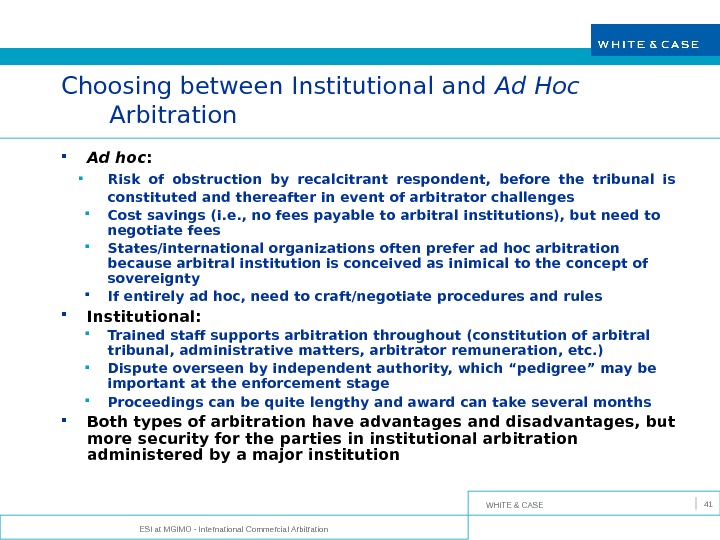
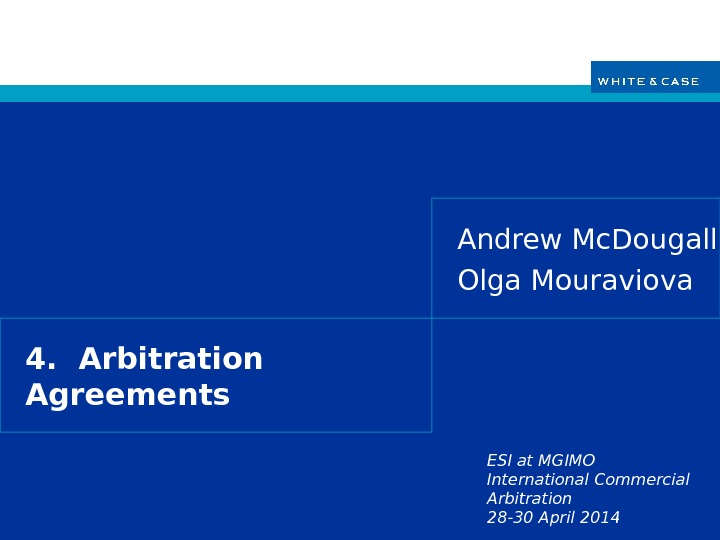

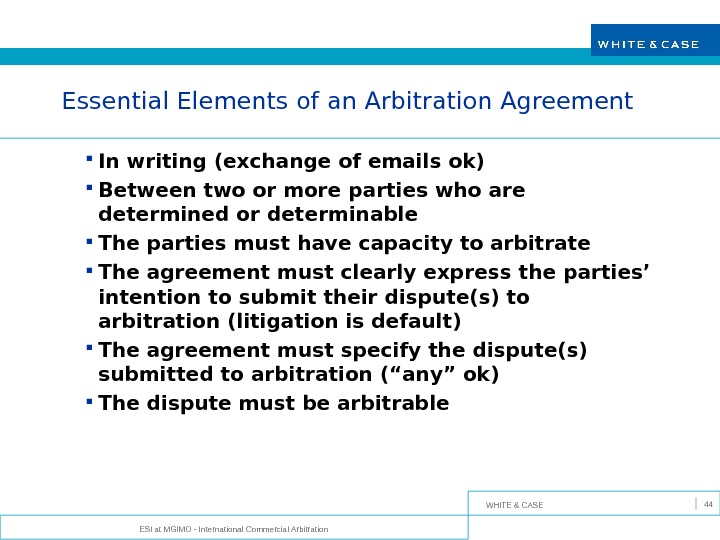

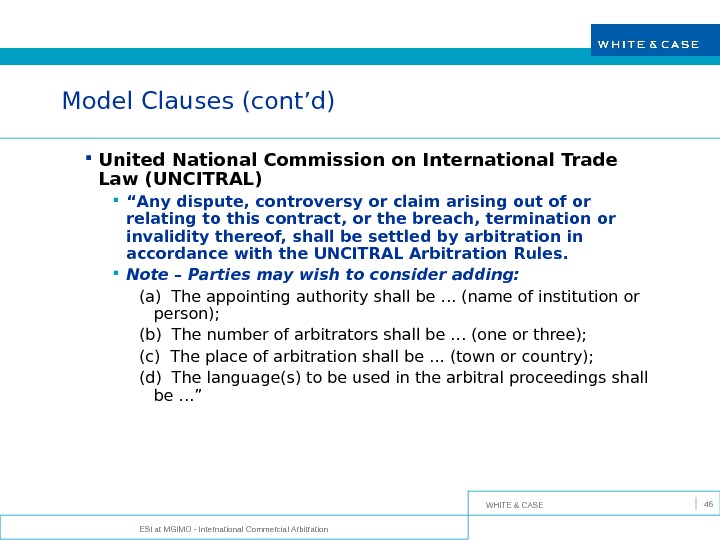
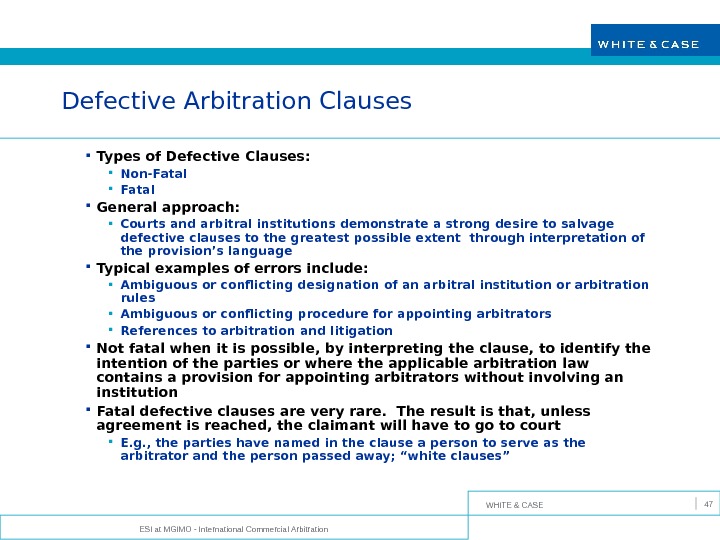
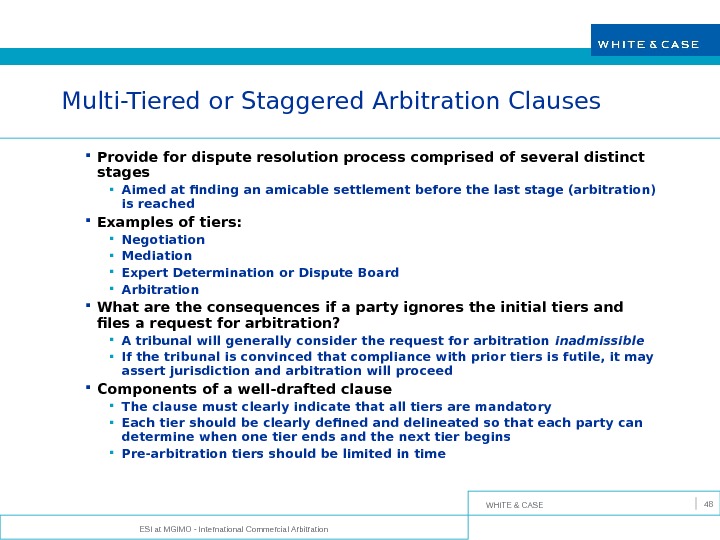
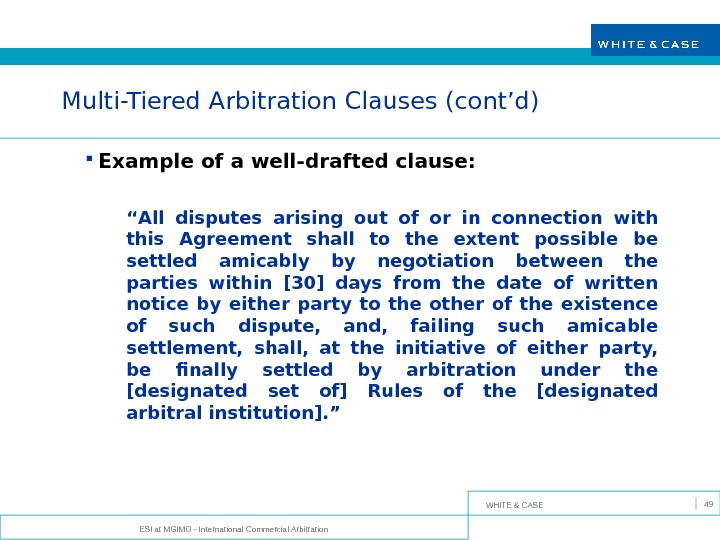
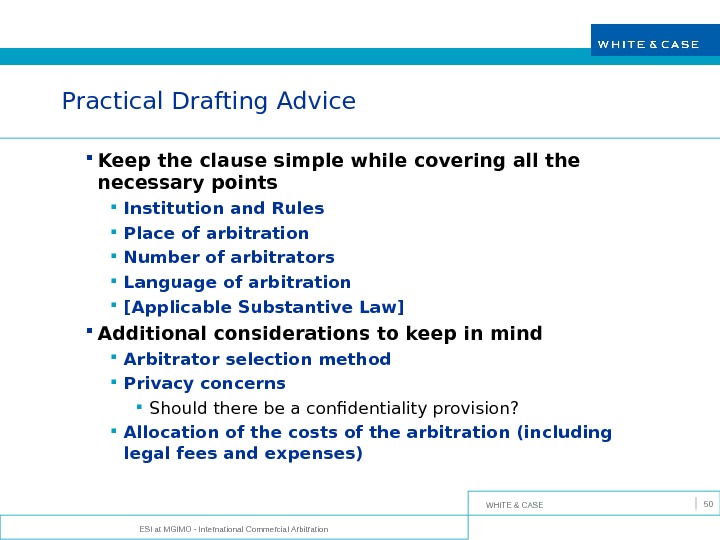

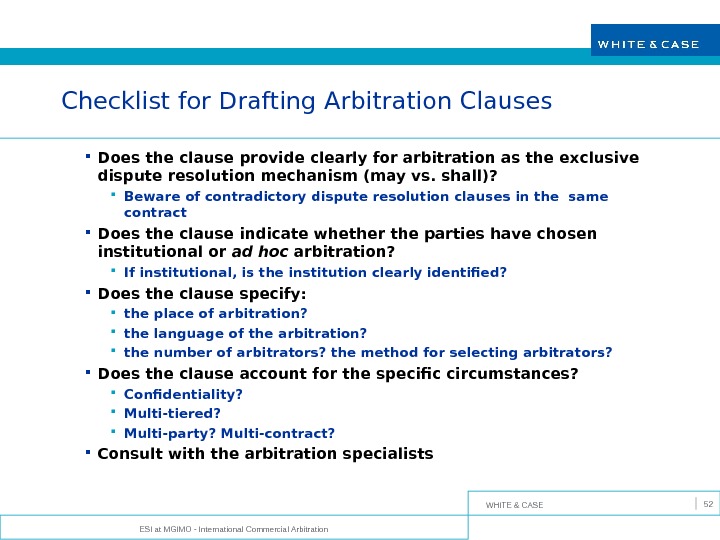
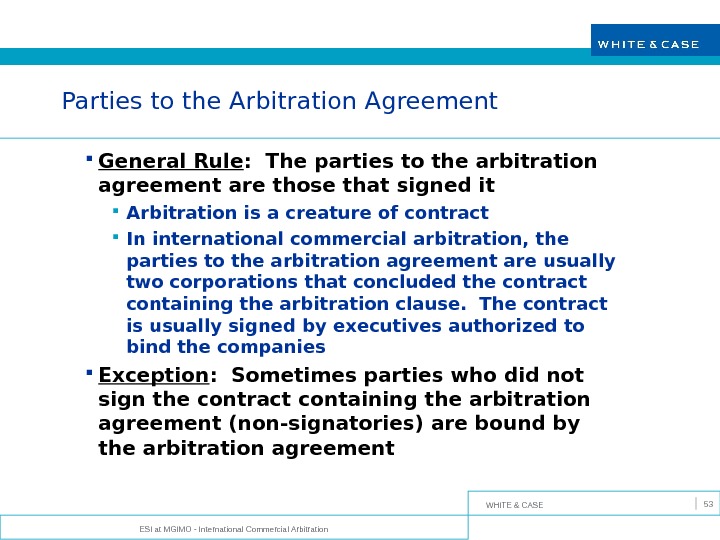
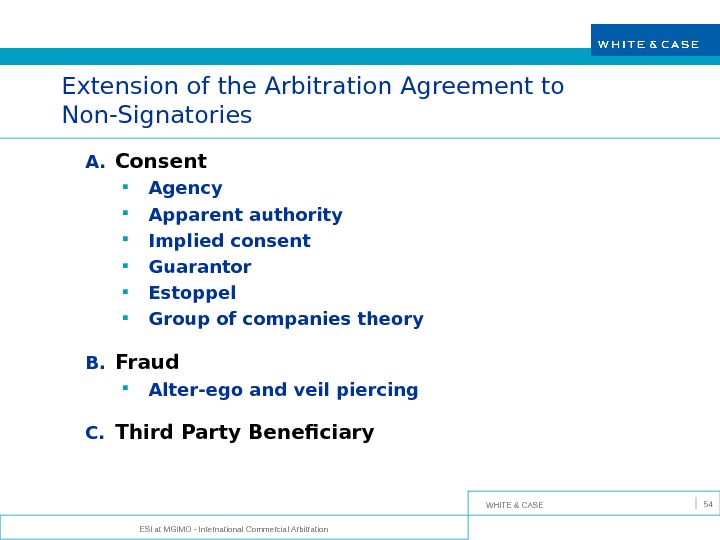
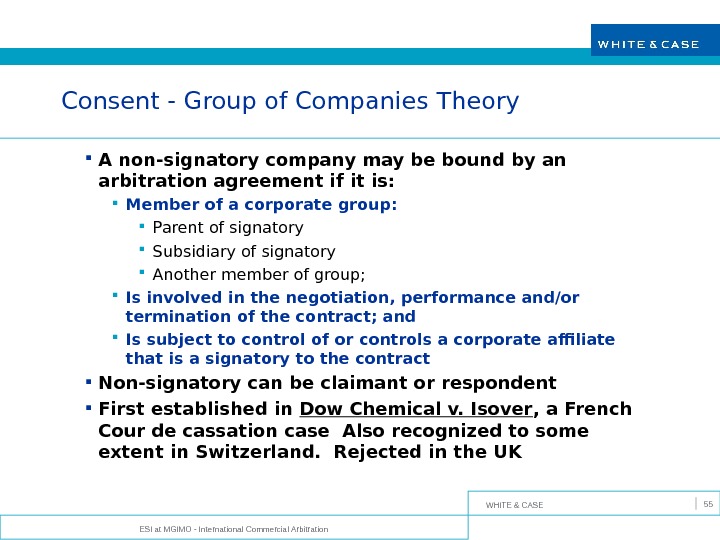


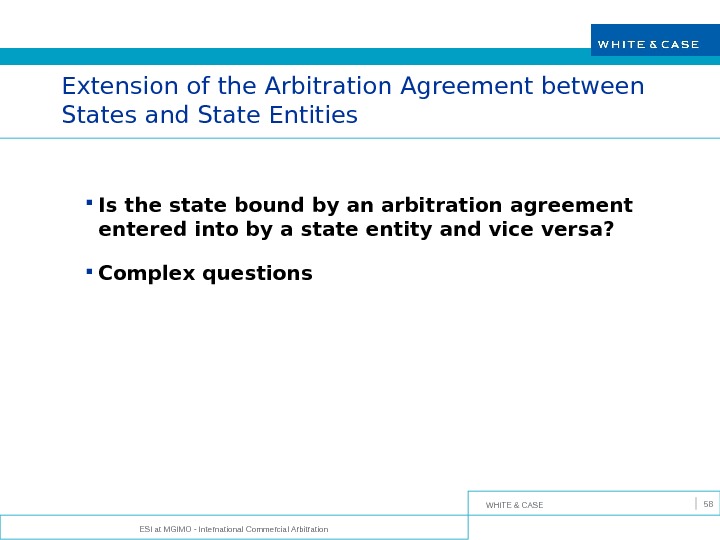
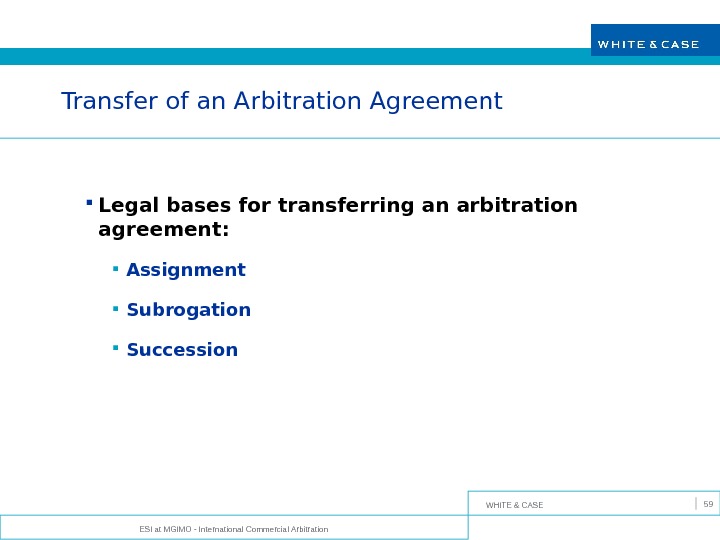
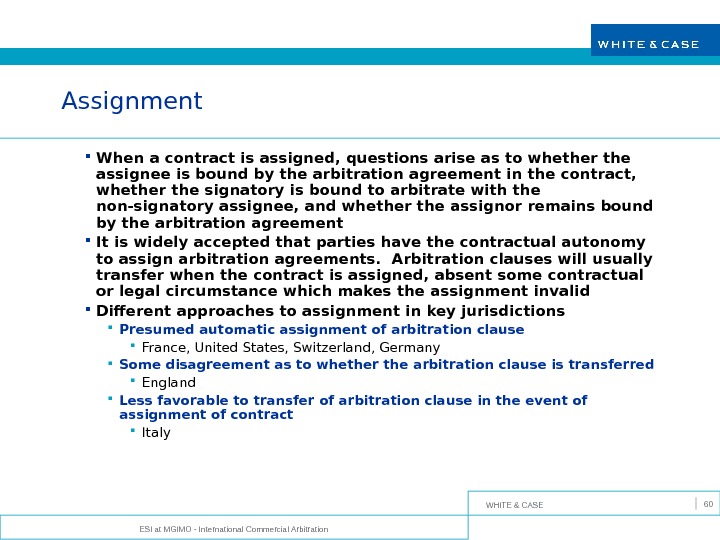
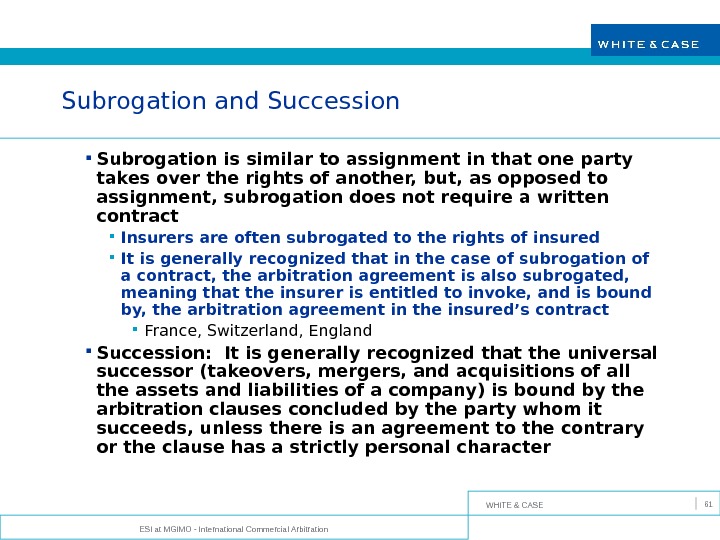
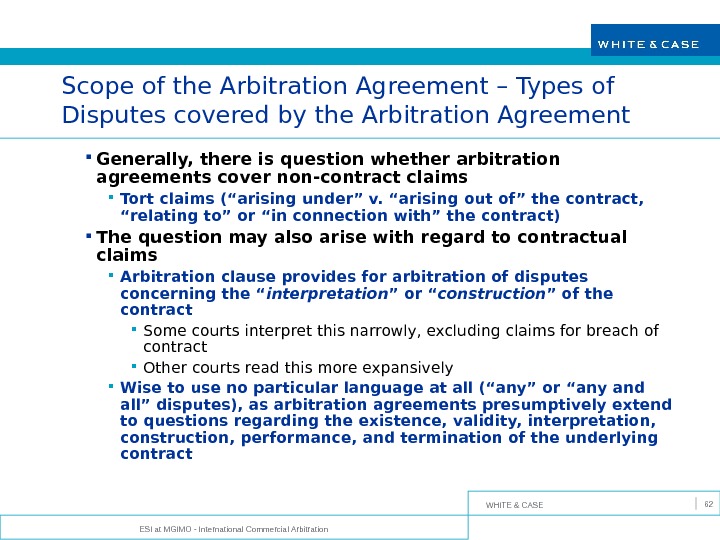
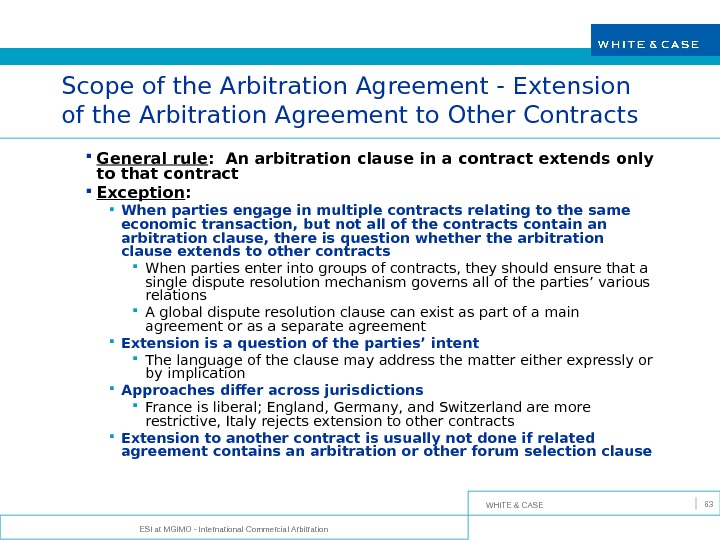
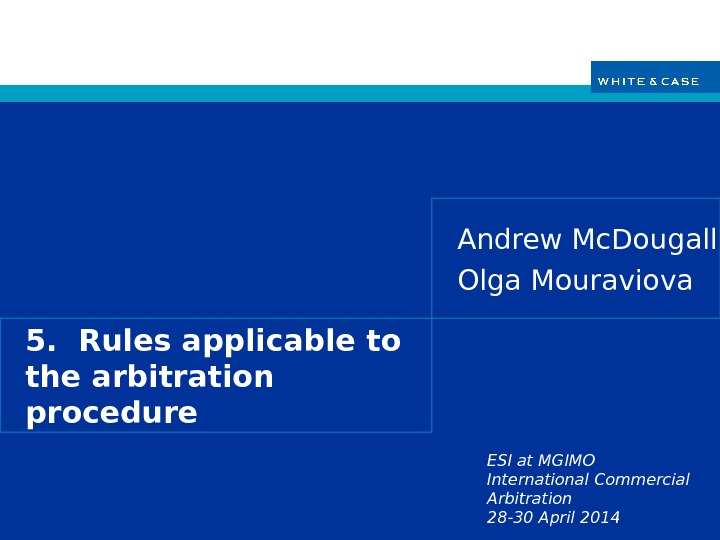
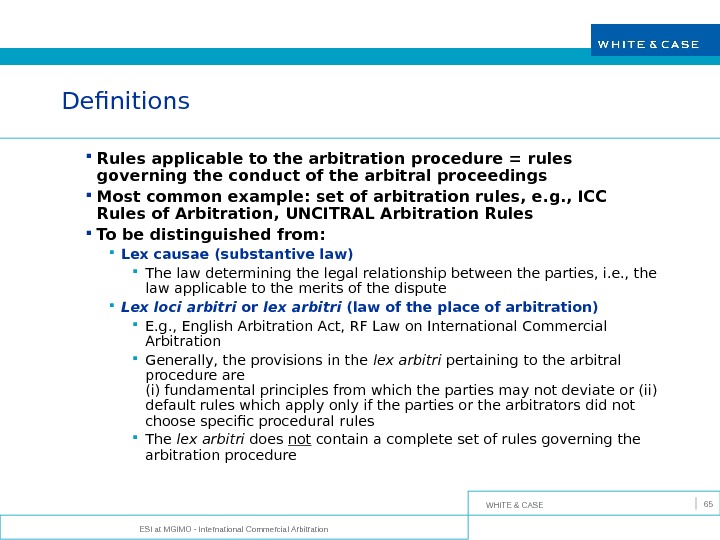

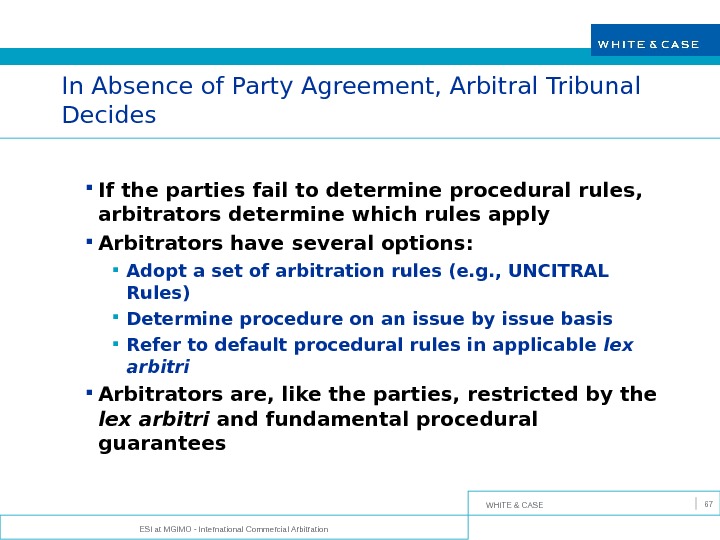
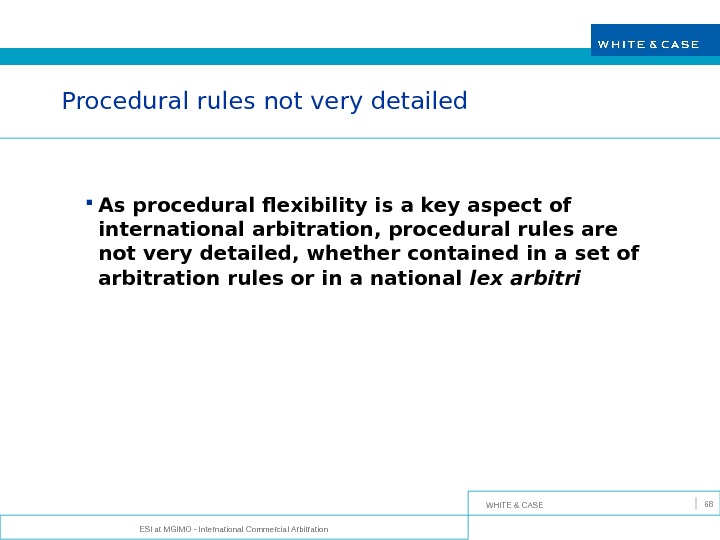
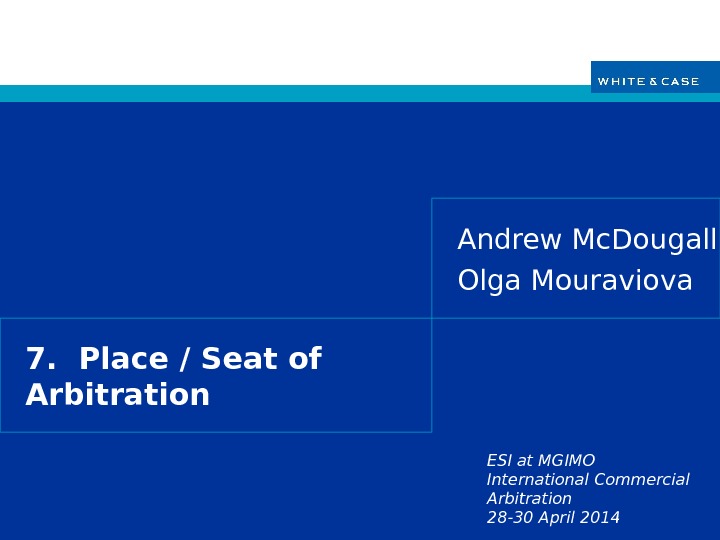
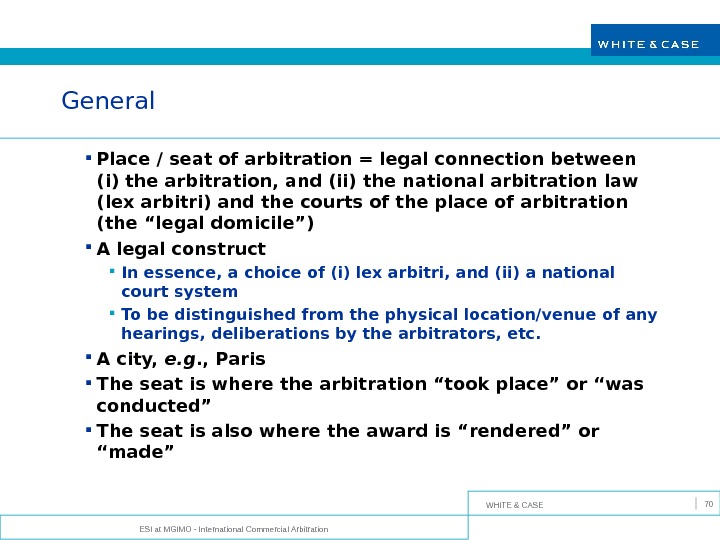
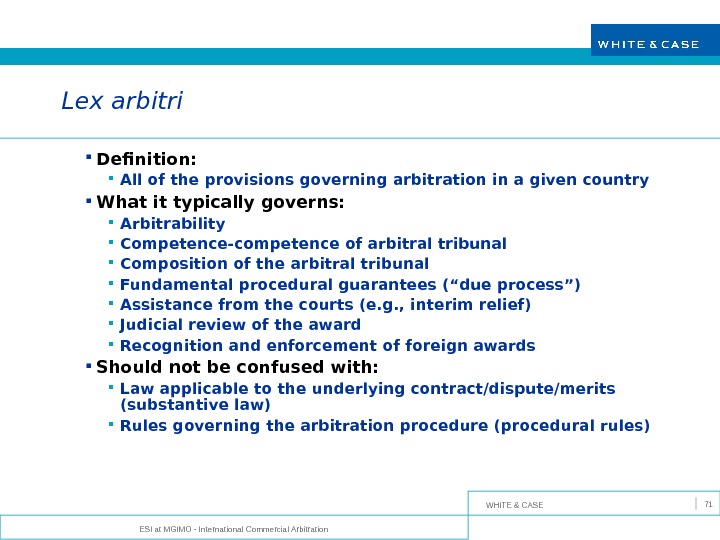
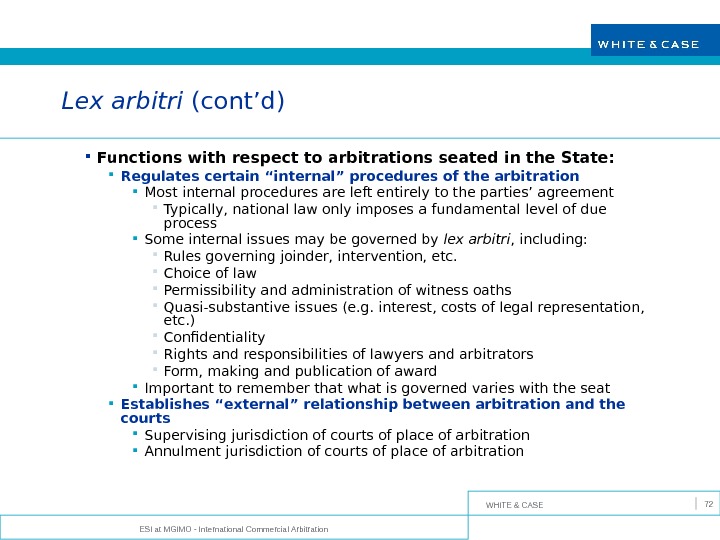
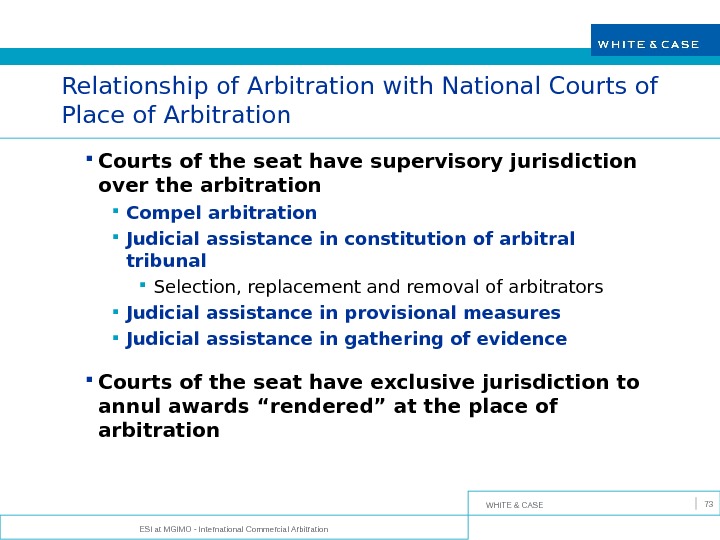
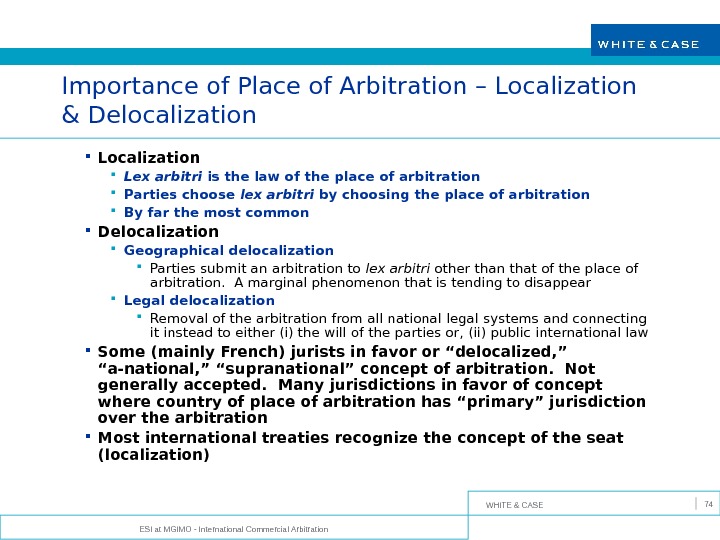
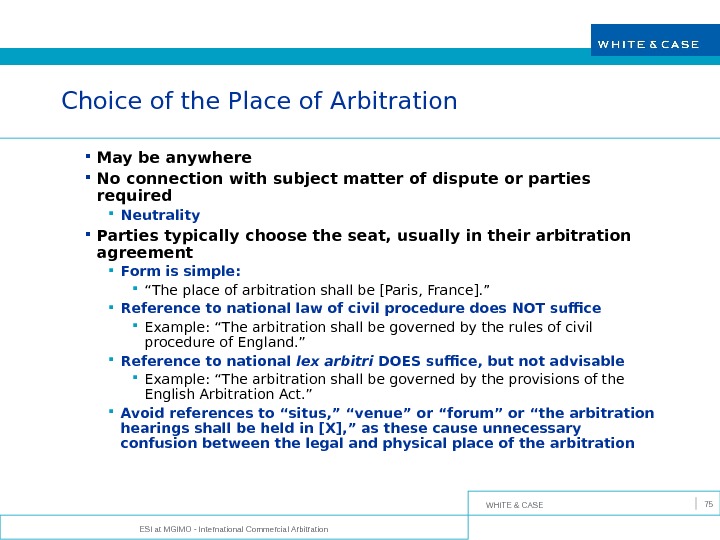
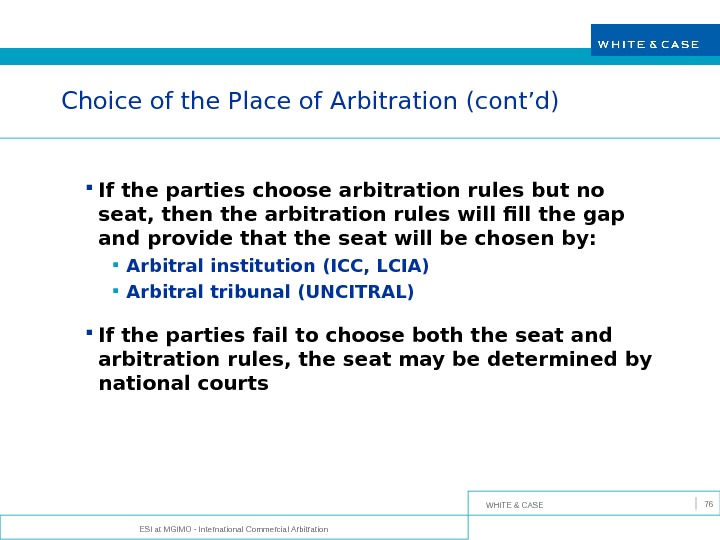
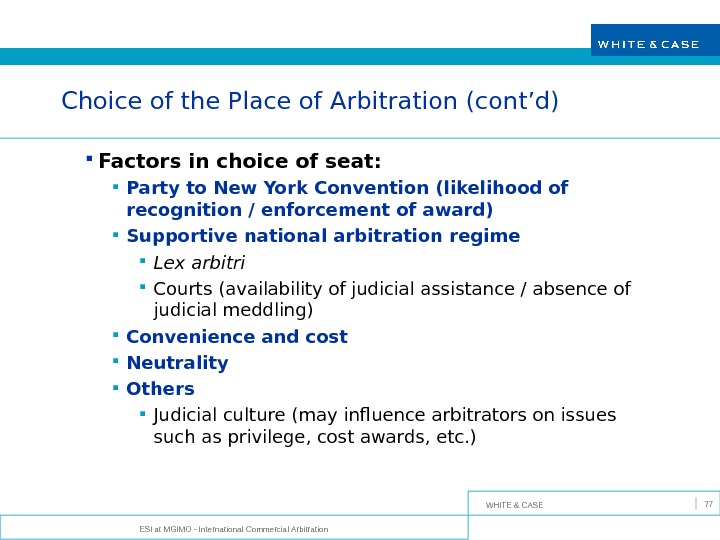
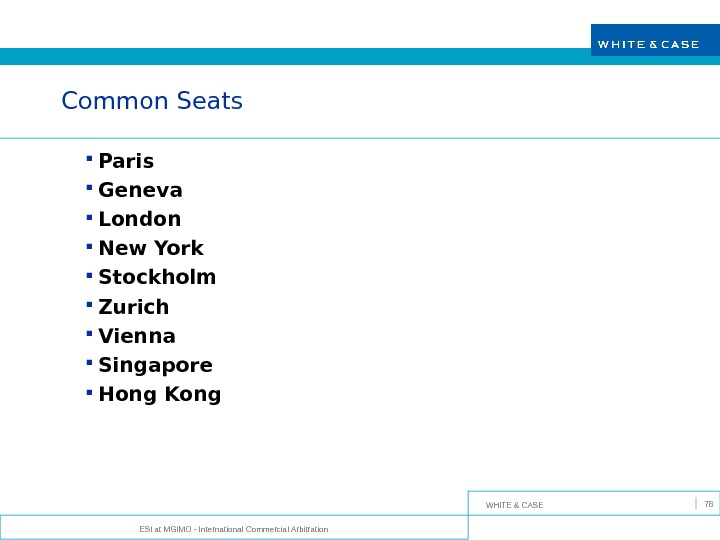
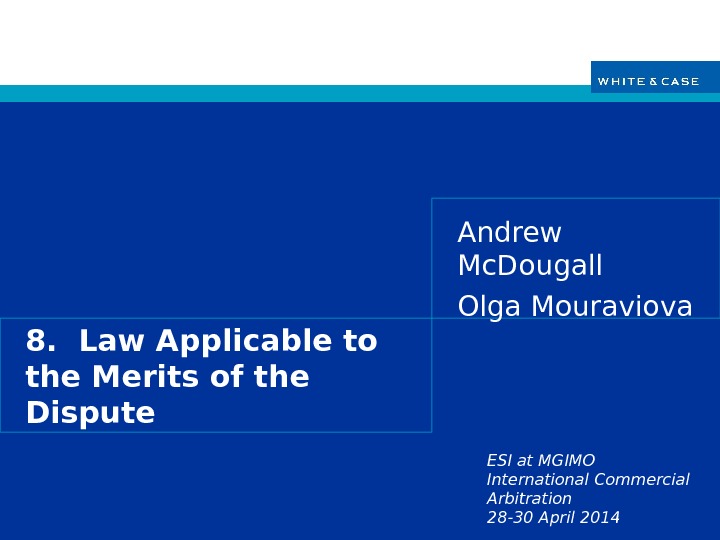
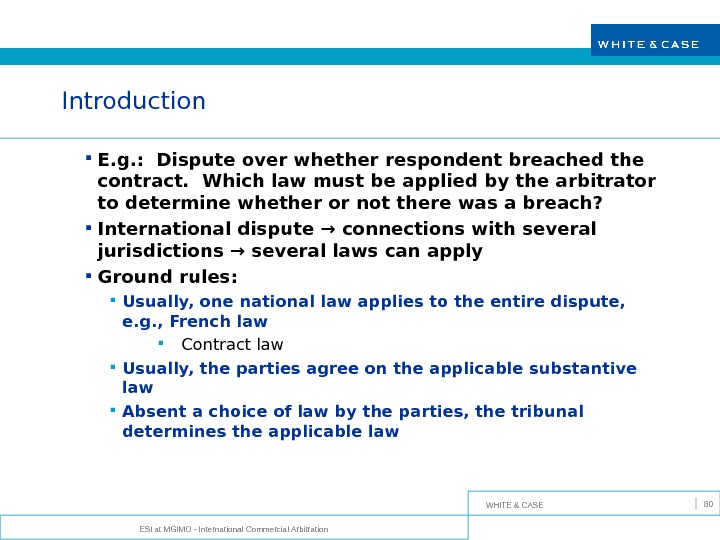
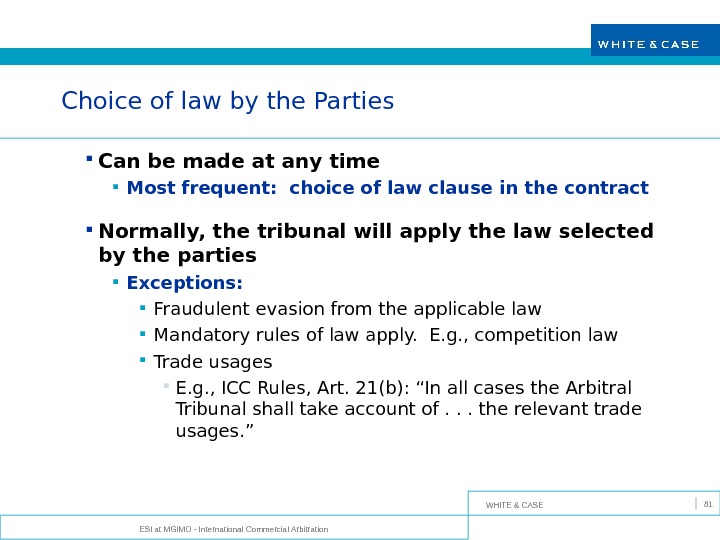
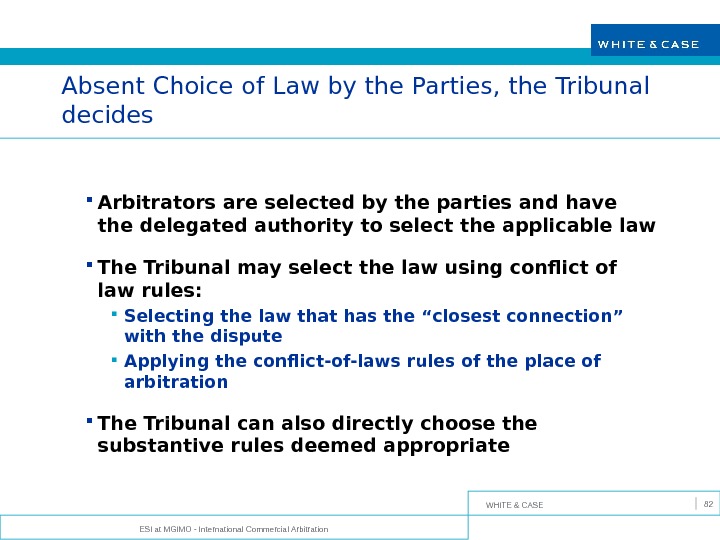
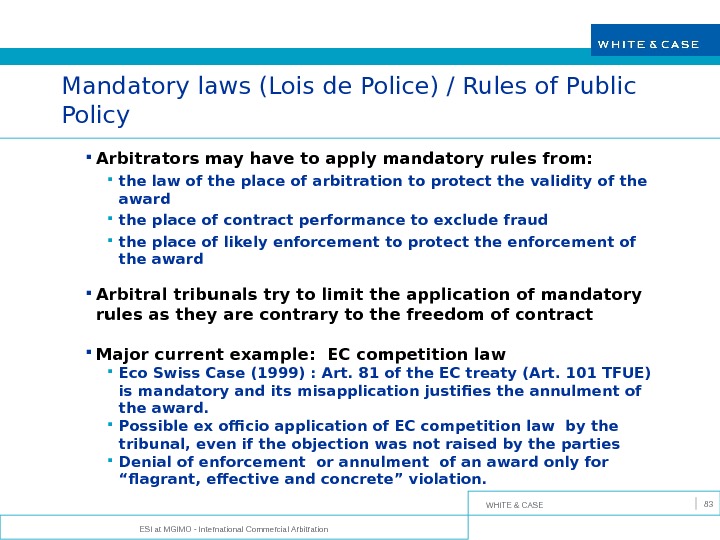
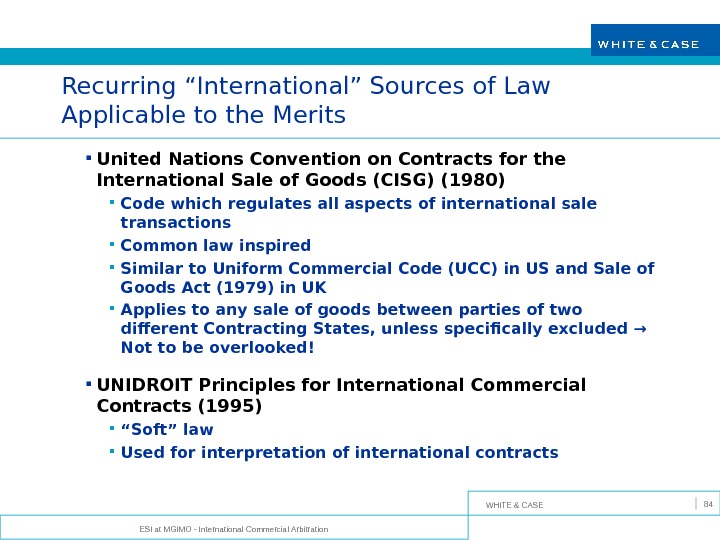
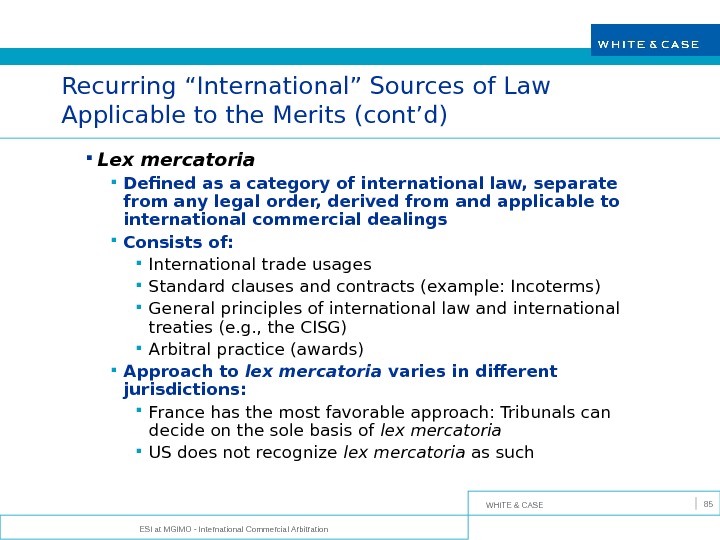
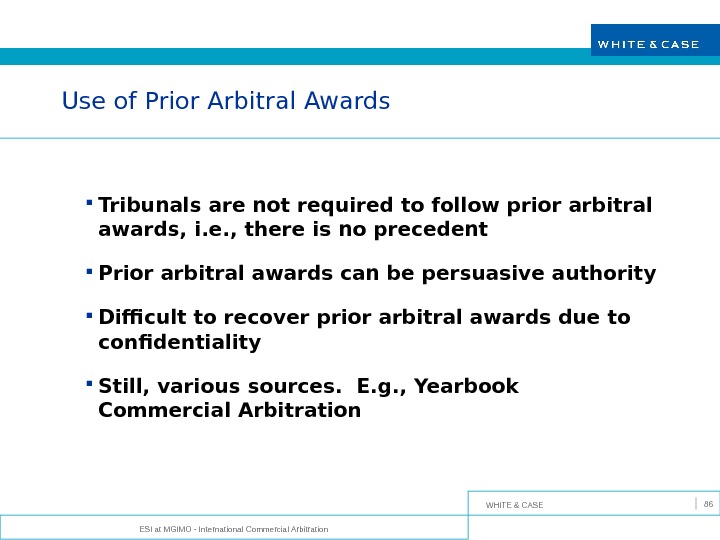
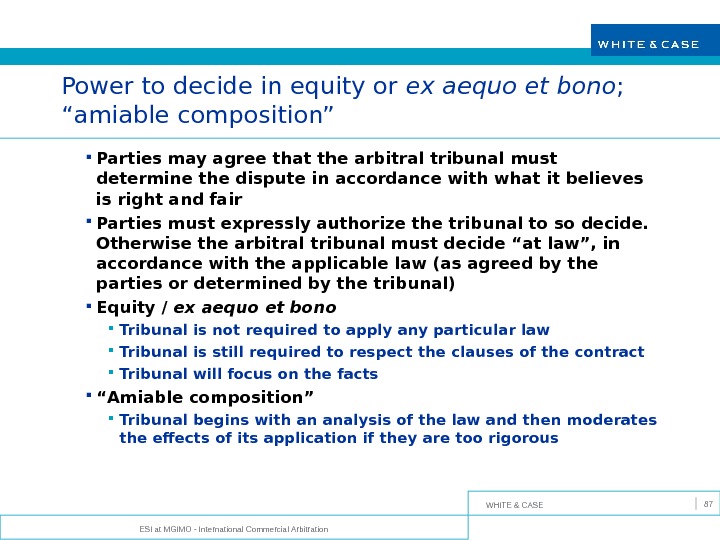
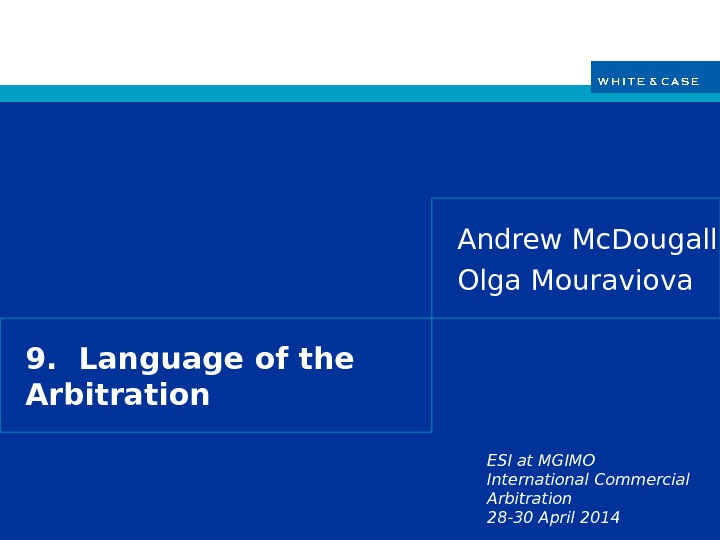
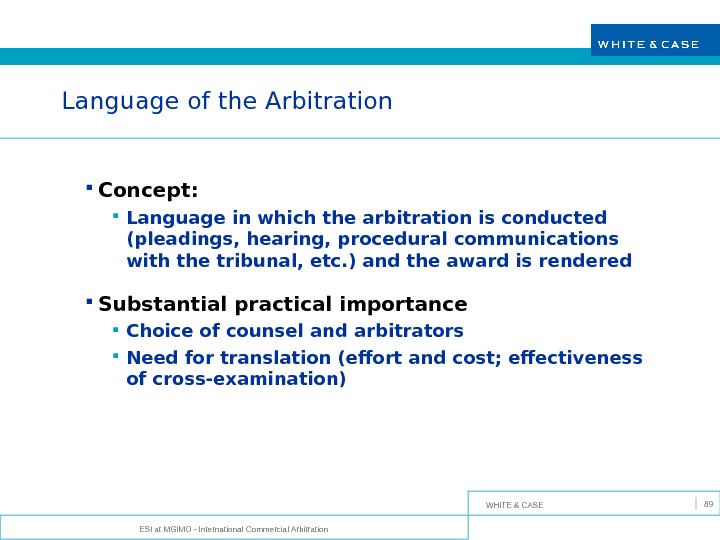
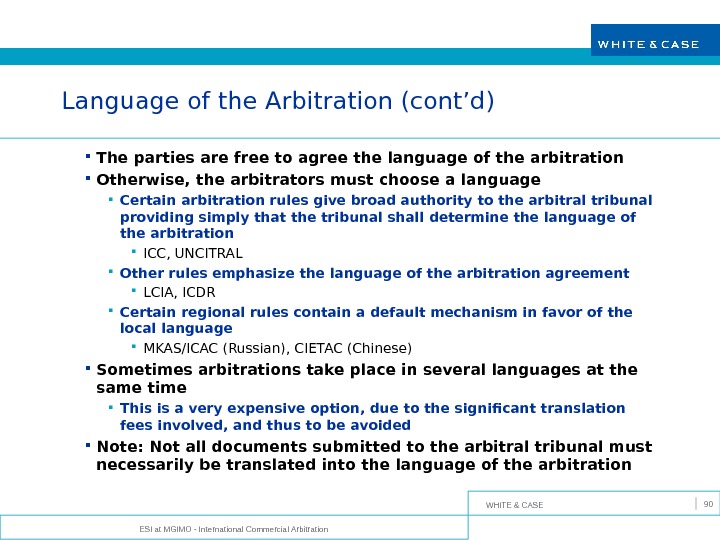
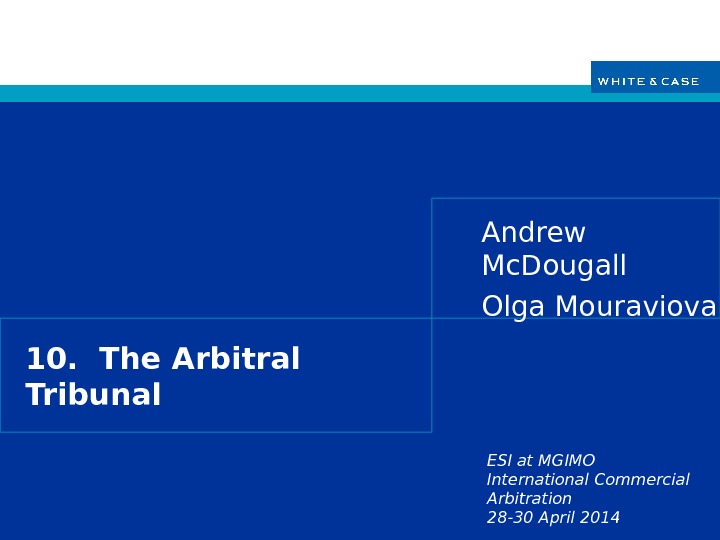
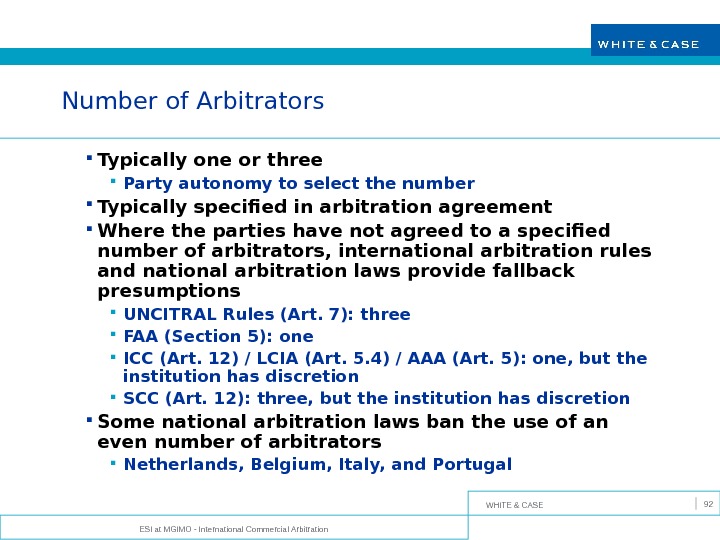
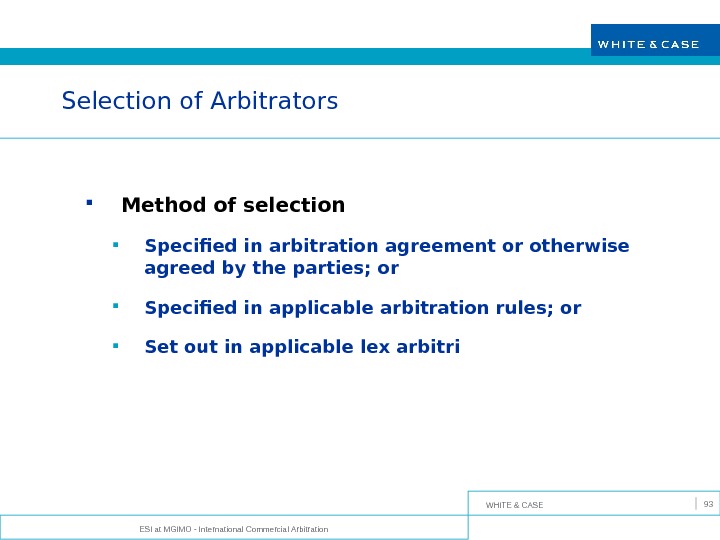

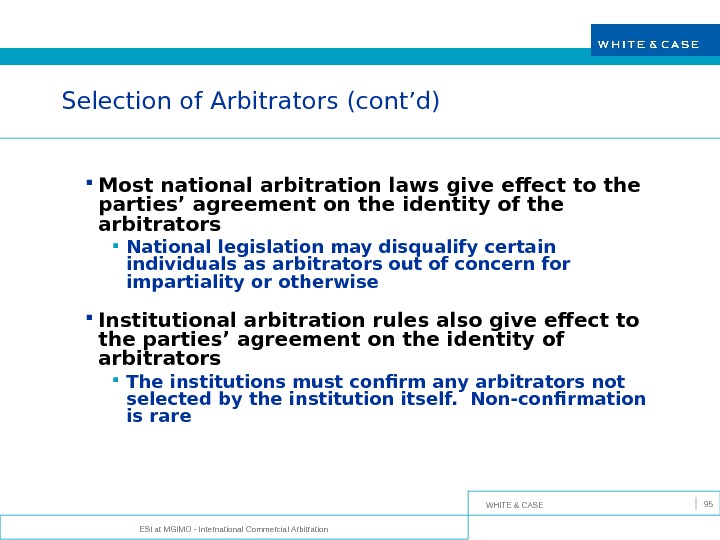
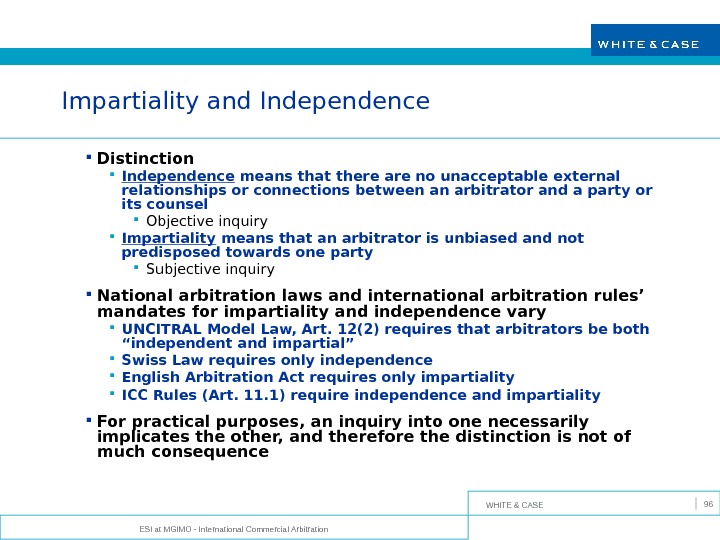
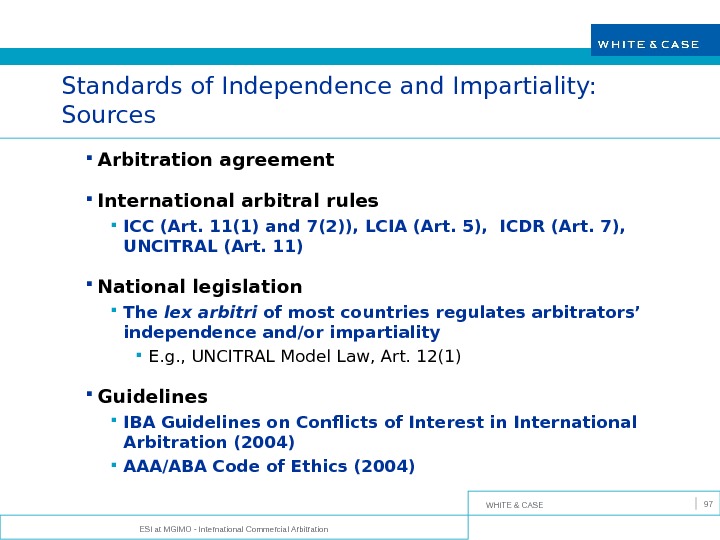
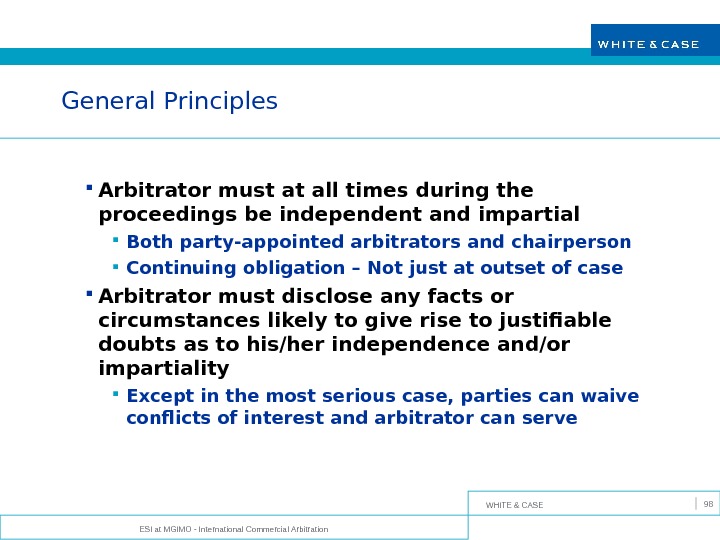
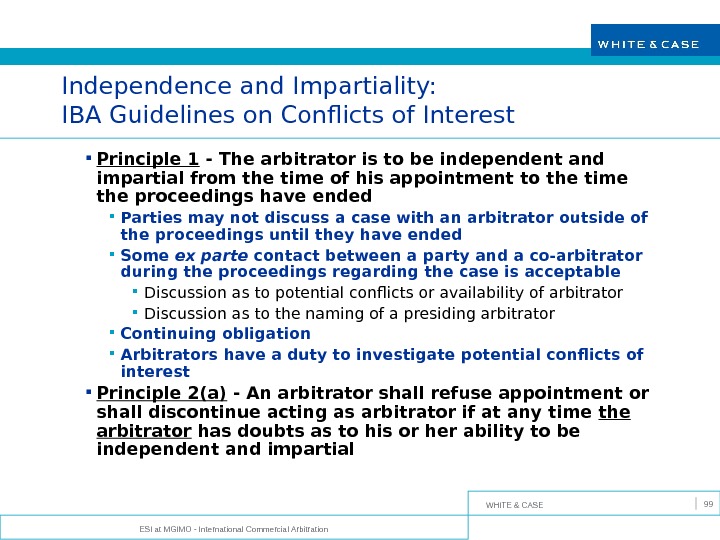
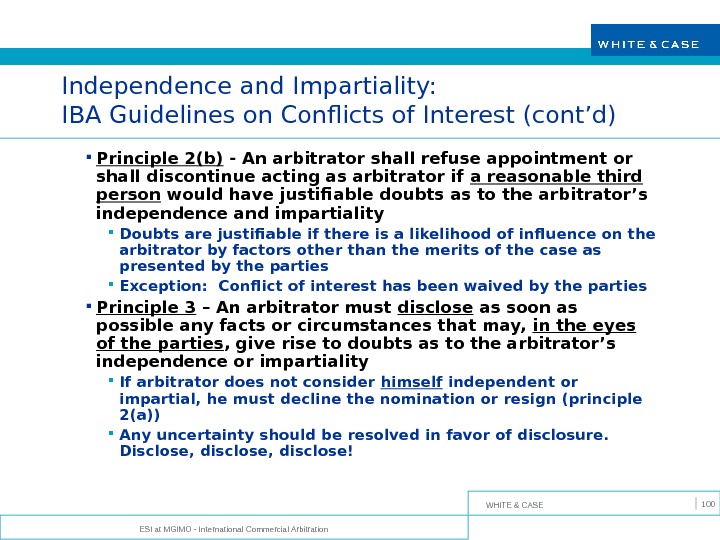
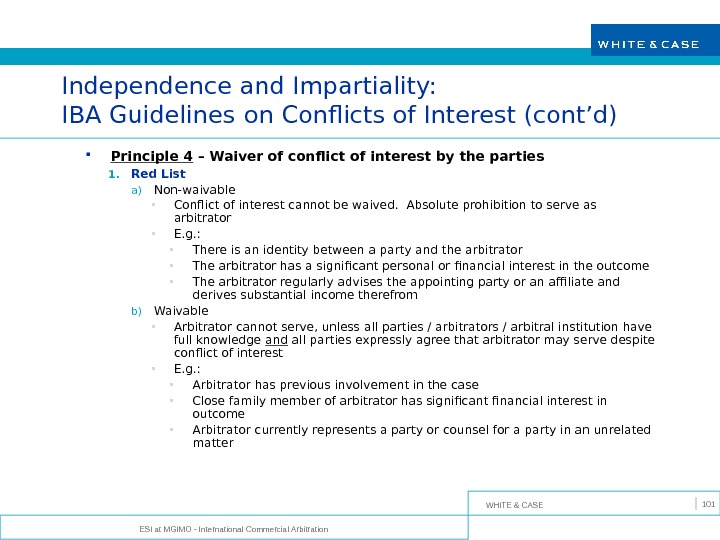
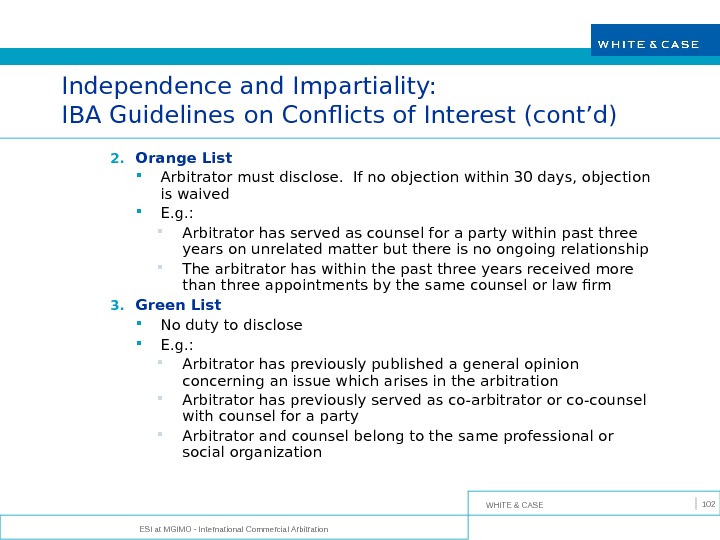
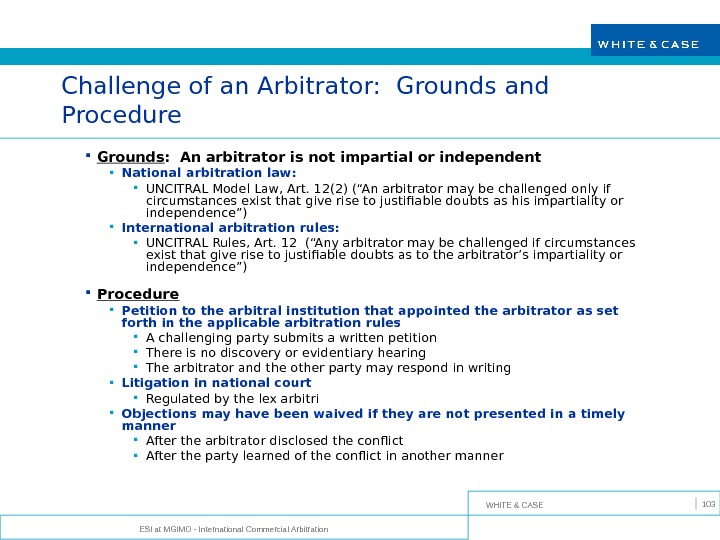
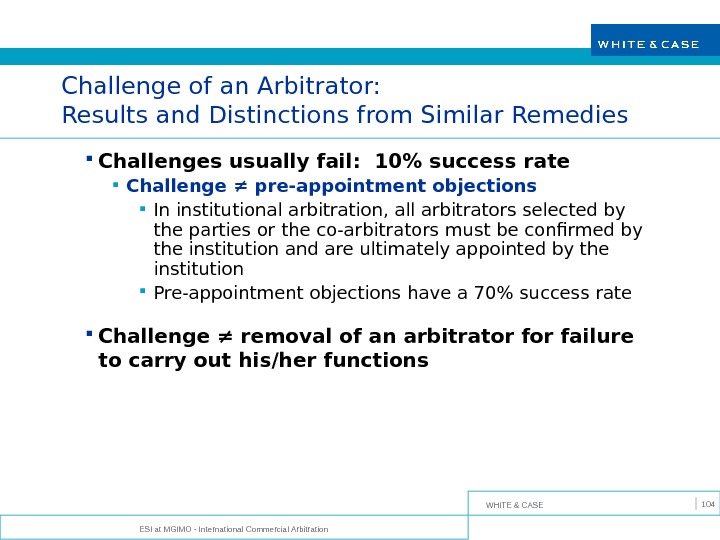
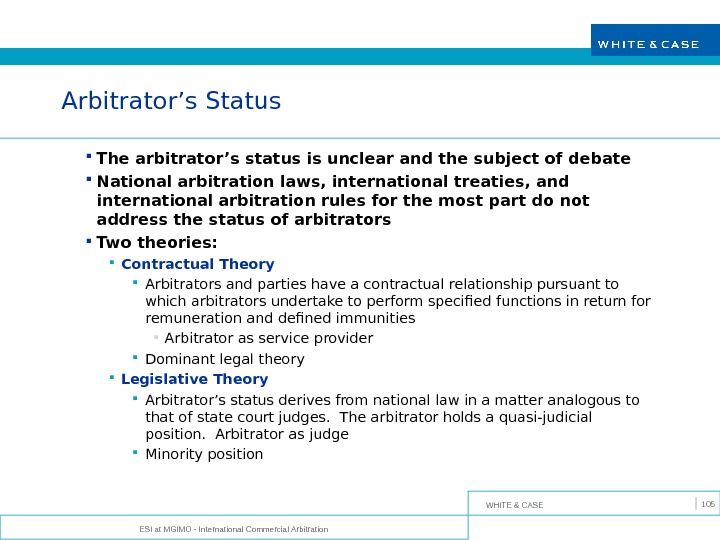
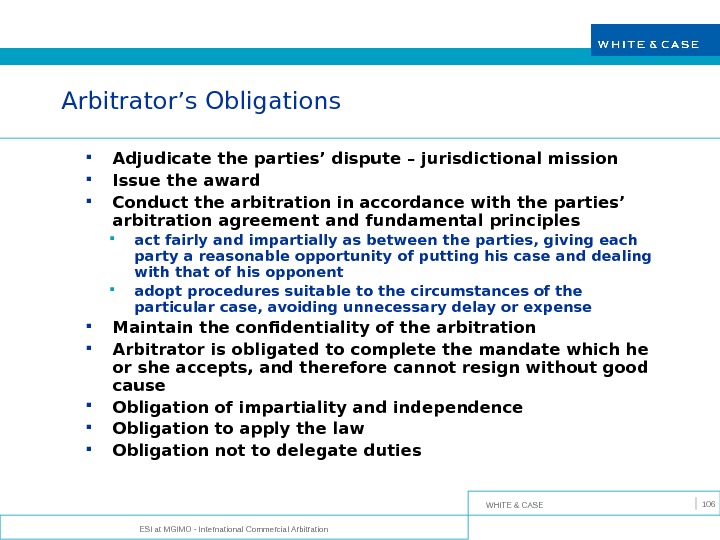
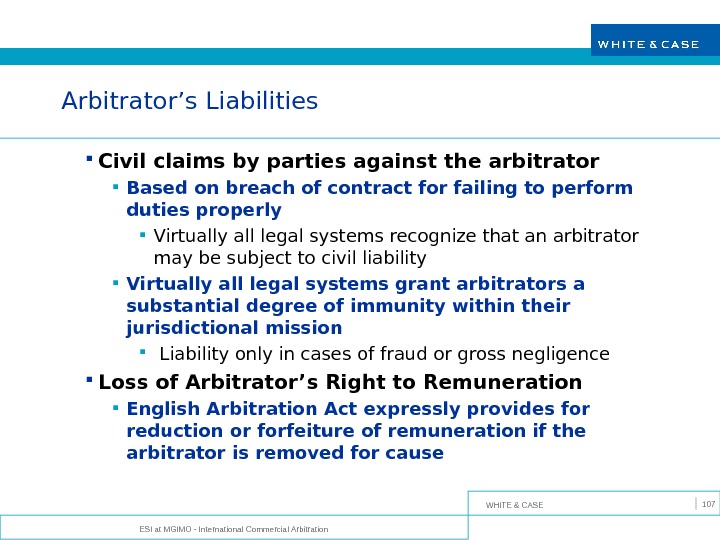
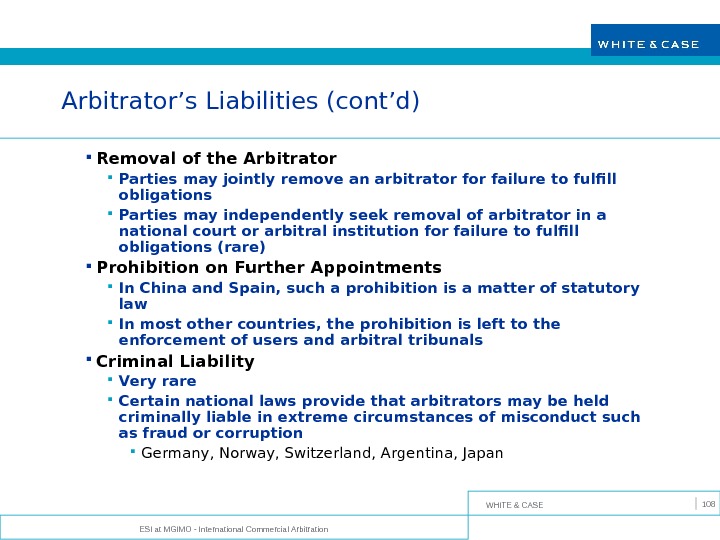
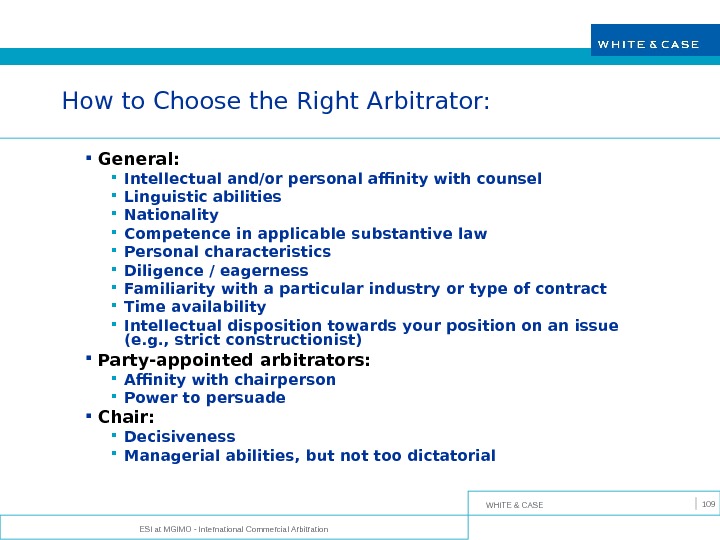
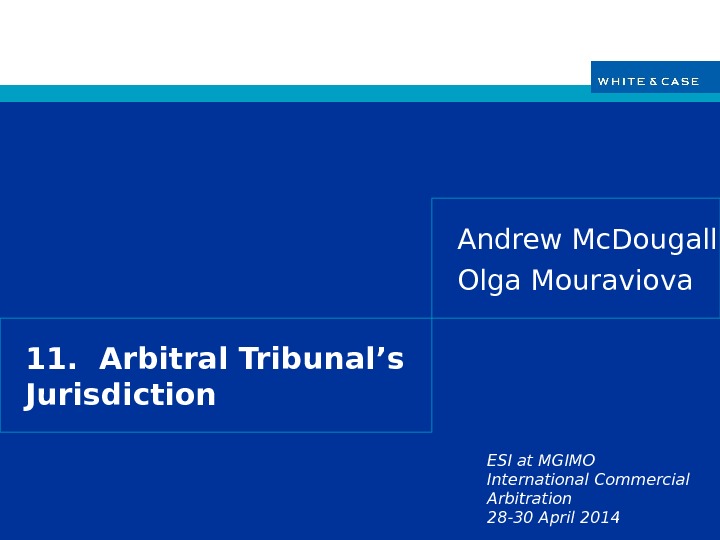
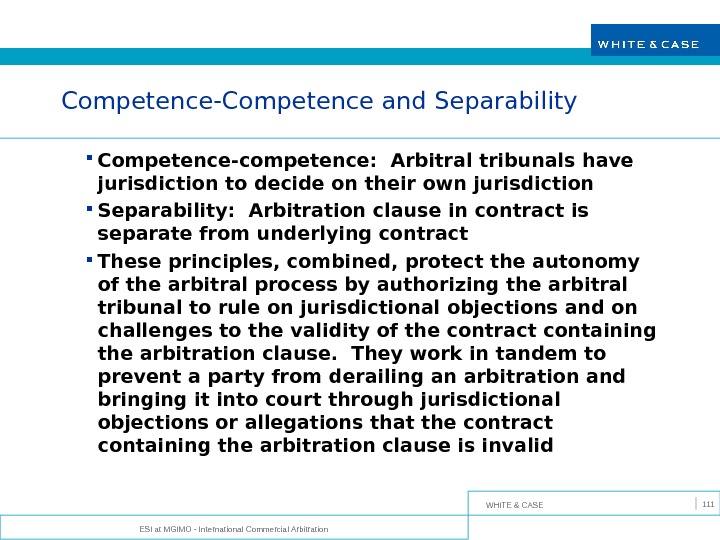
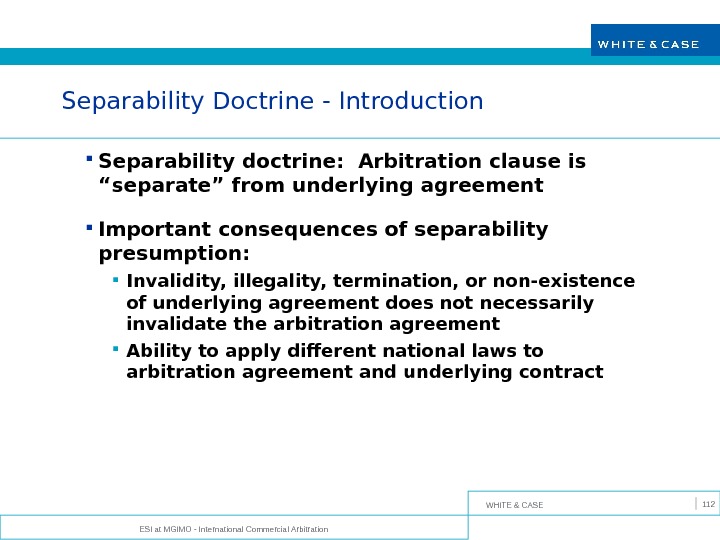
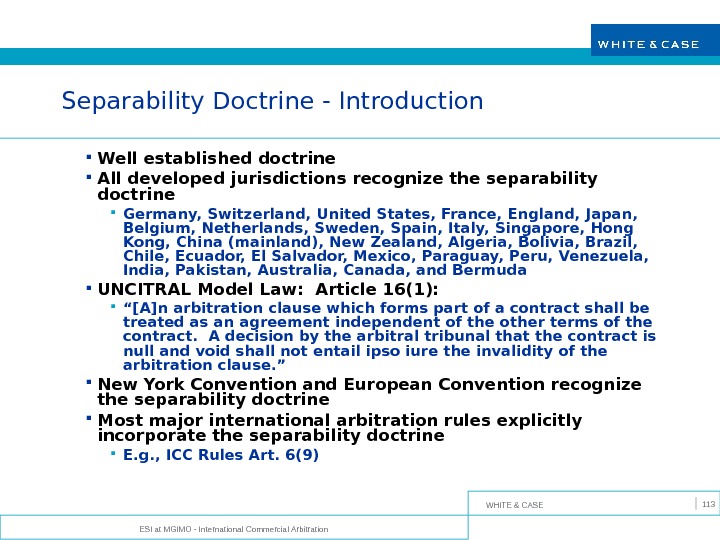
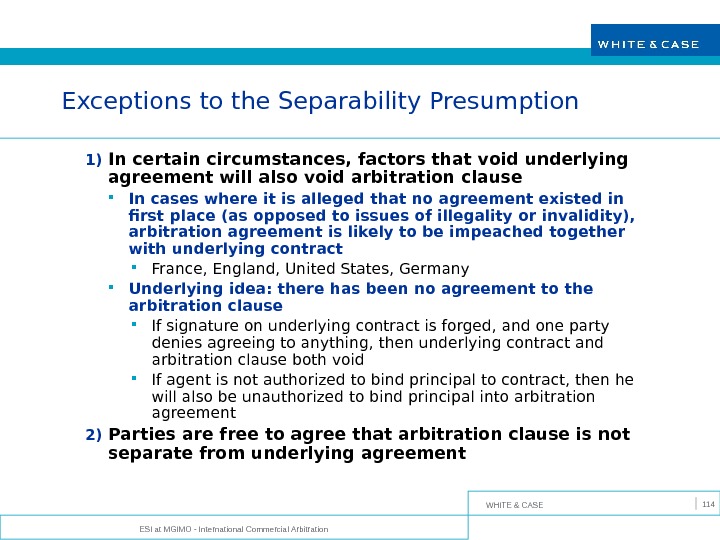
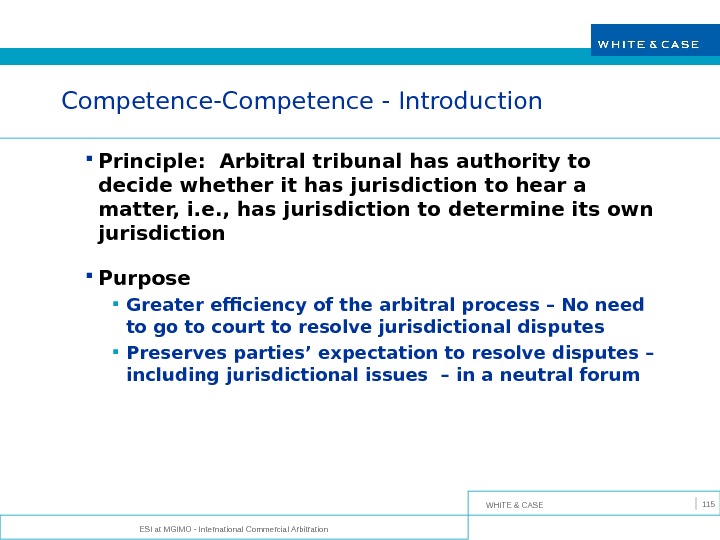
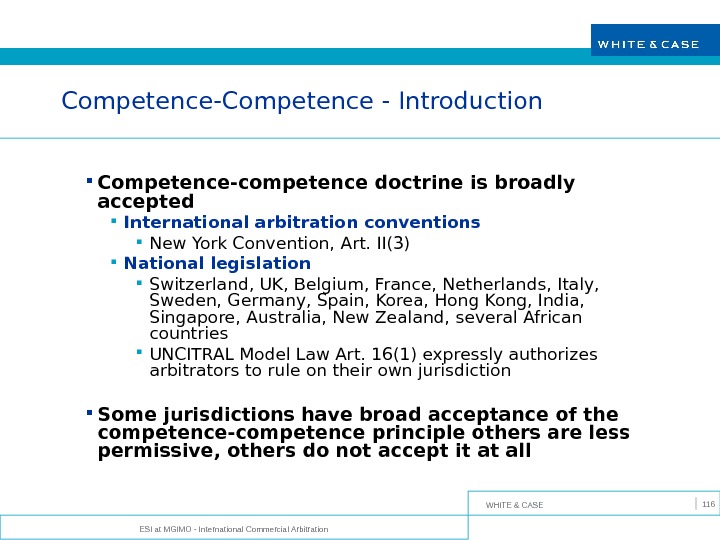
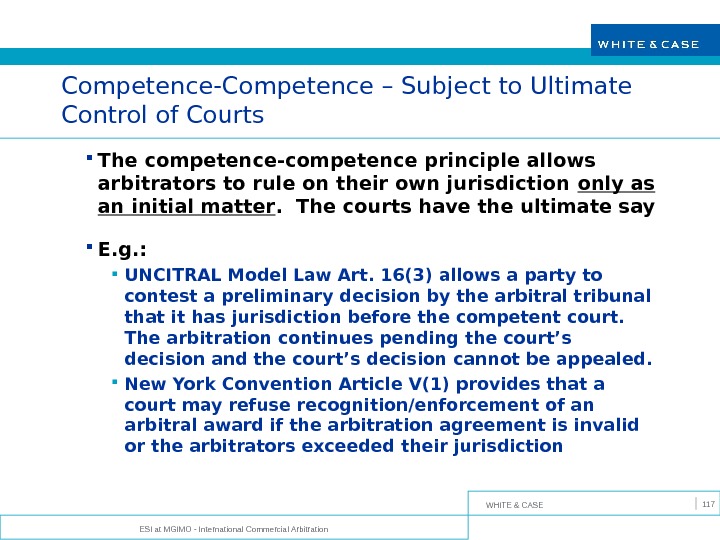
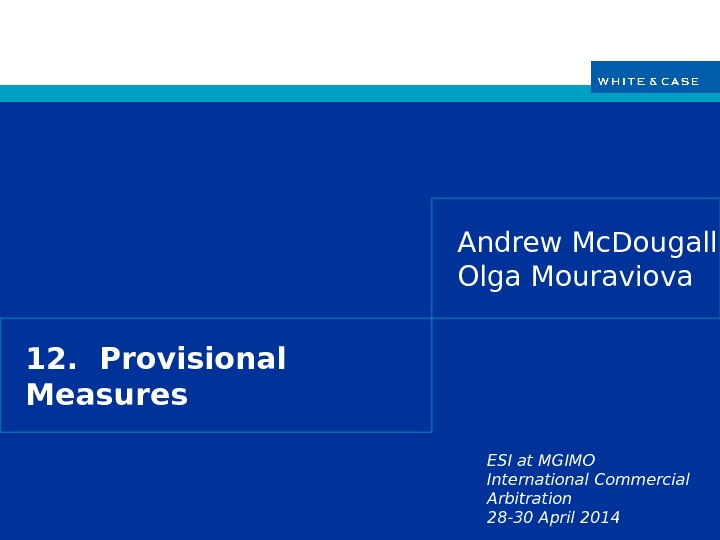
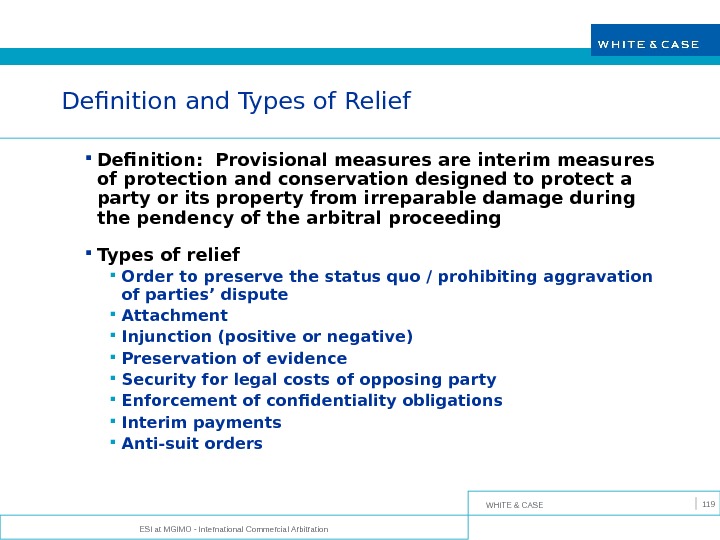
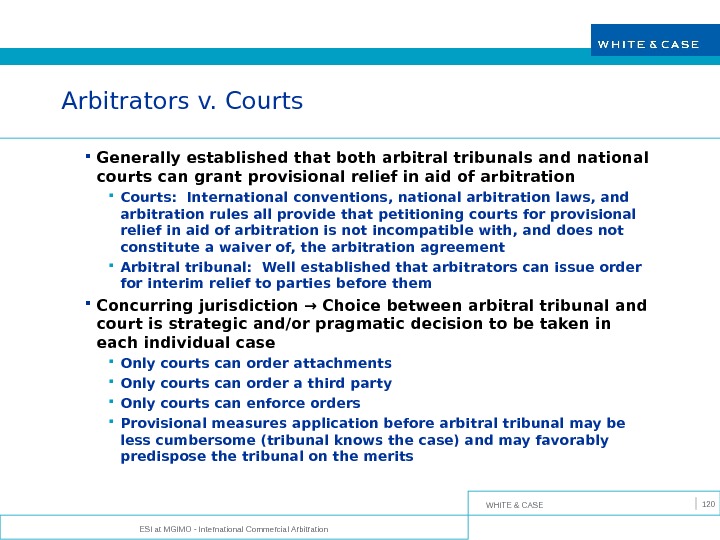
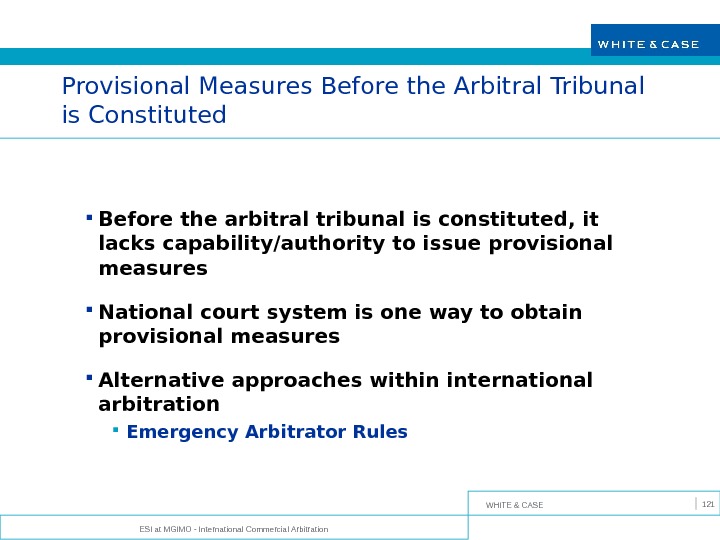
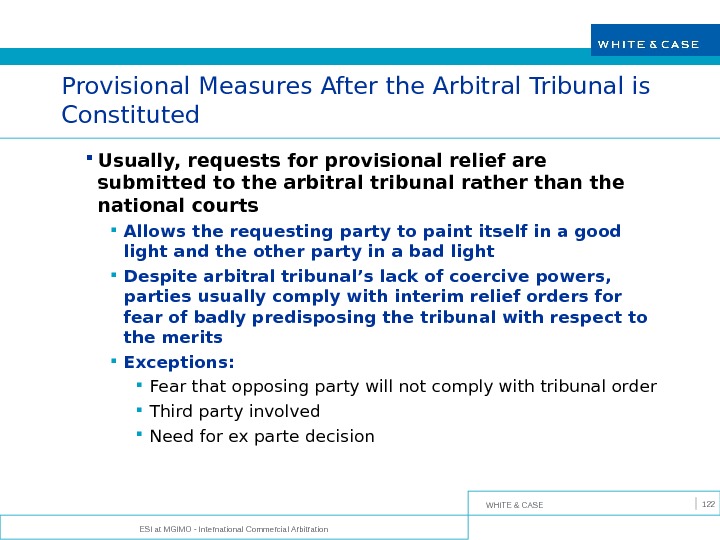
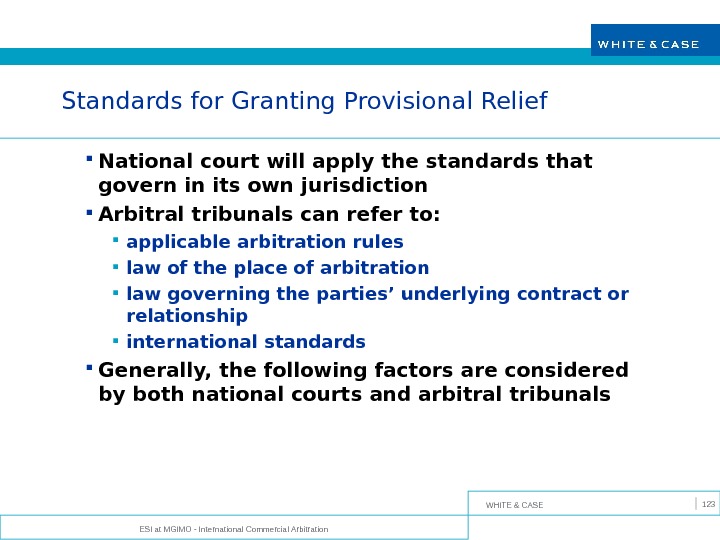
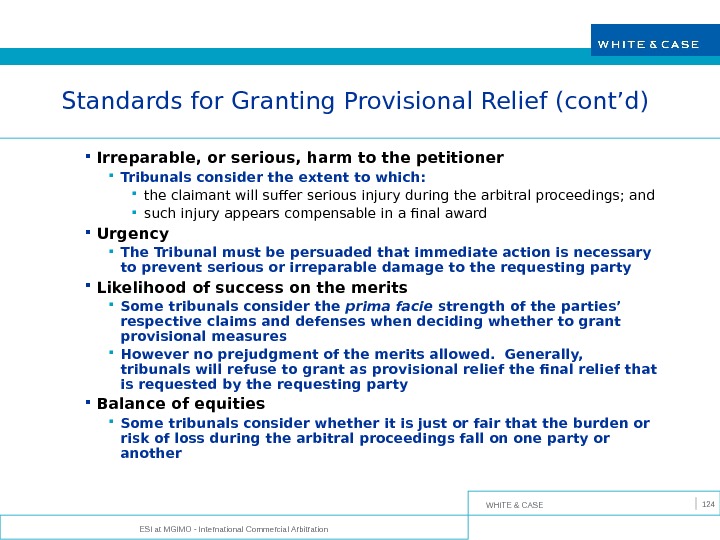
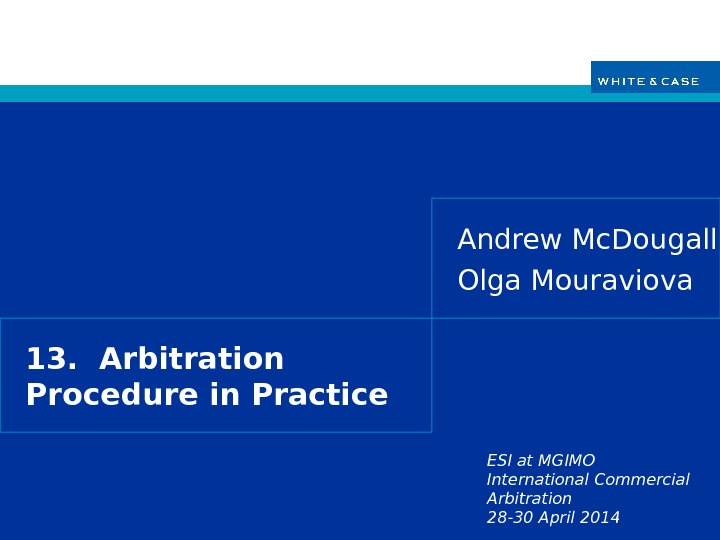
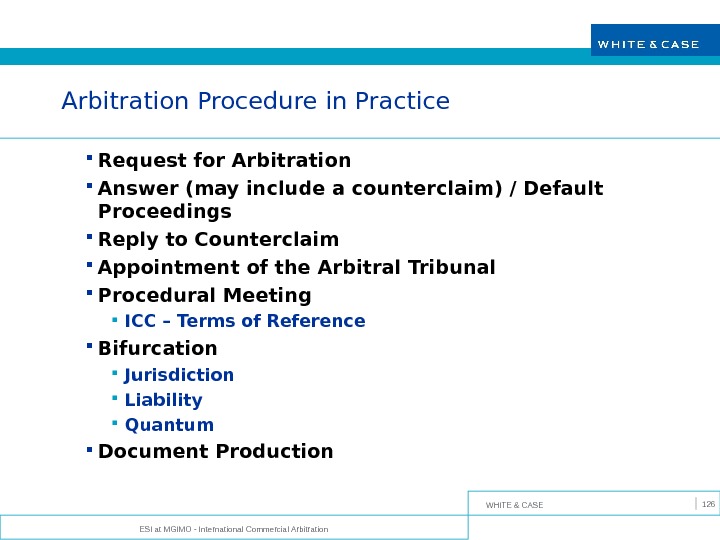
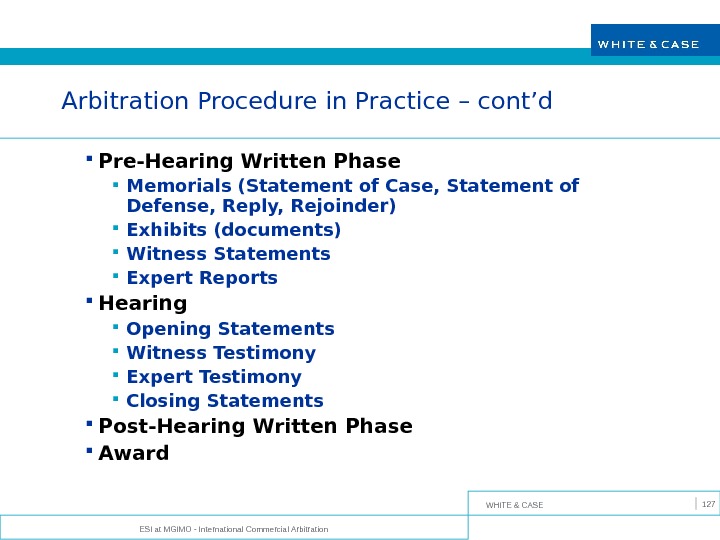

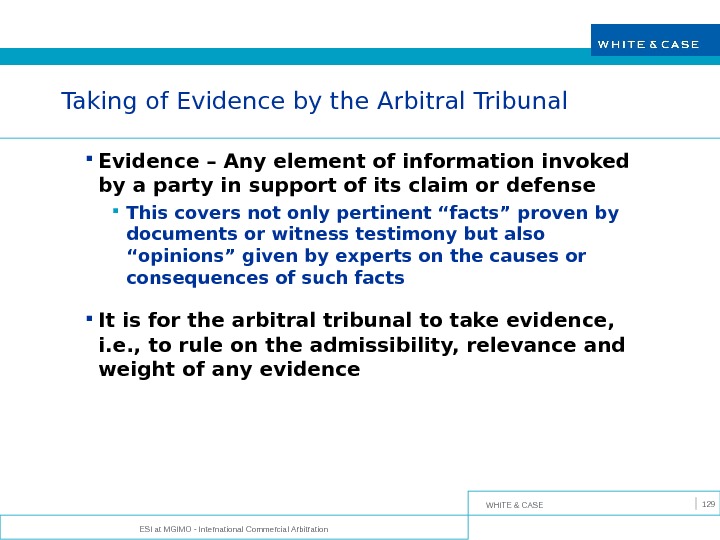
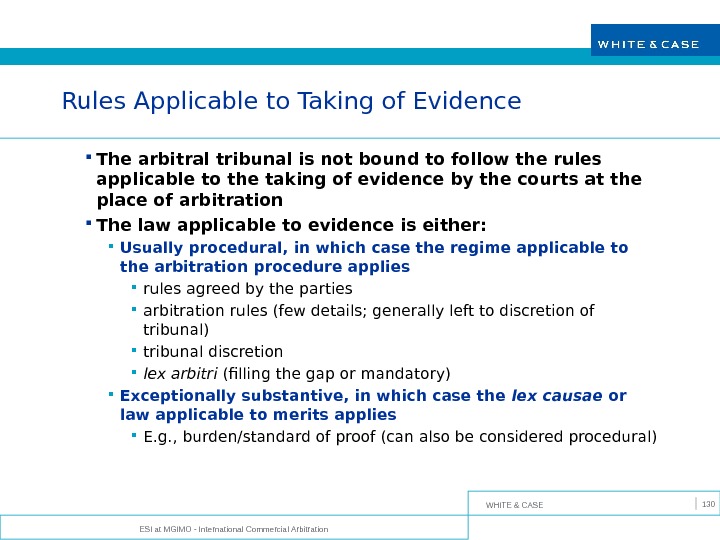
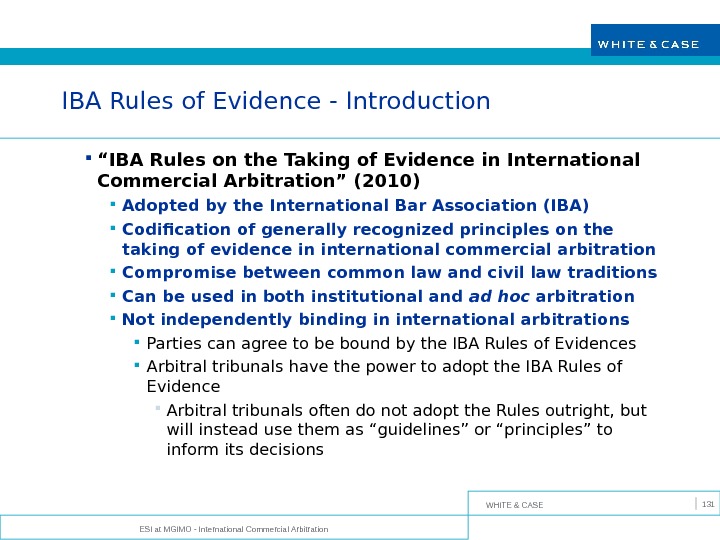
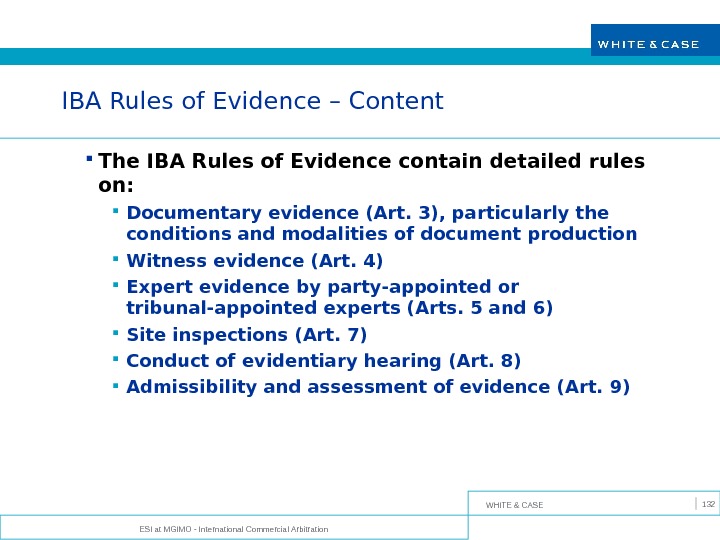
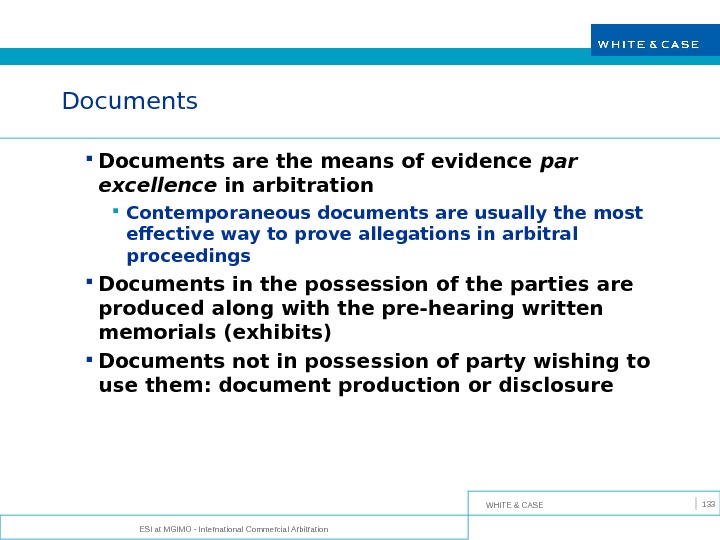
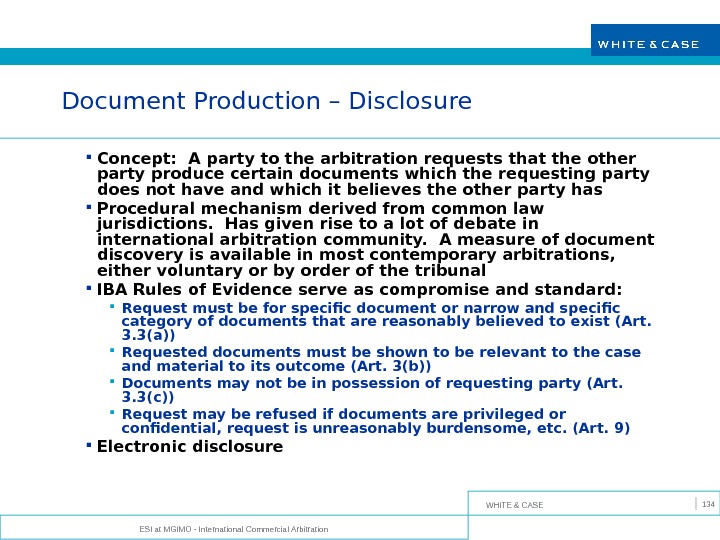
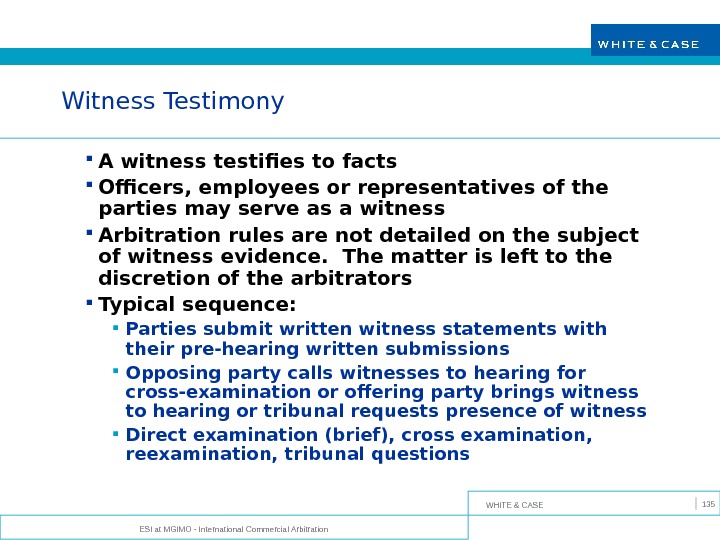
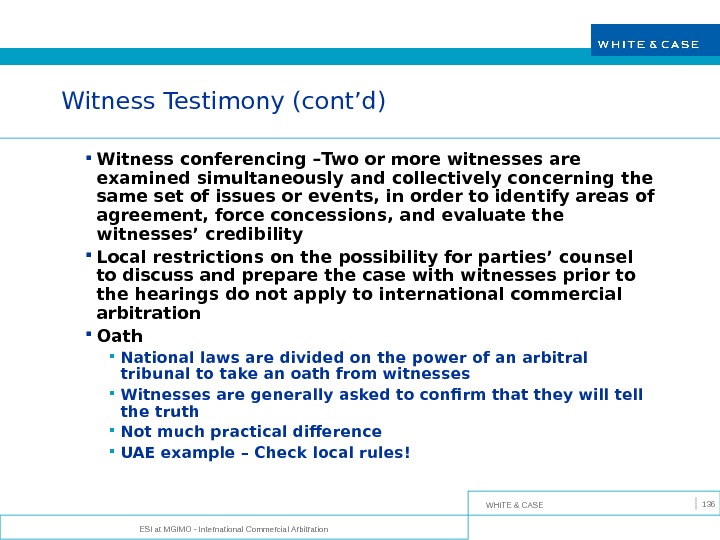
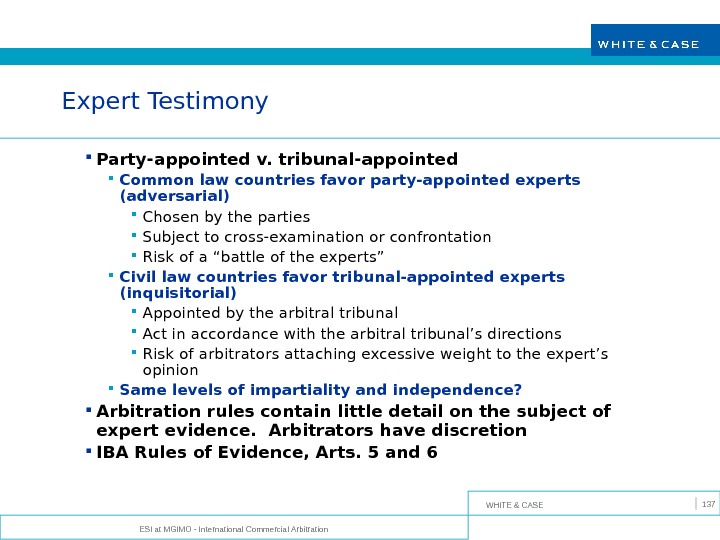
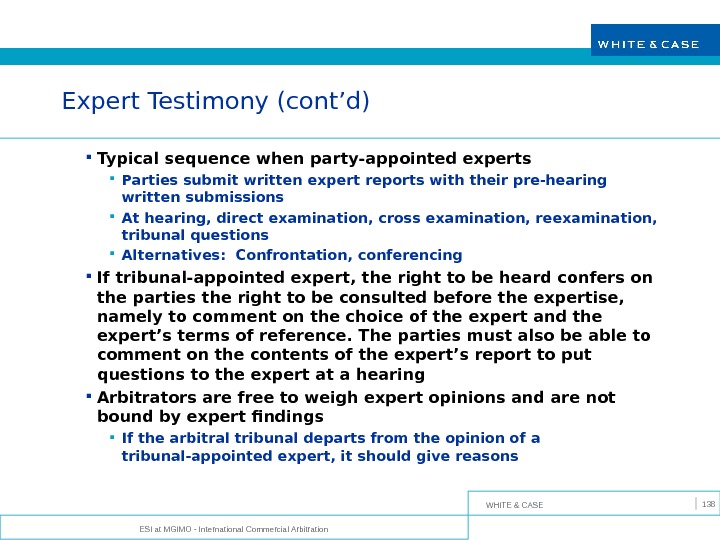
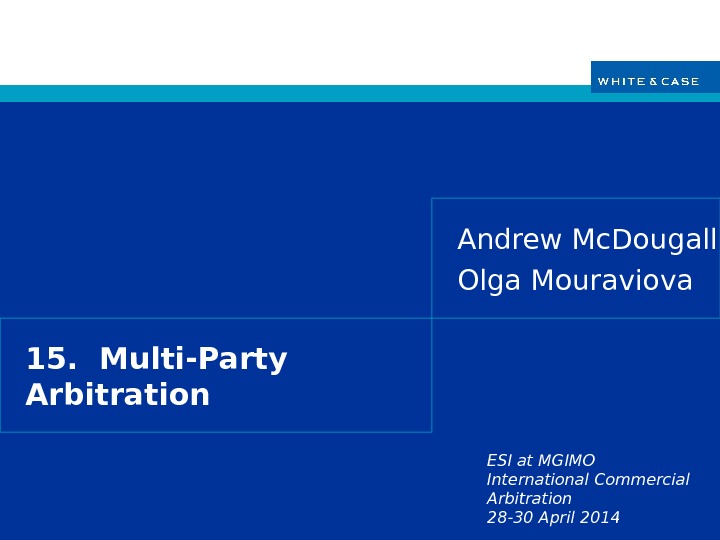
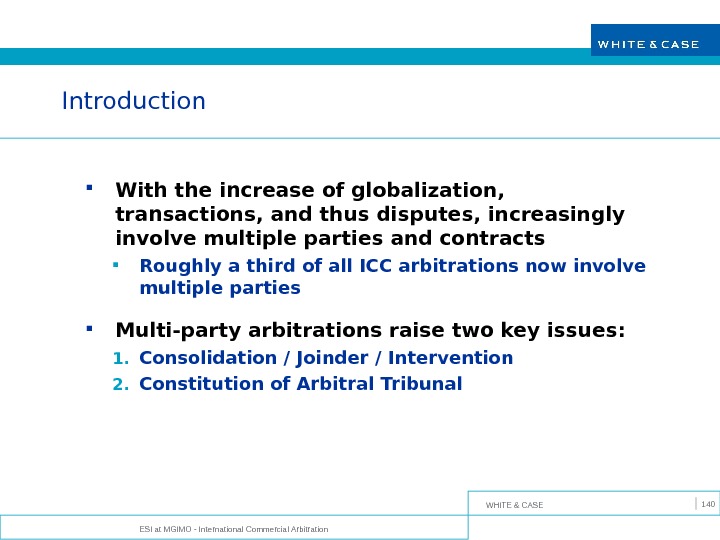
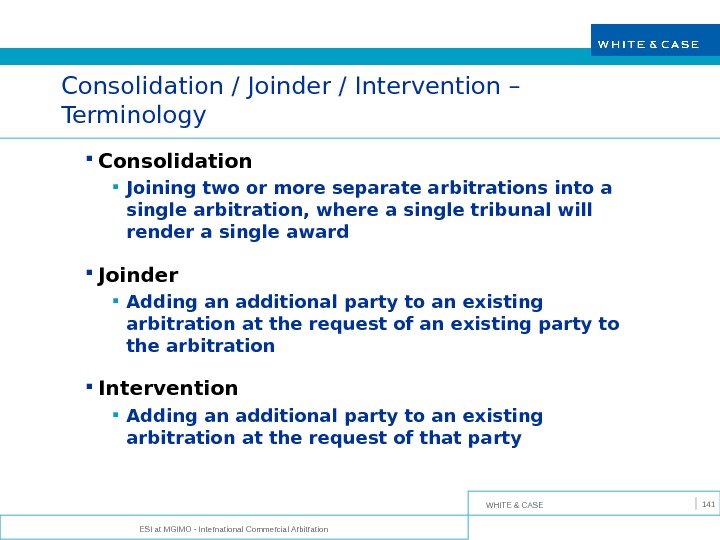
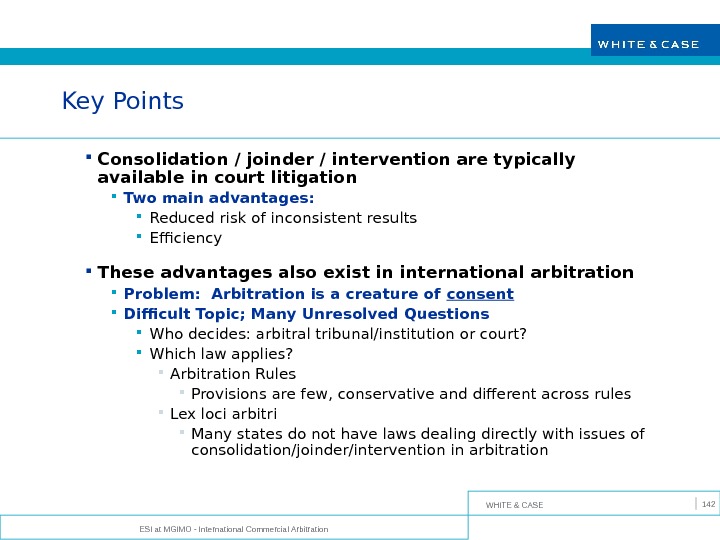
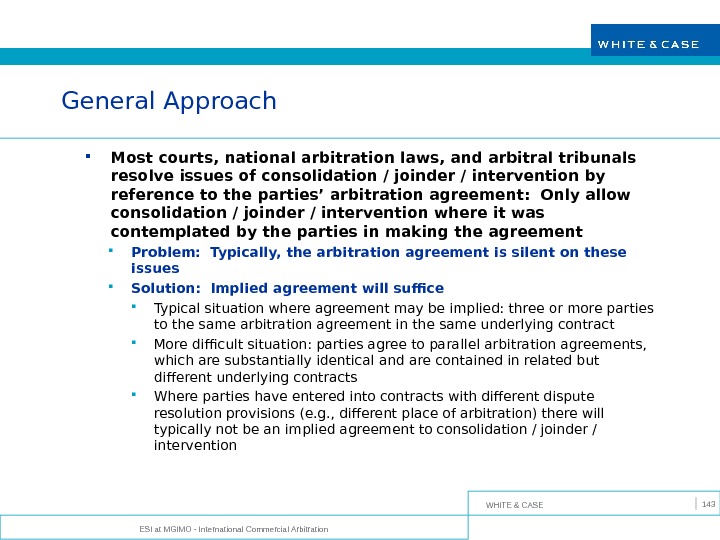
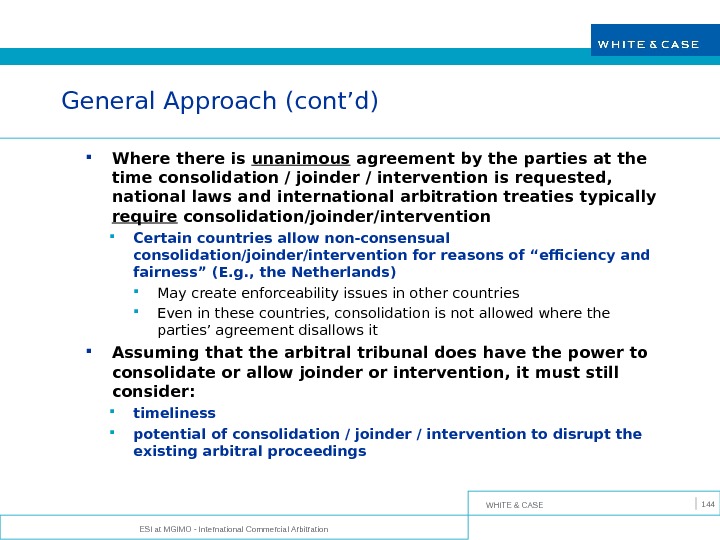
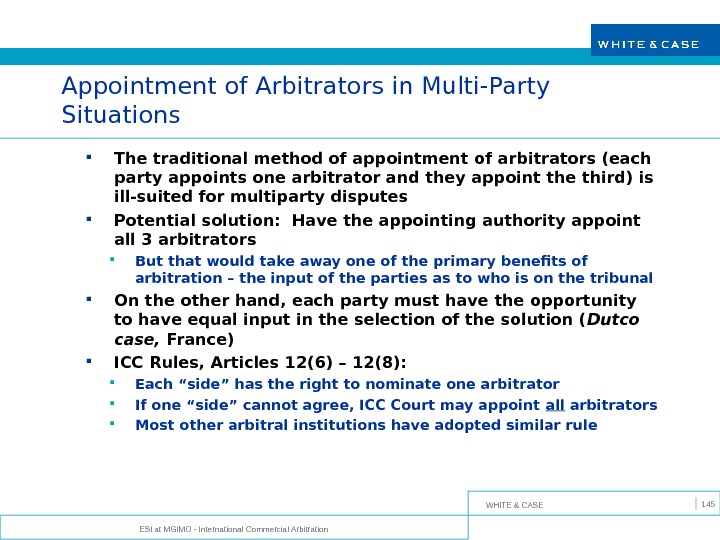

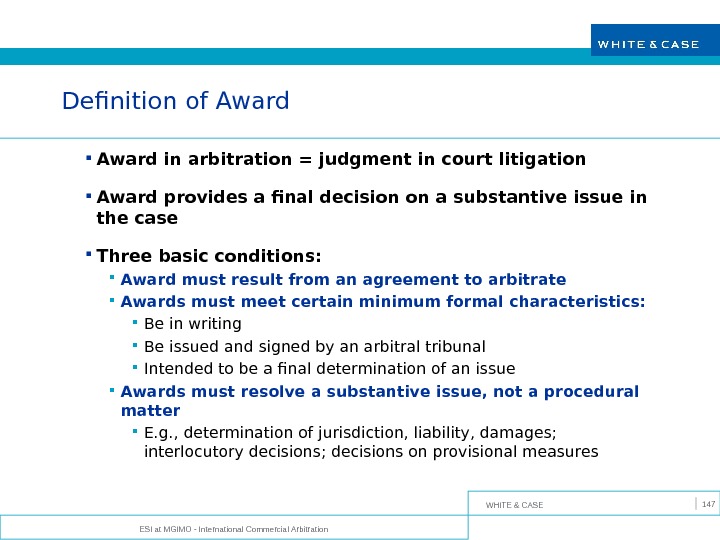
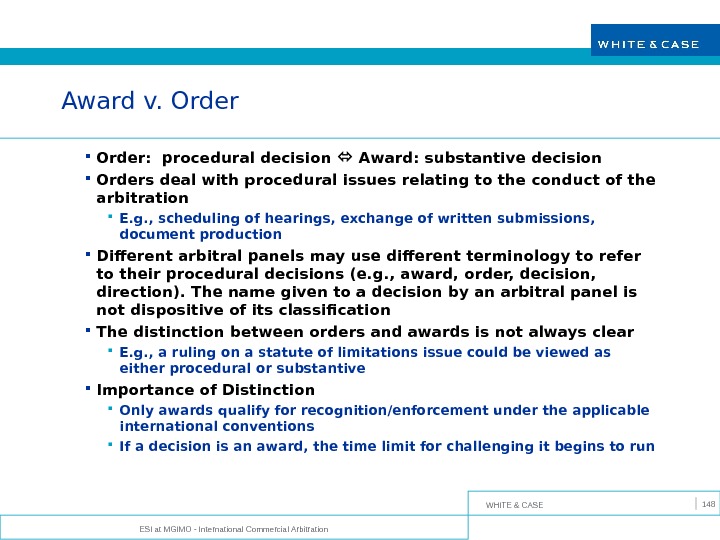
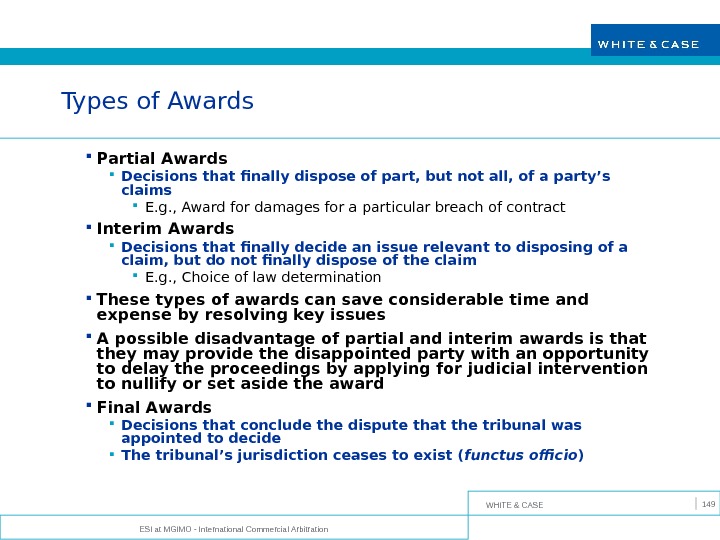
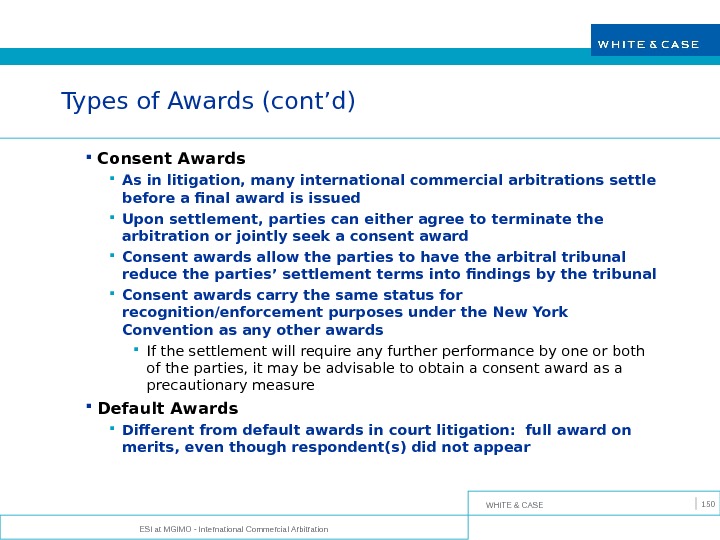
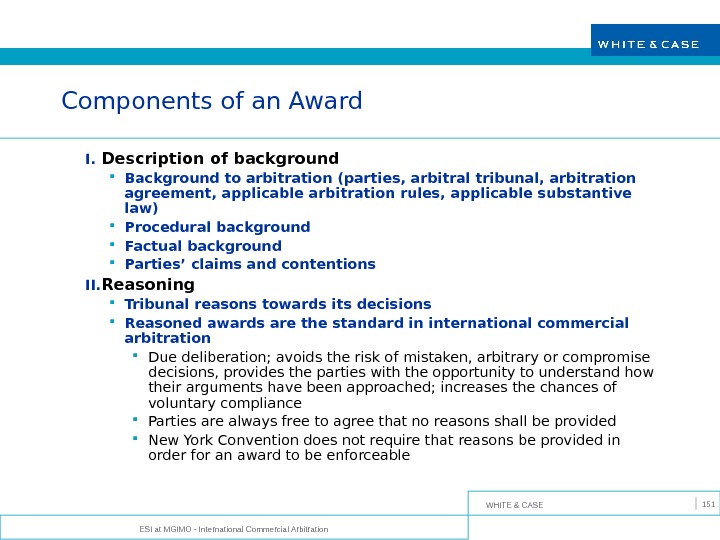
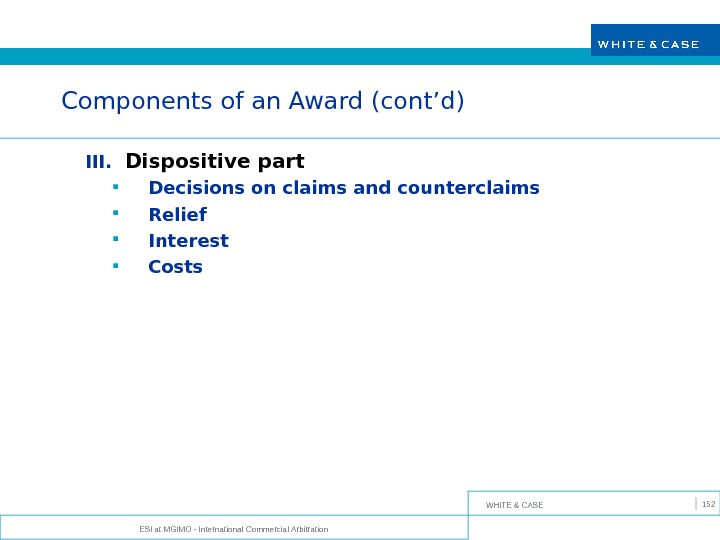
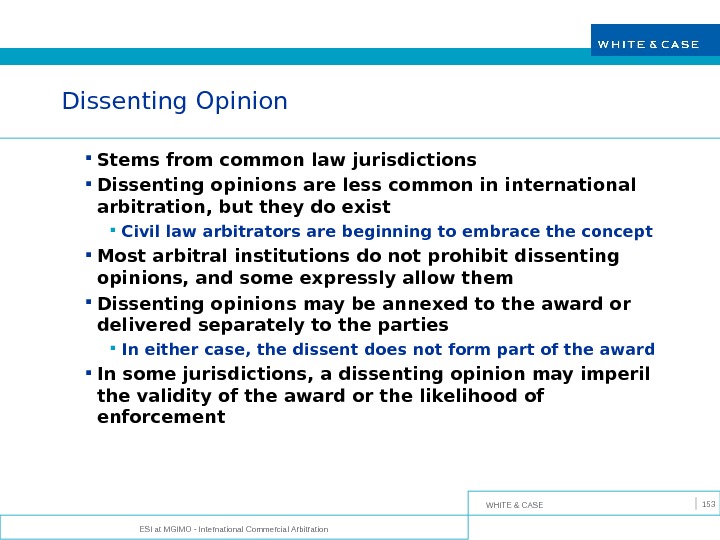
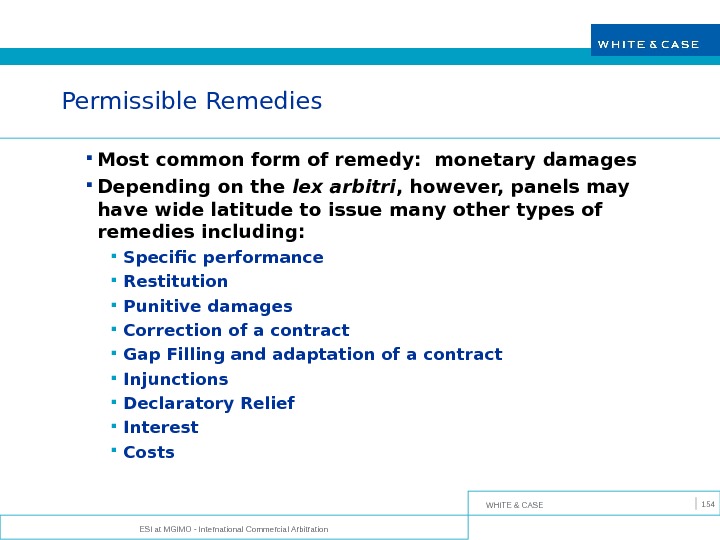
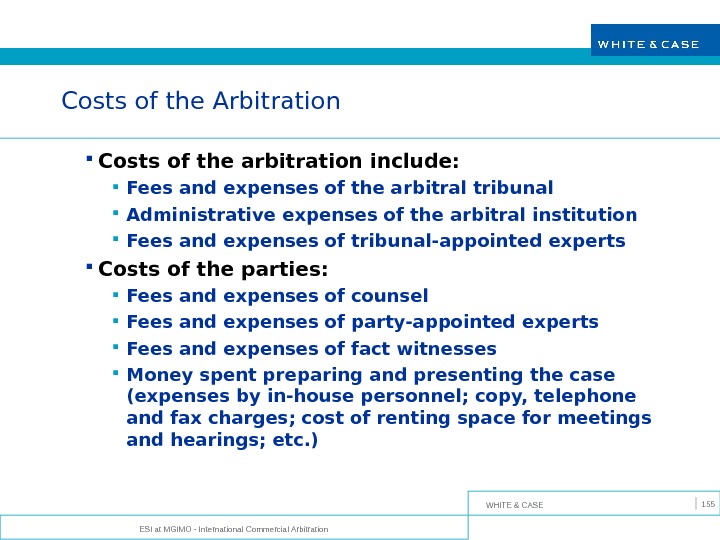
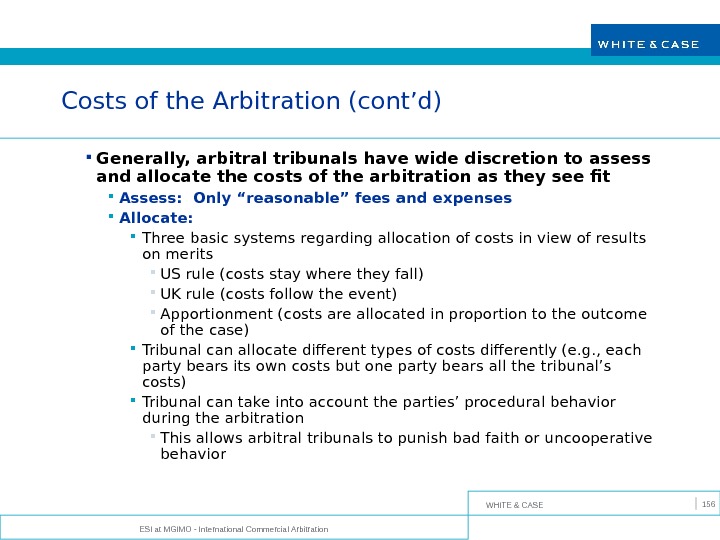
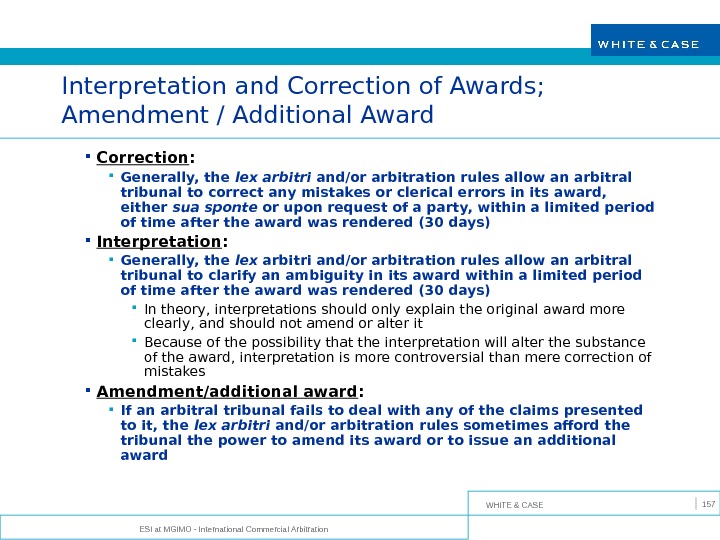

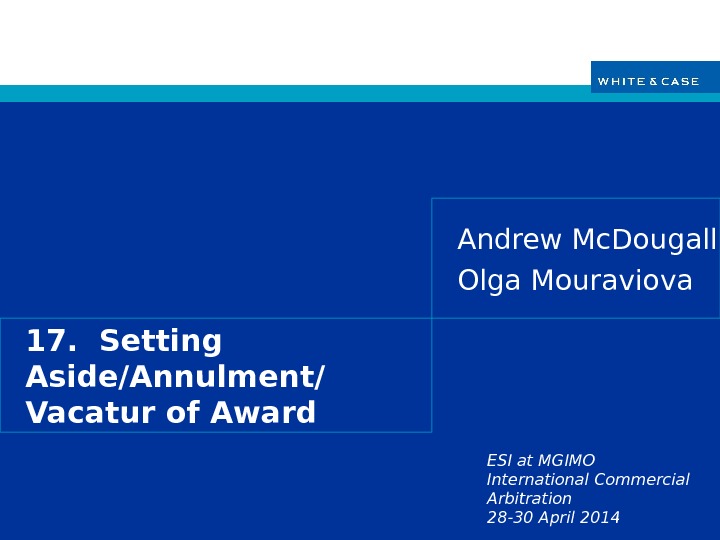
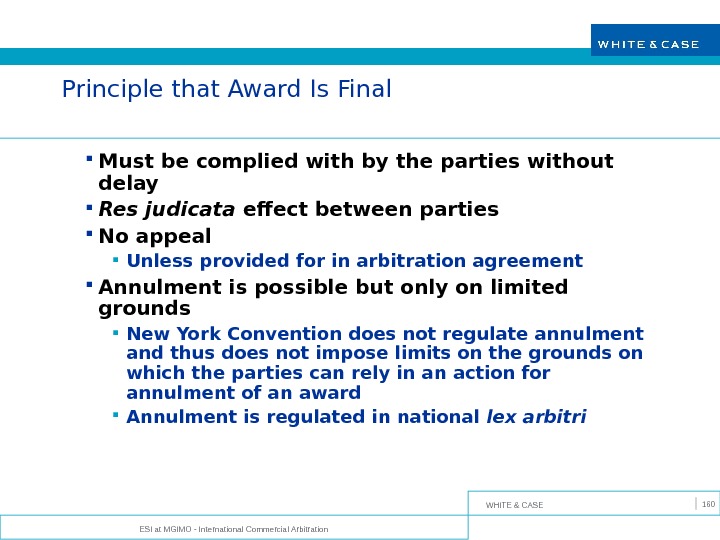
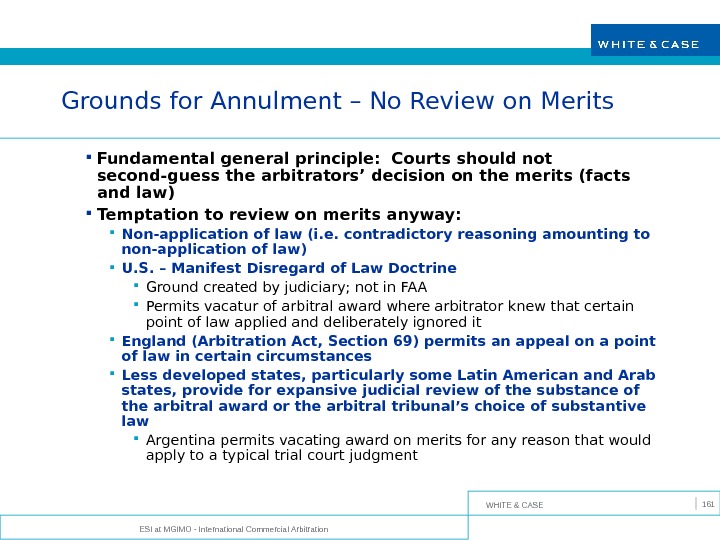
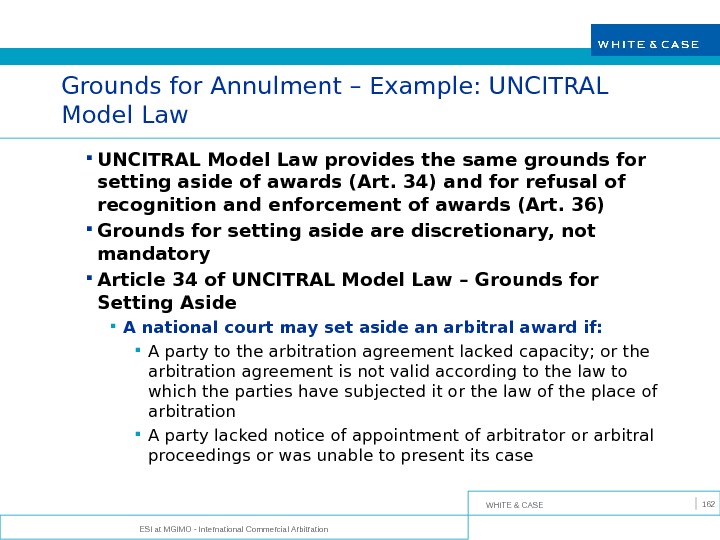
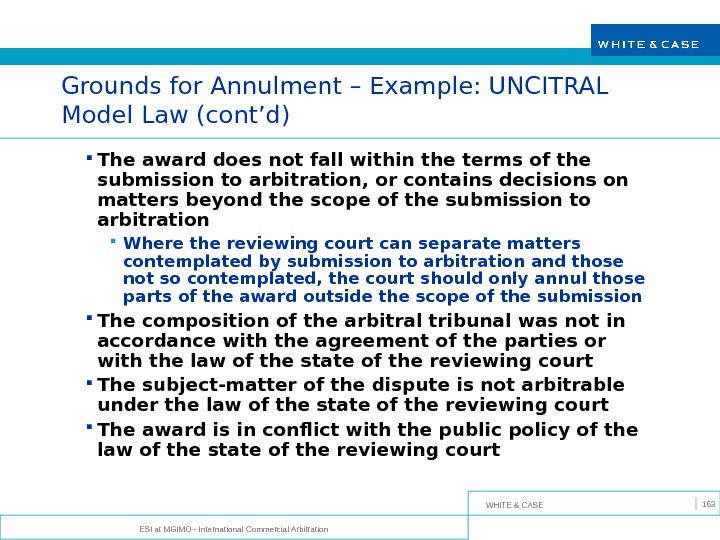

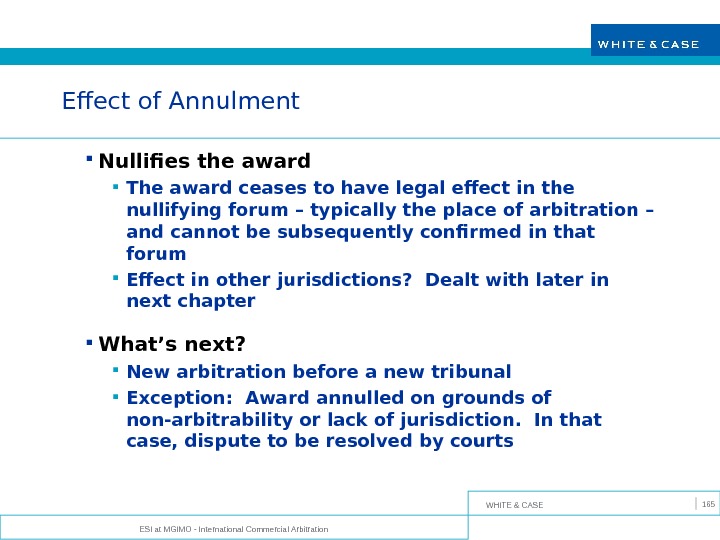
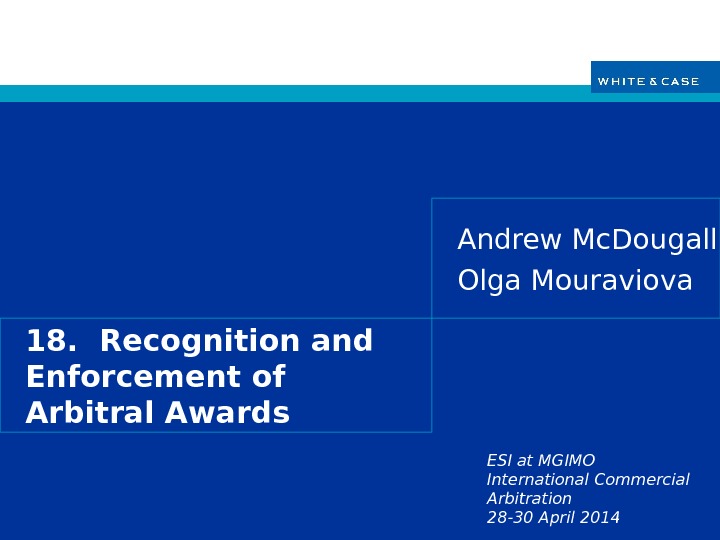
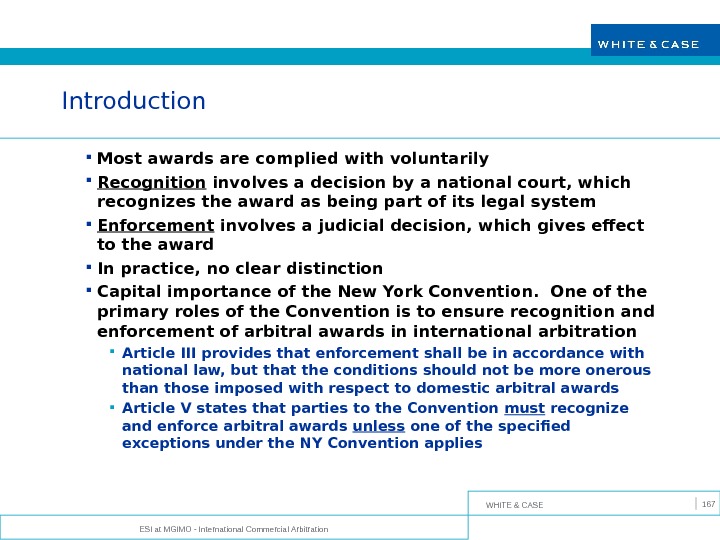
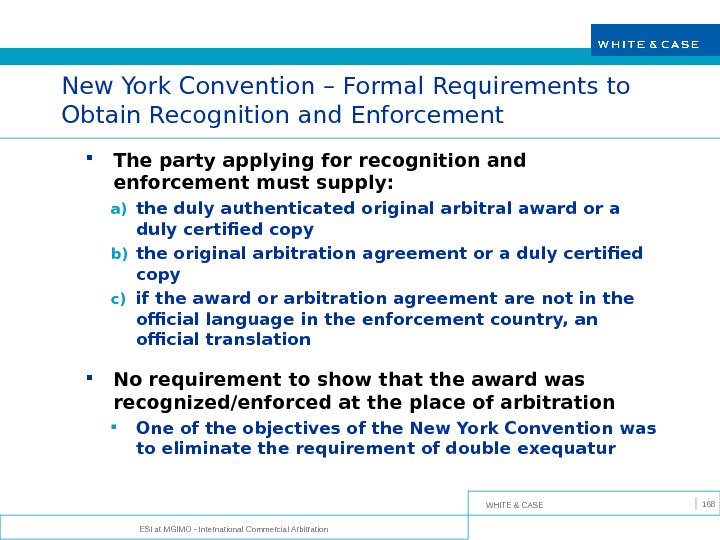
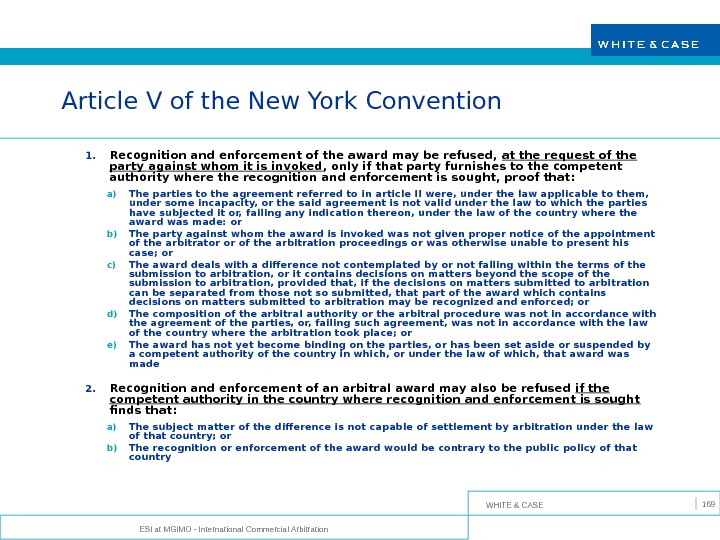
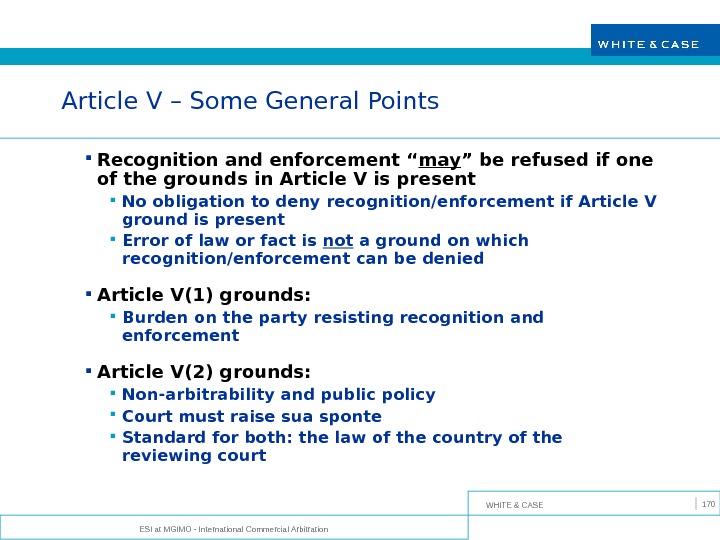
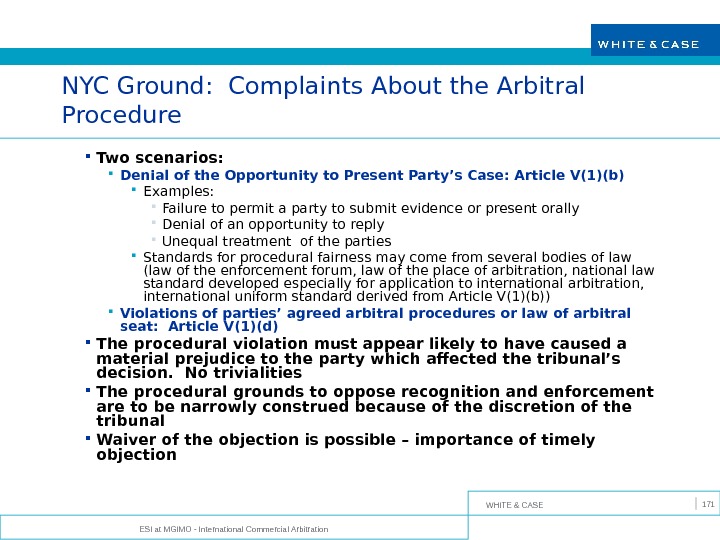
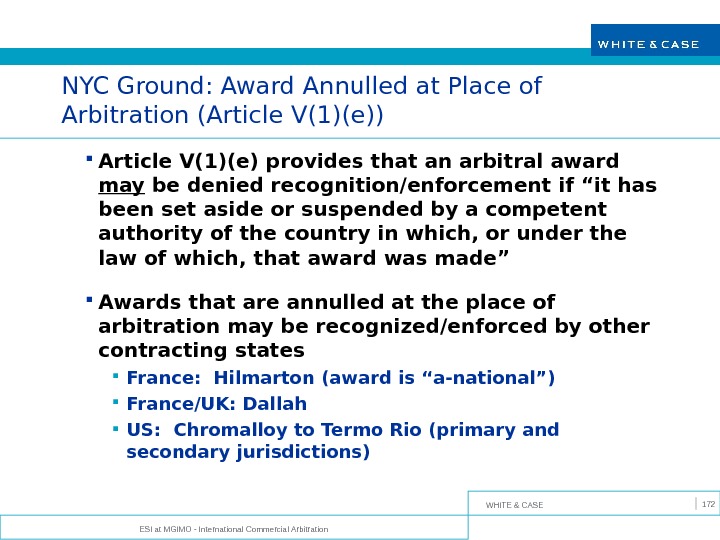
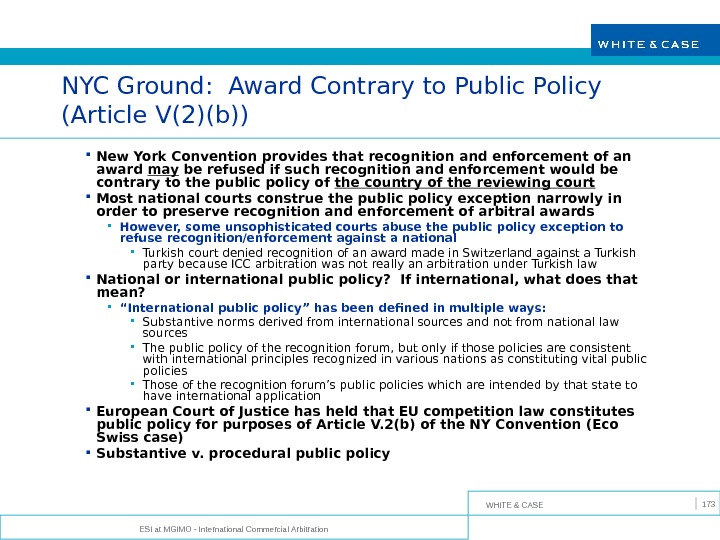

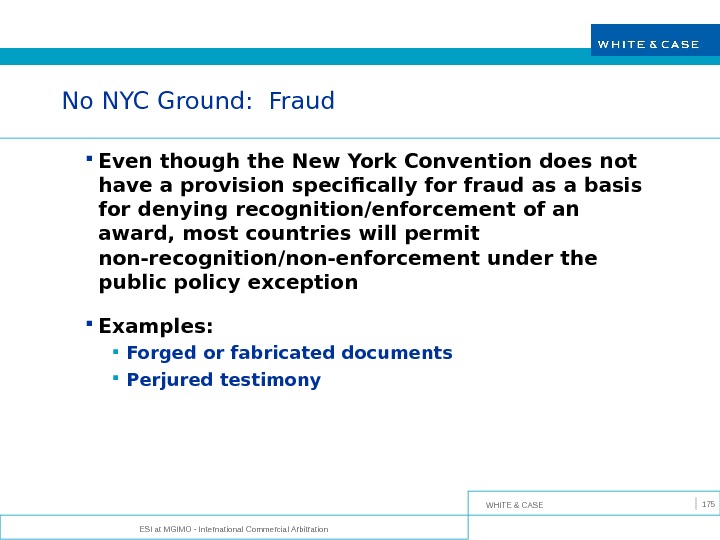
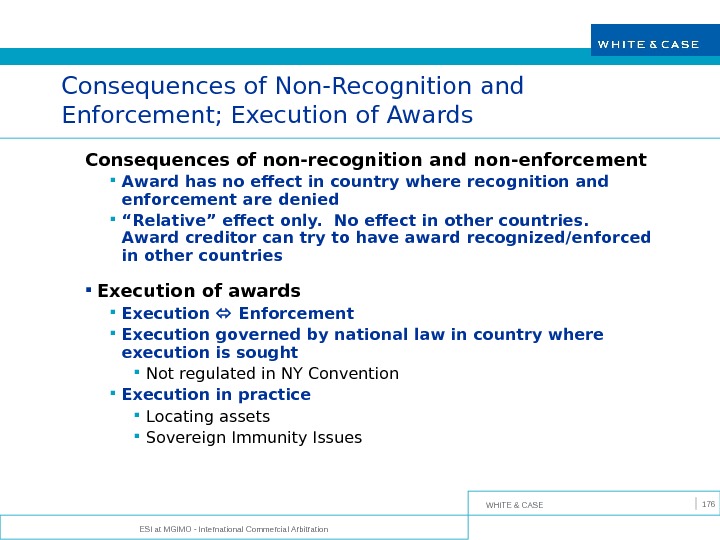

om_-_mgimo_presentation_-_april_2014.ppt
- Размер: 1.2 Mегабайта
- Количество слайдов: 177
Описание презентации ESI at MGIMO International Commercial Arbitration 28 -30 по слайдам
 ESI at MGIMO International Commercial Arbitration 28 -30 April 2014 European Studies Institute – MGIMO International Commercial Arbitration Andrew Mc. Dougall Olga Mouraviova
ESI at MGIMO International Commercial Arbitration 28 -30 April 2014 European Studies Institute – MGIMO International Commercial Arbitration Andrew Mc. Dougall Olga Mouraviova
 WHITE & CASE ESI at MGIMO — International Commercial Arbitration 2 Overview 1. What is International Commercial Arbitration? 2. Legal Sources of International Commercial Arbitration 3. Arbitrability 4. Institutional v. Ad Hoc Arbitration 5. Arbitration Agreements 6. Rules Applicable to the Arbitration Procedure 7. Place / Seat of Arbitration 8. Law Applicable to the Merits of the Dispute 9. Language of the Arbitration 10. The Arbitral Tribunal 11. The Arbitral Tribunal’s Jurisdiction 12. Provisional Measures 13. Arbitration Procedure in Practice 14. Evidence 15. Multi-Party Arbitration 16. Awards 17. Setting Aside / Annulment of Awards 18. Recognition and Enforcement of Awards. Day 1 Day 2 Day
WHITE & CASE ESI at MGIMO — International Commercial Arbitration 2 Overview 1. What is International Commercial Arbitration? 2. Legal Sources of International Commercial Arbitration 3. Arbitrability 4. Institutional v. Ad Hoc Arbitration 5. Arbitration Agreements 6. Rules Applicable to the Arbitration Procedure 7. Place / Seat of Arbitration 8. Law Applicable to the Merits of the Dispute 9. Language of the Arbitration 10. The Arbitral Tribunal 11. The Arbitral Tribunal’s Jurisdiction 12. Provisional Measures 13. Arbitration Procedure in Practice 14. Evidence 15. Multi-Party Arbitration 16. Awards 17. Setting Aside / Annulment of Awards 18. Recognition and Enforcement of Awards. Day 1 Day 2 Day
 ESI at MGIMO International Commercial Arbitration 28 -30 April 20141. What is International Commercial Arbitration? Andrew Mc. Dougall Olga Mouraviova
ESI at MGIMO International Commercial Arbitration 28 -30 April 20141. What is International Commercial Arbitration? Andrew Mc. Dougall Olga Mouraviova
 WHITE & CASE ESI at MGIMO — International Commercial Arbitration 4 A. “Arbitration” Arbitration is a private method of dispute resolution, supported by national laws and international treaties, whereby one or more third person(s) (arbitrator(s)) who derives their powers from the parties’ arbitration agreement resolve disputes through final and binding decisions
WHITE & CASE ESI at MGIMO — International Commercial Arbitration 4 A. “Arbitration” Arbitration is a private method of dispute resolution, supported by national laws and international treaties, whereby one or more third person(s) (arbitrator(s)) who derives their powers from the parties’ arbitration agreement resolve disputes through final and binding decisions
 WHITE & CASE ESI at MGIMO — International Commercial Arbitration 5 Arbitration v. Litigation In both, a third party decides the parties’ dispute in a final and binding manner. But. . . Arbitration = private, state- supported dispute resolution method Litigation = public, state- organized dispute resolution method Most differences between arbitration and litigation stem from this basic distinction Myth: International commercial arbitration is not faster and cheaper than transnational commercial litigation
WHITE & CASE ESI at MGIMO — International Commercial Arbitration 5 Arbitration v. Litigation In both, a third party decides the parties’ dispute in a final and binding manner. But. . . Arbitration = private, state- supported dispute resolution method Litigation = public, state- organized dispute resolution method Most differences between arbitration and litigation stem from this basic distinction Myth: International commercial arbitration is not faster and cheaper than transnational commercial litigation
 WHITE & CASE ESI at MGIMO — International Commercial Arbitration 6 Arbitration v. Litigation (cont’d) Litigation Pros : — Procedural certainty — Summary disposition — Courts have coercive powers — May be more effective when a party is recalcitrant Cons : — Limits on international enforceability (tribunal, procedure, place, language) — Lack of neutrality — Expensive in the US — Time consuming – long time to decision — No confidentiality — Judges and juries lack technical expertise Arbitration Pros : — International enforceability of awards (NY Convention) — Neutrality (tribunal, procedure, place, language) — Privacy — Procedural flexibility — Right to choose own judges (specialized knowledge) Cons : — Arbitrators’ lack of coercive powers (im perium) — Award cannot be corrected for errors of fact or law — Higher risk of jurisdictional disputes — Difficulty to have summary proceedings — Costly compared to litigation in civil law countries — When recalcitrant party, difficulty in constituting tribunal and/or organizing the arbitration — Difficulty in dealings with multi-party and multi-contract disputes
WHITE & CASE ESI at MGIMO — International Commercial Arbitration 6 Arbitration v. Litigation (cont’d) Litigation Pros : — Procedural certainty — Summary disposition — Courts have coercive powers — May be more effective when a party is recalcitrant Cons : — Limits on international enforceability (tribunal, procedure, place, language) — Lack of neutrality — Expensive in the US — Time consuming – long time to decision — No confidentiality — Judges and juries lack technical expertise Arbitration Pros : — International enforceability of awards (NY Convention) — Neutrality (tribunal, procedure, place, language) — Privacy — Procedural flexibility — Right to choose own judges (specialized knowledge) Cons : — Arbitrators’ lack of coercive powers (im perium) — Award cannot be corrected for errors of fact or law — Higher risk of jurisdictional disputes — Difficulty to have summary proceedings — Costly compared to litigation in civil law countries — When recalcitrant party, difficulty in constituting tribunal and/or organizing the arbitration — Difficulty in dealings with multi-party and multi-contract disputes
 WHITE & CASE ESI at MGIMO — International Commercial Arbitration 7 Arbitration v. ADR = Alternative Dispute Resolution Several forms: Mediation / conciliation, mini-trial, baseball arbitration, etc. These techniques complement, rather than compete with, arbitration Mediation is the most common ADR form in international business disputes Neutral third party helps parties reach an amicable agreement; mediator is not empowered to resolve disputes – this requires each party to “buy in” How Mediation is Similar to Arbitration Neutral third party Confidential How Mediation Differs from Arbitration Usually non-binding (unless parties agree otherwise) The parties, rather than the mediator, have the final say Less expensive and often faster Final result: settlement agreement (or not) v. award
WHITE & CASE ESI at MGIMO — International Commercial Arbitration 7 Arbitration v. ADR = Alternative Dispute Resolution Several forms: Mediation / conciliation, mini-trial, baseball arbitration, etc. These techniques complement, rather than compete with, arbitration Mediation is the most common ADR form in international business disputes Neutral third party helps parties reach an amicable agreement; mediator is not empowered to resolve disputes – this requires each party to “buy in” How Mediation is Similar to Arbitration Neutral third party Confidential How Mediation Differs from Arbitration Usually non-binding (unless parties agree otherwise) The parties, rather than the mediator, have the final say Less expensive and often faster Final result: settlement agreement (or not) v. award
 WHITE & CASE ESI at MGIMO — International Commercial Arbitration 8 Arbitration v. Expert Determination Often used in construction disputes (Dispute Board) and in post-M&A disputes (e. g. post-closing price adjustment) Expert (third party) renders a decision based on his/her technical expertise and investigation Various forms: final / not final, binding / not binding Many countries provide for some form(s) of expert determination Germany ( Schiedsgutachten ), France ( expertise amiable ), Belgium ( tierce décision – amiable ), Italy ( perizia contrattuale ), England ( valuation ) Final and binding expert decision is usually not directly enforceable by the courts If losing party chooses not to follow the decision, the winning party’s remedy is to sue for breach of contract Expert’s decision may also be subject of subsequent international arbitration. E. g. , whether expert committed a manifest error Unless expert’s decision is qualified as an arbitral award
WHITE & CASE ESI at MGIMO — International Commercial Arbitration 8 Arbitration v. Expert Determination Often used in construction disputes (Dispute Board) and in post-M&A disputes (e. g. post-closing price adjustment) Expert (third party) renders a decision based on his/her technical expertise and investigation Various forms: final / not final, binding / not binding Many countries provide for some form(s) of expert determination Germany ( Schiedsgutachten ), France ( expertise amiable ), Belgium ( tierce décision – amiable ), Italy ( perizia contrattuale ), England ( valuation ) Final and binding expert decision is usually not directly enforceable by the courts If losing party chooses not to follow the decision, the winning party’s remedy is to sue for breach of contract Expert’s decision may also be subject of subsequent international arbitration. E. g. , whether expert committed a manifest error Unless expert’s decision is qualified as an arbitral award
 WHITE & CASE ESI at MGIMO — International Commercial Arbitration 9 B. “International” An arbitration is international if not all key elements relate to the same jurisdiction E. g. the parties are of different nationalities, the place of arbitration differs from the domiciles of the parties, the applicable substantive law differs from the law of the place of arbitration applies, etc. International arbitration practice is becoming increasingly independent of national legal systems, giving rise to the idea that a truly “a-national” order is in the process of being established However, whether or not such a system is feasible is debatable and debated. National law and courts still come into play in many ways. French v. common law view The success of arbitration as a method of resolving transnational disputes is evidenced by: Increasing number of international arbitrations per year Growing number of arbitration clauses in international contracts Wide-spread adoption of international arbitration treaties and pro-arbitration national arbitration legislation The use of arbitration to resolve additional categories of disputes (investor-state competition, securities, IP, and human rights disputes)
WHITE & CASE ESI at MGIMO — International Commercial Arbitration 9 B. “International” An arbitration is international if not all key elements relate to the same jurisdiction E. g. the parties are of different nationalities, the place of arbitration differs from the domiciles of the parties, the applicable substantive law differs from the law of the place of arbitration applies, etc. International arbitration practice is becoming increasingly independent of national legal systems, giving rise to the idea that a truly “a-national” order is in the process of being established However, whether or not such a system is feasible is debatable and debated. National law and courts still come into play in many ways. French v. common law view The success of arbitration as a method of resolving transnational disputes is evidenced by: Increasing number of international arbitrations per year Growing number of arbitration clauses in international contracts Wide-spread adoption of international arbitration treaties and pro-arbitration national arbitration legislation The use of arbitration to resolve additional categories of disputes (investor-state competition, securities, IP, and human rights disputes)
 WHITE & CASE ESI at MGIMO — International Commercial Arbitration 10 C. “Commercial” Arising out of a commercial transaction International commerce means all economic exchanges across national boundaries Very broad Typical areas for international commercial arbitration Construction / infrastructure / project finance Energy, oil and gas, power Distribution and supply agreements Joint ventures and other shareholder disputes M&A transactions Commercial v. investment arbitration Contract v. treaty as the source of the arbitration Breach of contract v. breach of treaty Private international law / national contract law v. public international law / national administrative law
WHITE & CASE ESI at MGIMO — International Commercial Arbitration 10 C. “Commercial” Arising out of a commercial transaction International commerce means all economic exchanges across national boundaries Very broad Typical areas for international commercial arbitration Construction / infrastructure / project finance Energy, oil and gas, power Distribution and supply agreements Joint ventures and other shareholder disputes M&A transactions Commercial v. investment arbitration Contract v. treaty as the source of the arbitration Breach of contract v. breach of treaty Private international law / national contract law v. public international law / national administrative law
 ESI at MGIMO International Commercial Arbitration 28 -30 April 20142. Legal Sources of International Commercial Arbitration Andrew Mc. Dougall Olga Mouraviova
ESI at MGIMO International Commercial Arbitration 28 -30 April 20142. Legal Sources of International Commercial Arbitration Andrew Mc. Dougall Olga Mouraviova
 WHITE & CASE ESI at MGIMO — International Commercial Arbitration 12 International Treaties – New York Convention (“NYC”) Convention on the Recognition and Enforcement of Foreign Arbitral Awards Adopted on June 10, 1958 at the United Nations in New York Ratified by 149 states Most important international arbitration treaty Role of the NYC: Regulates the form and effect of arbitration agreements (NYC, Art. II) Imposes several obligations on the States party (in practice, their courts): State must recognize valid arbitration agreements and must refer the parties to arbitration when they have entered into a valid arbitration agreement to arbitrate (Art. II) State must recognize and enforce foreign arbitral awards, subject to specified exceptions (Arts. III, V)
WHITE & CASE ESI at MGIMO — International Commercial Arbitration 12 International Treaties – New York Convention (“NYC”) Convention on the Recognition and Enforcement of Foreign Arbitral Awards Adopted on June 10, 1958 at the United Nations in New York Ratified by 149 states Most important international arbitration treaty Role of the NYC: Regulates the form and effect of arbitration agreements (NYC, Art. II) Imposes several obligations on the States party (in practice, their courts): State must recognize valid arbitration agreements and must refer the parties to arbitration when they have entered into a valid arbitration agreement to arbitrate (Art. II) State must recognize and enforce foreign arbitral awards, subject to specified exceptions (Arts. III, V)
 WHITE & CASE ESI at MGIMO — International Commercial Arbitration 13 International Treaties – New York Convention (cont’d) “ Foreign” arbitral awards (Art. I. 1): “ arbitral awards made in the territory of a State other than the State where the recognition and enforcement of such awards are sought”, and “ arbitral awards not considered as domestic awards in the State where their recognition and enforcement are sought” State parties are allowed to make two reservations (Art. I. 3): Reciprocity — Restrict the applicability of the Convention to “awards made only in the territory of another Contracting State” Commerciality — Restrict the scope of the NYC to “differences arising out of legal relationships, whether contractual or not, which are considered as commercial under the national law of the State capital making such declaration”
WHITE & CASE ESI at MGIMO — International Commercial Arbitration 13 International Treaties – New York Convention (cont’d) “ Foreign” arbitral awards (Art. I. 1): “ arbitral awards made in the territory of a State other than the State where the recognition and enforcement of such awards are sought”, and “ arbitral awards not considered as domestic awards in the State where their recognition and enforcement are sought” State parties are allowed to make two reservations (Art. I. 3): Reciprocity — Restrict the applicability of the Convention to “awards made only in the territory of another Contracting State” Commerciality — Restrict the scope of the NYC to “differences arising out of legal relationships, whether contractual or not, which are considered as commercial under the national law of the State capital making such declaration”
 WHITE & CASE ESI at MGIMO — International Commercial Arbitration 14 Other International Treaties European Convention on International Commercial Arbitration (1961) Inter-American Convention on International Commercial Arbitration (Panama Convention) (1975)
WHITE & CASE ESI at MGIMO — International Commercial Arbitration 14 Other International Treaties European Convention on International Commercial Arbitration (1961) Inter-American Convention on International Commercial Arbitration (Panama Convention) (1975)
 WHITE & CASE ESI at MGIMO — International Commercial Arbitration 15 National Arbitration Laws – Examples England: Arbitration Act 1996 France: New Code of Civil Procedure (NCPC), Book IV (Arts. 1442 -1526), 2011 Switzerland: Chapter 12 of the Swiss Federal Act on International Private Law (PILA), 1987 Russian Federation: Law dated 7 July 1993 No. 5338 -1 «On International Commercial Arbitration»
WHITE & CASE ESI at MGIMO — International Commercial Arbitration 15 National Arbitration Laws – Examples England: Arbitration Act 1996 France: New Code of Civil Procedure (NCPC), Book IV (Arts. 1442 -1526), 2011 Switzerland: Chapter 12 of the Swiss Federal Act on International Private Law (PILA), 1987 Russian Federation: Law dated 7 July 1993 No. 5338 -1 «On International Commercial Arbitration»
 WHITE & CASE ESI at MGIMO — International Commercial Arbitration 16 National Arbitration Laws – Examples (cont’d) United States: Federal Arbitration Act (FAA) (US Code Title 9), 1925 Content: Chapter 1: General Provisions Regulates arbitrations seated in the US Chapter 2: Implements the NYC Chapter 3: Implements the Panama Convention State Every state has its own arbitration statute E. g. , New York: CPLR Article 75 (Arbitration) In interstate and international commerce, the Federal Arbitration Act prevails over state statutes in the event of conflict
WHITE & CASE ESI at MGIMO — International Commercial Arbitration 16 National Arbitration Laws – Examples (cont’d) United States: Federal Arbitration Act (FAA) (US Code Title 9), 1925 Content: Chapter 1: General Provisions Regulates arbitrations seated in the US Chapter 2: Implements the NYC Chapter 3: Implements the Panama Convention State Every state has its own arbitration statute E. g. , New York: CPLR Article 75 (Arbitration) In interstate and international commerce, the Federal Arbitration Act prevails over state statutes in the event of conflict
 WHITE & CASE ESI at MGIMO — International Commercial Arbitration 17 National Arbitration Laws – UNCITRAL Model Law Adopted on June 21, 1985 by the United Nations Commission on International Trade Law (UNCITRAL) (last revision – 2006) No binding force: must be adopted by a State to apply Some 50 jurisdictions have adopted legislation based on the UNCITRAL Model Law Content: Chapters I-VII regulate arbitrations seated within the country adopting the Model Law Chapter VIII deals with recognition and enforcement of awards and essentially mirrors the New York Convention Note that the world’s leading centers for international commercial arbitration have not adopted the Model Law (France, Switzerland, England, US, Sweden)
WHITE & CASE ESI at MGIMO — International Commercial Arbitration 17 National Arbitration Laws – UNCITRAL Model Law Adopted on June 21, 1985 by the United Nations Commission on International Trade Law (UNCITRAL) (last revision – 2006) No binding force: must be adopted by a State to apply Some 50 jurisdictions have adopted legislation based on the UNCITRAL Model Law Content: Chapters I-VII regulate arbitrations seated within the country adopting the Model Law Chapter VIII deals with recognition and enforcement of awards and essentially mirrors the New York Convention Note that the world’s leading centers for international commercial arbitration have not adopted the Model Law (France, Switzerland, England, US, Sweden)
 ESI at MGIMO International Commercial Arbitration 28 -30 April 20143. Arbitrability Andrew Mc. Dougall Olga Mouraviova
ESI at MGIMO International Commercial Arbitration 28 -30 April 20143. Arbitrability Andrew Mc. Dougall Olga Mouraviova
 WHITE & CASE ESI at MGIMO — International Commercial Arbitration 19 Terminology Arbitrability: Is the dispute capable of settlement by arbitration? May the dispute be settled by arbitration? Objective Arbitrability / Arbitrability ratione materiae Which disputes can be submitted to arbitration? Subjective Arbitrability / Arbitrability ratione personae Who can submit disputes to arbitration?
WHITE & CASE ESI at MGIMO — International Commercial Arbitration 19 Terminology Arbitrability: Is the dispute capable of settlement by arbitration? May the dispute be settled by arbitration? Objective Arbitrability / Arbitrability ratione materiae Which disputes can be submitted to arbitration? Subjective Arbitrability / Arbitrability ratione personae Who can submit disputes to arbitration?
 WHITE & CASE ESI at MGIMO — International Commercial Arbitration 20 A. Objective Arbitrability Generally, claims capable of settlement by the parties are arbitrable Some disputes are not capable of arbitration because they relate to issues considered so important that the legislator forbids their settlement by arbitration and reserves them to the judiciary as a matter of public police. Arbitration agreements referring such disputes to arbitration are invalid Tax Law General Rule: Disputes over tax liabilities to the State are not arbitrable But, a dispute concerning sharing a tax burden according to the terms of a contract is arbitrable Administrative Law Some countries restrict arbitrability of administrative law disputes France, Italy But disputes involving rights conferred by contracts subject to administrative law are arbitrable
WHITE & CASE ESI at MGIMO — International Commercial Arbitration 20 A. Objective Arbitrability Generally, claims capable of settlement by the parties are arbitrable Some disputes are not capable of arbitration because they relate to issues considered so important that the legislator forbids their settlement by arbitration and reserves them to the judiciary as a matter of public police. Arbitration agreements referring such disputes to arbitration are invalid Tax Law General Rule: Disputes over tax liabilities to the State are not arbitrable But, a dispute concerning sharing a tax burden according to the terms of a contract is arbitrable Administrative Law Some countries restrict arbitrability of administrative law disputes France, Italy But disputes involving rights conferred by contracts subject to administrative law are arbitrable
 WHITE & CASE ESI at MGIMO — International Commercial Arbitration 21 A. Objective Arbitrability (cont’d) Criminal Law Many types of criminal law claims are not arbitrable Only courts can convict a party of a crime, or punish or fine a party However, the arbitrability of claims involving corruption is widely recognized Contracts obtained by an act of corruption (bribe) Bankruptcy Law Relationship between arbitration and bankruptcy is complex Disputes involving application of the bankruptcy law are not arbitrable Declaration of bankruptcy not arbitrable Disputes originating in insolvency proceedings not arbitrable Different States deal differently with impact of bankruptcy on arbitration: Impact of declaration of bankruptcy on capacity of the party Impact of bankruptcy proceedings on pending arbitrations Impact of bankruptcy proceedings on new disputes arising under contract containing arbitration clause
WHITE & CASE ESI at MGIMO — International Commercial Arbitration 21 A. Objective Arbitrability (cont’d) Criminal Law Many types of criminal law claims are not arbitrable Only courts can convict a party of a crime, or punish or fine a party However, the arbitrability of claims involving corruption is widely recognized Contracts obtained by an act of corruption (bribe) Bankruptcy Law Relationship between arbitration and bankruptcy is complex Disputes involving application of the bankruptcy law are not arbitrable Declaration of bankruptcy not arbitrable Disputes originating in insolvency proceedings not arbitrable Different States deal differently with impact of bankruptcy on arbitration: Impact of declaration of bankruptcy on capacity of the party Impact of bankruptcy proceedings on pending arbitrations Impact of bankruptcy proceedings on new disputes arising under contract containing arbitration clause
 WHITE & CASE ESI at MGIMO — International Commercial Arbitration 22 A. Objective Arbitrability (cont’d) Competition Law Only competition authority can punish party for anti-competitive behavior But arbitral tribunals can, and indeed must, apply mandatory competition law rules Fact that competition law is relevant does not make dispute inarbitrable An arbitral tribunal may determine the civil consequences of applicable competition law Intellectual Property Law Intellectual property confers an absolute character of protection. Justification for reserving intellectual property disputes to the state conferring the protection State approaches differ from restrictive (all IP disputes must be decided by the judiciary) to liberal Intermediate approach: limit arbitrability where the question involves the validity of an intellectual property right, but permit arbitration where the dispute involves the exploitation of an intellectual property right
WHITE & CASE ESI at MGIMO — International Commercial Arbitration 22 A. Objective Arbitrability (cont’d) Competition Law Only competition authority can punish party for anti-competitive behavior But arbitral tribunals can, and indeed must, apply mandatory competition law rules Fact that competition law is relevant does not make dispute inarbitrable An arbitral tribunal may determine the civil consequences of applicable competition law Intellectual Property Law Intellectual property confers an absolute character of protection. Justification for reserving intellectual property disputes to the state conferring the protection State approaches differ from restrictive (all IP disputes must be decided by the judiciary) to liberal Intermediate approach: limit arbitrability where the question involves the validity of an intellectual property right, but permit arbitration where the dispute involves the exploitation of an intellectual property right
 WHITE & CASE ESI at MGIMO — International Commercial Arbitration 23 B. Subjective Arbitrability – States and State Entities Can states and state entities submit disputes to arbitration? Recurrent issue when sovereign states enter into arbitration agreements with private parties Some nations have abolished restrictions on the ability of state entities to enter into arbitration agreements or retained only minimal restrictions England, Greece, Tunisia, Lebanon, Algeria, Colombia, Italy, Sweden, Switzerland, Germany, Netherlands However, other nations have constitutional or legislative limitations on the ability of state entities to enter into arbitration agreements United States, Iran, Syria, Belgium, Saudi Arabia, France E. g. , under certain national laws, the state cannot submit to arbitration or only after obtaining authorization from a legislative or governmental body Citing these provisions, states and public entitiessometimes attempt to disavow their arbitration agreements
WHITE & CASE ESI at MGIMO — International Commercial Arbitration 23 B. Subjective Arbitrability – States and State Entities Can states and state entities submit disputes to arbitration? Recurrent issue when sovereign states enter into arbitration agreements with private parties Some nations have abolished restrictions on the ability of state entities to enter into arbitration agreements or retained only minimal restrictions England, Greece, Tunisia, Lebanon, Algeria, Colombia, Italy, Sweden, Switzerland, Germany, Netherlands However, other nations have constitutional or legislative limitations on the ability of state entities to enter into arbitration agreements United States, Iran, Syria, Belgium, Saudi Arabia, France E. g. , under certain national laws, the state cannot submit to arbitration or only after obtaining authorization from a legislative or governmental body Citing these provisions, states and public entitiessometimes attempt to disavow their arbitration agreements
 WHITE & CASE ESI at MGIMO — International Commercial Arbitration 24 B. Subjective Arbitrability: State and State Entities The principle that a state or state entity may not invoke its own law to contest the validity of an arbitration agreement in which it previously entered has been gaining currency and is now widely supported by: National courts United States, England, France, Italy, Greece, Egypt, Morocco, Tunisia International treaties European Convention on International Commercial Arbitration expressly provides that state entities have the capacity to enter into international arbitration agreements (Art. II(1)) International arbitral awards International legal commentary “ it is fundamentally contrary to a state’s commitment to arbitrate for the state subsequently to invoke its own legislative, constitutional or administrative acts as qualifications to or limitations on its international arbitration agreement. Such efforts are irreconcilable with the state’s obligations of good faith and principles of estoppel and should have no effect on the validity of the state’s agreement to arbitrate. ” Gary B. Born, International Commercial Arbitration
WHITE & CASE ESI at MGIMO — International Commercial Arbitration 24 B. Subjective Arbitrability: State and State Entities The principle that a state or state entity may not invoke its own law to contest the validity of an arbitration agreement in which it previously entered has been gaining currency and is now widely supported by: National courts United States, England, France, Italy, Greece, Egypt, Morocco, Tunisia International treaties European Convention on International Commercial Arbitration expressly provides that state entities have the capacity to enter into international arbitration agreements (Art. II(1)) International arbitral awards International legal commentary “ it is fundamentally contrary to a state’s commitment to arbitrate for the state subsequently to invoke its own legislative, constitutional or administrative acts as qualifications to or limitations on its international arbitration agreement. Such efforts are irreconcilable with the state’s obligations of good faith and principles of estoppel and should have no effect on the validity of the state’s agreement to arbitrate. ” Gary B. Born, International Commercial Arbitration
 WHITE & CASE ESI at MGIMO — International Commercial Arbitration 25 C. Law Applicable to Arbitrability Which law must arbitral tribunals and courts apply when determining arbitrability? Complex question: law of domicile of parties, law of place of arbitration, law governing the contract, law of place of performance of contract, law of country where award likely to be brought for recognition and enforcement? NYC: Does not specify which law court asked to refer the parties to arbitration under Art. II must apply. In practice, courts apply lex fori Allows court to refuse recognition and enforcement of award if dispute not arbitrable under lex fori (Art. V. 2(a))
WHITE & CASE ESI at MGIMO — International Commercial Arbitration 25 C. Law Applicable to Arbitrability Which law must arbitral tribunals and courts apply when determining arbitrability? Complex question: law of domicile of parties, law of place of arbitration, law governing the contract, law of place of performance of contract, law of country where award likely to be brought for recognition and enforcement? NYC: Does not specify which law court asked to refer the parties to arbitration under Art. II must apply. In practice, courts apply lex fori Allows court to refuse recognition and enforcement of award if dispute not arbitrable under lex fori (Art. V. 2(a))
 ESI at MGIMO International Commercial Arbitration 28 -30 April 20146. Institutional v. Ad Hoc Arbitration Andrew Mc. Dougall Olga Mouraviova
ESI at MGIMO International Commercial Arbitration 28 -30 April 20146. Institutional v. Ad Hoc Arbitration Andrew Mc. Dougall Olga Mouraviova
 WHITE & CASE ESI at MGIMO — International Commercial Arbitration 27 Terminology Institutional arbitration: Administered by an arbitral institution Ad hoc arbitration: Not administered by an arbitral institution
WHITE & CASE ESI at MGIMO — International Commercial Arbitration 27 Terminology Institutional arbitration: Administered by an arbitral institution Ad hoc arbitration: Not administered by an arbitral institution
 WHITE & CASE ESI at MGIMO — International Commercial Arbitration 28 Institutional Arbitration – Arbitral Institutions – ICC International Court of Arbitration of the International Chamber of Commerce (“ICC”) ICC is generally considered the most established and neutral arbitral institution for international business disputes Headquartered in Paris (Asia office established in 2008; representatives in North America, Latin America, the UK and North Africa) ICC arbitration is supervised by the ICC Court and administered by the ICC Secretariat ICC Court Established in 1923 Not a real “court”, administrative body that acts in a supervisory capacity Decides matters of highest importance, e. g. , challenges to arbitrators Composed of members from 88 countries and every continent
WHITE & CASE ESI at MGIMO — International Commercial Arbitration 28 Institutional Arbitration – Arbitral Institutions – ICC International Court of Arbitration of the International Chamber of Commerce (“ICC”) ICC is generally considered the most established and neutral arbitral institution for international business disputes Headquartered in Paris (Asia office established in 2008; representatives in North America, Latin America, the UK and North Africa) ICC arbitration is supervised by the ICC Court and administered by the ICC Secretariat ICC Court Established in 1923 Not a real “court”, administrative body that acts in a supervisory capacity Decides matters of highest importance, e. g. , challenges to arbitrators Composed of members from 88 countries and every continent
 WHITE & CASE ESI at MGIMO — International Commercial Arbitration 29 Institutional Arbitration – Arbitral Institutions – ICC (cont’d) ICC Secretariat Daily administration of cases Secretary General, Deputy Secretary General, Counsel, Assistant Counsel ICC Rules of Arbitration (2012) Specific features of arbitrations under the ICC Rules: Terms of Reference drawn up by arbitral tribunal The Court scrutinizes the draft awards Arbitrator and administrative fees are calculated based on amount in dispute
WHITE & CASE ESI at MGIMO — International Commercial Arbitration 29 Institutional Arbitration – Arbitral Institutions – ICC (cont’d) ICC Secretariat Daily administration of cases Secretary General, Deputy Secretary General, Counsel, Assistant Counsel ICC Rules of Arbitration (2012) Specific features of arbitrations under the ICC Rules: Terms of Reference drawn up by arbitral tribunal The Court scrutinizes the draft awards Arbitrator and administrative fees are calculated based on amount in dispute
 WHITE & CASE ESI at MGIMO — International Commercial Arbitration 30 Institutional Arbitration – Arbitral Institutions – LCIA London Court of International Arbitration (“LCIA”) Headquartered in London (LCIA branches are being set up in India, Barbados and Mauritius; Strategic partnership with Dubai) Created in 1985 LCIA arbitration is supervised by the LCIA Court and administered by the Secretariat Court is the final authority for the application of the LCIA Rules Composed of up to 35 members, of whom no more than 6 may be of UK nationality Acts only in sub-divisions Principal functions are the appointment of tribunals, determination of challenges to arbitrators, and control of costs
WHITE & CASE ESI at MGIMO — International Commercial Arbitration 30 Institutional Arbitration – Arbitral Institutions – LCIA London Court of International Arbitration (“LCIA”) Headquartered in London (LCIA branches are being set up in India, Barbados and Mauritius; Strategic partnership with Dubai) Created in 1985 LCIA arbitration is supervised by the LCIA Court and administered by the Secretariat Court is the final authority for the application of the LCIA Rules Composed of up to 35 members, of whom no more than 6 may be of UK nationality Acts only in sub-divisions Principal functions are the appointment of tribunals, determination of challenges to arbitrators, and control of costs
 WHITE & CASE ESI at MGIMO — International Commercial Arbitration 31 Institutional Arbitration – Arbitral Institutions – LCIA (cont’d) Secretariat consists of the Director-General, the Registrar and casework administrators Cases are administered in a less comprehensive way than ICC arbitrations LCIA Arbitration Rules (1998) Specific features of arbitrations under the LCIA Rules: Very detailed set of rules London is the default place of arbitration (Art 16. 1) Confidentiality obligations extend to parties (Art 30. 1) Rules link recovery of costs to the respective success/failure of the claims Fees are determined on a time-spent basis, but the LCIA imposes a maximum of £ 450/hour (exceptions are possible)
WHITE & CASE ESI at MGIMO — International Commercial Arbitration 31 Institutional Arbitration – Arbitral Institutions – LCIA (cont’d) Secretariat consists of the Director-General, the Registrar and casework administrators Cases are administered in a less comprehensive way than ICC arbitrations LCIA Arbitration Rules (1998) Specific features of arbitrations under the LCIA Rules: Very detailed set of rules London is the default place of arbitration (Art 16. 1) Confidentiality obligations extend to parties (Art 30. 1) Rules link recovery of costs to the respective success/failure of the claims Fees are determined on a time-spent basis, but the LCIA imposes a maximum of £ 450/hour (exceptions are possible)
 WHITE & CASE Institutional Arbitration – Arbitral Institutions – SCC Stockholm Chamber of Commerce (“SCC”) • Created in 1917 • Headquartered in Stockholm • Recognized in the 1970’s by the United States and the Soviet Union as a neutral center for the resolution of East West trade disputes • Focus is East-West disputes and increasingly disputes including China SCC Arbitration rules (2010) • Appendix II Rules on the Emergency arbitrator • Appendix III Rules for Expedited Arbitrations, for speedy and cost-efficient dispute resolution, a so-called “fast track arbitration” for less complex issues ESI at MGIMO — International Commercial Arbitration
WHITE & CASE Institutional Arbitration – Arbitral Institutions – SCC Stockholm Chamber of Commerce (“SCC”) • Created in 1917 • Headquartered in Stockholm • Recognized in the 1970’s by the United States and the Soviet Union as a neutral center for the resolution of East West trade disputes • Focus is East-West disputes and increasingly disputes including China SCC Arbitration rules (2010) • Appendix II Rules on the Emergency arbitrator • Appendix III Rules for Expedited Arbitrations, for speedy and cost-efficient dispute resolution, a so-called “fast track arbitration” for less complex issues ESI at MGIMO — International Commercial Arbitration
 WHITE & CASE Institutional Arbitration – Arbitral Institutions – SCC (cont’d) The Secretariat • Staff of eight people administrating cases The Board • Composed of one chairperson, two or three vice chairpersons and a maximum of 12 additional members appointed for a period of three years. • Takes decisions as required under the SCC Rules (including decision on prima facie jurisdiction, appointment of arbitrators, challenge to arbitrators and arbitration costs) Arbitrator and administrative fees are calculated based on amount in dispute (scale less expensive than ICC) ESI at MGIMO — International Commercial Arbitration
WHITE & CASE Institutional Arbitration – Arbitral Institutions – SCC (cont’d) The Secretariat • Staff of eight people administrating cases The Board • Composed of one chairperson, two or three vice chairpersons and a maximum of 12 additional members appointed for a period of three years. • Takes decisions as required under the SCC Rules (including decision on prima facie jurisdiction, appointment of arbitrators, challenge to arbitrators and arbitration costs) Arbitrator and administrative fees are calculated based on amount in dispute (scale less expensive than ICC) ESI at MGIMO — International Commercial Arbitration
 WHITE & CASE ESI at MGIMO — International Commercial Arbitration 34 International Centre of Dispute Resolution (“ICDR”) of the American Arbitration Association (“AAA”) AAA (1926) administers tens of thousands of domestic arbitrations in the US every year ICDR is the international arm of the AAA Established in 1996 with exclusive responsibility for administering the AAA’s international arbitrations Headquartered in New York (representatives in Dublin (covering Europe, Middle East, Africa), Singapore (Asia) and Utah (Mexico and Canada); 62 cooperative agreements with arbitral institutions in 43 countries)Institutional Arbitration – Arbitral Institutions – ICDR/
WHITE & CASE ESI at MGIMO — International Commercial Arbitration 34 International Centre of Dispute Resolution (“ICDR”) of the American Arbitration Association (“AAA”) AAA (1926) administers tens of thousands of domestic arbitrations in the US every year ICDR is the international arm of the AAA Established in 1996 with exclusive responsibility for administering the AAA’s international arbitrations Headquartered in New York (representatives in Dublin (covering Europe, Middle East, Africa), Singapore (Asia) and Utah (Mexico and Canada); 62 cooperative agreements with arbitral institutions in 43 countries)Institutional Arbitration – Arbitral Institutions – ICDR/
 WHITE & CASE ESI at MGIMO — International Commercial Arbitration 35 Institutional Arbitration – Arbitral Institutions – ICDR/AAA (cont’d) Vice President assisted by case managers ICDR staff plays a less supervisory role than the ICC Secretariat ICDR International Arbitration Rules (2009) or AAA Commercial Arbitration Rules (2009) Specific features of arbitrations under the ICDR/AAA Rules: The Rules are loosely based on the UNCITRAL Arbitration Rules Arbitrators fees are calculated on a time-spent basis Arbitrators fix their own rates and typically change their usual hourly rate
WHITE & CASE ESI at MGIMO — International Commercial Arbitration 35 Institutional Arbitration – Arbitral Institutions – ICDR/AAA (cont’d) Vice President assisted by case managers ICDR staff plays a less supervisory role than the ICC Secretariat ICDR International Arbitration Rules (2009) or AAA Commercial Arbitration Rules (2009) Specific features of arbitrations under the ICDR/AAA Rules: The Rules are loosely based on the UNCITRAL Arbitration Rules Arbitrators fees are calculated on a time-spent basis Arbitrators fix their own rates and typically change their usual hourly rate
 WHITE & CASE ESI at MGIMO — International Commercial Arbitration 36 Institutional Arbitration – Arbitral Institutions – Regional Institutions Hong Kong International Arbitration Centre (HKK). Established in 1985. Focus is Asia Singapore International Arbitration Centre (SIAC). Founded in 1991. Focus is Asia International Arbitral Centre of the Austrian Federal Economic Chamber (Vienna International Arbitration Centre). Established in 1975. Focus is East-West disputes Swiss Chambers’ Court of Arbitration and Mediation — The Chambers of Commerce and Industry of Basel, Berne, Geneva, Lausanne, Lugano, Zurich offer combined services for international arbitration since
WHITE & CASE ESI at MGIMO — International Commercial Arbitration 36 Institutional Arbitration – Arbitral Institutions – Regional Institutions Hong Kong International Arbitration Centre (HKK). Established in 1985. Focus is Asia Singapore International Arbitration Centre (SIAC). Founded in 1991. Focus is Asia International Arbitral Centre of the Austrian Federal Economic Chamber (Vienna International Arbitration Centre). Established in 1975. Focus is East-West disputes Swiss Chambers’ Court of Arbitration and Mediation — The Chambers of Commerce and Industry of Basel, Berne, Geneva, Lausanne, Lugano, Zurich offer combined services for international arbitration since
 WHITE & CASE ESI at MGIMO — International Commercial Arbitration 37 Institutional Arbitration – Arbitral Institutions – National Institutions China International Economic and Trade Arbitration Commission (CIETAC) German Institution of Arbitration (DIS) International Commercial Arbitration Court at the Chamber of Commerce and Industry of the Russian Federation (ICAC or MKAS) Many others
WHITE & CASE ESI at MGIMO — International Commercial Arbitration 37 Institutional Arbitration – Arbitral Institutions – National Institutions China International Economic and Trade Arbitration Commission (CIETAC) German Institution of Arbitration (DIS) International Commercial Arbitration Court at the Chamber of Commerce and Industry of the Russian Federation (ICAC or MKAS) Many others
 WHITE & CASE ESI at MGIMO — International Commercial Arbitration 38 Institutional Arbitration – Arbitral Institutions — Overview of Some Statistics International arbitration is increasing – number of cases commenced each year INSTITUTION 20 0 2 20 0 3 20 0 4 20 0 5 20 0 6 20 0 7 20 0 8 20 0 9 20 1 0 20 1 1 20 1 2 ICC 593 580 561 521 593 599 663 817 793 796 759 LCIA 88 104 87 118 133 137 215 272 246 2 2 4 2 6 5 STOCKHOLM 120 169 123 100 141 170 176 216 197 199 177 AAA/ICDR 672 646 614 580 586 662 703 836 888 994 996 MKAS/I
WHITE & CASE ESI at MGIMO — International Commercial Arbitration 38 Institutional Arbitration – Arbitral Institutions — Overview of Some Statistics International arbitration is increasing – number of cases commenced each year INSTITUTION 20 0 2 20 0 3 20 0 4 20 0 5 20 0 6 20 0 7 20 0 8 20 0 9 20 1 0 20 1 1 20 1 2 ICC 593 580 561 521 593 599 663 817 793 796 759 LCIA 88 104 87 118 133 137 215 272 246 2 2 4 2 6 5 STOCKHOLM 120 169 123 100 141 170 176 216 197 199 177 AAA/ICDR 672 646 614 580 586 662 703 836 888 994 996 MKAS/I
 WHITE & CASE ESI at MGIMO — International Commercial Arbitration 39 Institutional Arbitration – Choosing Between Institutions Arbitrator appointments (system, reputation, citizenship) Possibility to request appointment of an Emergency Arbitrator Possibility to have a fast-track arbitration Case administration Procedures to deal with possible complications: Arbitrator challenges Challenges to jurisdiction Arbitrator remuneration Reputation and impact on enforceability
WHITE & CASE ESI at MGIMO — International Commercial Arbitration 39 Institutional Arbitration – Choosing Between Institutions Arbitrator appointments (system, reputation, citizenship) Possibility to request appointment of an Emergency Arbitrator Possibility to have a fast-track arbitration Case administration Procedures to deal with possible complications: Arbitrator challenges Challenges to jurisdiction Arbitrator remuneration Reputation and impact on enforceability
 WHITE & CASE ESI at MGIMO — International Commercial Arbitration 40 Ad Hoc Arbitration Ad hoc arbitration is not administered by an arbitral institution. It is run by the parties and, once constituted, the arbitral tribunal. Entirely ad hoc v. non-administered arbitration Entirely ad hoc : Not only not administered but also no pre-existing set of arbitration rules. Arbitral procedure crafted ab initio. Non administered: UNCITRAL United Nations Commission on International Trade Law (UNCITRAL) was established by the UN General Assembly in 1966 in order to bridge the disparities in national laws governing international trade UNCITRAL Arbitration Rules were adopted in 1976 (revised version in 2010) Provide for non-administered arbitration Widely used. Preferred set of arbitration rules for arbitrations including states, including investment arbitration CPR Paris Arbitration Rules
WHITE & CASE ESI at MGIMO — International Commercial Arbitration 40 Ad Hoc Arbitration Ad hoc arbitration is not administered by an arbitral institution. It is run by the parties and, once constituted, the arbitral tribunal. Entirely ad hoc v. non-administered arbitration Entirely ad hoc : Not only not administered but also no pre-existing set of arbitration rules. Arbitral procedure crafted ab initio. Non administered: UNCITRAL United Nations Commission on International Trade Law (UNCITRAL) was established by the UN General Assembly in 1966 in order to bridge the disparities in national laws governing international trade UNCITRAL Arbitration Rules were adopted in 1976 (revised version in 2010) Provide for non-administered arbitration Widely used. Preferred set of arbitration rules for arbitrations including states, including investment arbitration CPR Paris Arbitration Rules
 WHITE & CASE ESI at MGIMO — International Commercial Arbitration 41 Choosing between Institutional and Ad Hoc Arbitration Ad hoc : Risk of obstruction by recalcitrant respondent, before the tribunal is constituted and thereafter in event of arbitrator challenges Cost savings (i. e. , no fees payable to arbitral institutions), but need to negotiate fees States/international organizations often prefer ad hoc arbitration because arbitral institution is conceived as inimical to the concept of sovereignty If entirely ad hoc, need to craft/negotiate procedures and rules Institutional: Trained staff supports arbitration throughout (constitution of arbitral tribunal, administrative matters, arbitrator remuneration, etc. ) Dispute overseen by independent authority, which “pedigree” may be important at the enforcement stage Proceedings can be quite lengthy and award can take several months Both types of arbitration have advantages and disadvantages, but more security for the parties in institutional arbitration administered by a major institution
WHITE & CASE ESI at MGIMO — International Commercial Arbitration 41 Choosing between Institutional and Ad Hoc Arbitration Ad hoc : Risk of obstruction by recalcitrant respondent, before the tribunal is constituted and thereafter in event of arbitrator challenges Cost savings (i. e. , no fees payable to arbitral institutions), but need to negotiate fees States/international organizations often prefer ad hoc arbitration because arbitral institution is conceived as inimical to the concept of sovereignty If entirely ad hoc, need to craft/negotiate procedures and rules Institutional: Trained staff supports arbitration throughout (constitution of arbitral tribunal, administrative matters, arbitrator remuneration, etc. ) Dispute overseen by independent authority, which “pedigree” may be important at the enforcement stage Proceedings can be quite lengthy and award can take several months Both types of arbitration have advantages and disadvantages, but more security for the parties in institutional arbitration administered by a major institution
 ESI at MGIMO International Commercial Arbitration 28 -30 April 20144. Arbitration Agreements Andrew Mc. Dougall Olga Mouraviova
ESI at MGIMO International Commercial Arbitration 28 -30 April 20144. Arbitration Agreements Andrew Mc. Dougall Olga Mouraviova
 WHITE & CASE ESI at MGIMO — International Commercial Arbitration 43 Definition of Arbitration Agreement UNCITRAL Model Law: “an agreement by the parties to submit to arbitration all or certain disputes which have arisen or which may arise between them in respect of a defined legal relationship, whether contractual or not. An arbitration agreement may be in the form of an arbitration clause in a contract or in the form of a separate agreement” “ Which have arisen or which may arise” Submission agreement (used for a dispute which has already arisen) v. arbitration clause (used for a future dispute) This distinction is no longer of practical importance
WHITE & CASE ESI at MGIMO — International Commercial Arbitration 43 Definition of Arbitration Agreement UNCITRAL Model Law: “an agreement by the parties to submit to arbitration all or certain disputes which have arisen or which may arise between them in respect of a defined legal relationship, whether contractual or not. An arbitration agreement may be in the form of an arbitration clause in a contract or in the form of a separate agreement” “ Which have arisen or which may arise” Submission agreement (used for a dispute which has already arisen) v. arbitration clause (used for a future dispute) This distinction is no longer of practical importance
 WHITE & CASE ESI at MGIMO — International Commercial Arbitration 44 Essential Elements of an Arbitration Agreement In writing (exchange of emails ok) Between two or more parties who are determined or determinable The parties must have capacity to arbitrate The agreement must clearly express the parties’ intention to submit their dispute(s) to arbitration (litigation is default) The agreement must specify the dispute(s) submitted to arbitration (“any” ok) The dispute must be arbitrable
WHITE & CASE ESI at MGIMO — International Commercial Arbitration 44 Essential Elements of an Arbitration Agreement In writing (exchange of emails ok) Between two or more parties who are determined or determinable The parties must have capacity to arbitrate The agreement must clearly express the parties’ intention to submit their dispute(s) to arbitration (litigation is default) The agreement must specify the dispute(s) submitted to arbitration (“any” ok) The dispute must be arbitrable
 WHITE & CASE ESI at MGIMO — International Commercial Arbitration 45 Model Clauses Almost all arbitration rules contain a model arbitration agreement and recommend the parties to use this provision if they wish to submit their dispute to arbitration pursuant to such rules International Chamber of Commerce (ICC) “ All disputes arising out of or in connection with the present contract shall be finally settled under the Rules of Arbitration of the International Chamber of Commerce by one or more arbitrators appointed in accordance with the said Rules. ” London Court of International Arbitration (LCIA) «Any dispute arising out of or in connection with this contract, including any question regarding its existence, validity or termination, shall be referred to and finally resolved by arbitration under the LCIA Rules, which Rules are deemed to be incorporated by reference into this clause. The number of arbitrators shall be [one/three]. The seat, or legal place, of arbitration shall be [City and/or Country]. The language to be used in the arbitral proceedings shall be []. The governing law of the contract shall be the substantive law of []. «
WHITE & CASE ESI at MGIMO — International Commercial Arbitration 45 Model Clauses Almost all arbitration rules contain a model arbitration agreement and recommend the parties to use this provision if they wish to submit their dispute to arbitration pursuant to such rules International Chamber of Commerce (ICC) “ All disputes arising out of or in connection with the present contract shall be finally settled under the Rules of Arbitration of the International Chamber of Commerce by one or more arbitrators appointed in accordance with the said Rules. ” London Court of International Arbitration (LCIA) «Any dispute arising out of or in connection with this contract, including any question regarding its existence, validity or termination, shall be referred to and finally resolved by arbitration under the LCIA Rules, which Rules are deemed to be incorporated by reference into this clause. The number of arbitrators shall be [one/three]. The seat, or legal place, of arbitration shall be [City and/or Country]. The language to be used in the arbitral proceedings shall be []. The governing law of the contract shall be the substantive law of []. «
 WHITE & CASE ESI at MGIMO — International Commercial Arbitration 46 Model Clauses (cont’d) United National Commission on International Trade Law (UNCITRAL) “ Any dispute, controversy or claim arising out of or relating to this contract, or the breach, termination or invalidity thereof, shall be settled by arbitration in accordance with the UNCITRAL Arbitration Rules. Note – Parties may wish to consider adding: (a) The appointing authority shall be … (name of institution or person); (b) The number of arbitrators shall be … (one or three); (c) The place of arbitration shall be … (town or country); (d) The language(s) to be used in the arbitral proceedings shall be …”
WHITE & CASE ESI at MGIMO — International Commercial Arbitration 46 Model Clauses (cont’d) United National Commission on International Trade Law (UNCITRAL) “ Any dispute, controversy or claim arising out of or relating to this contract, or the breach, termination or invalidity thereof, shall be settled by arbitration in accordance with the UNCITRAL Arbitration Rules. Note – Parties may wish to consider adding: (a) The appointing authority shall be … (name of institution or person); (b) The number of arbitrators shall be … (one or three); (c) The place of arbitration shall be … (town or country); (d) The language(s) to be used in the arbitral proceedings shall be …”
 WHITE & CASE ESI at MGIMO — International Commercial Arbitration 47 Defective Arbitration Clauses Types of Defective Clauses: Non-Fatal General approach: Courts and arbitral institutions demonstrate a strong desire to salvage defective clauses to the greatest possible extent through interpretation of the provision’s language Typical examples of errors include: Ambiguous or conflicting designation of an arbitral institution or arbitration rules Ambiguous or conflicting procedure for appointing arbitrators References to arbitration and litigation Not fatal when it is possible, by interpreting the clause, to identify the intention of the parties or where the applicable arbitration law contains a provision for appointing arbitrators without involving an institution Fatal defective clauses are very rare. The result is that, unless agreement is reached, the claimant will have to go to court E. g. , the parties have named in the clause a person to serve as the arbitrator and the person passed away; “white clauses”
WHITE & CASE ESI at MGIMO — International Commercial Arbitration 47 Defective Arbitration Clauses Types of Defective Clauses: Non-Fatal General approach: Courts and arbitral institutions demonstrate a strong desire to salvage defective clauses to the greatest possible extent through interpretation of the provision’s language Typical examples of errors include: Ambiguous or conflicting designation of an arbitral institution or arbitration rules Ambiguous or conflicting procedure for appointing arbitrators References to arbitration and litigation Not fatal when it is possible, by interpreting the clause, to identify the intention of the parties or where the applicable arbitration law contains a provision for appointing arbitrators without involving an institution Fatal defective clauses are very rare. The result is that, unless agreement is reached, the claimant will have to go to court E. g. , the parties have named in the clause a person to serve as the arbitrator and the person passed away; “white clauses”
 WHITE & CASE ESI at MGIMO — International Commercial Arbitration 48 Multi-Tiered or Staggered Arbitration Clauses Provide for dispute resolution process comprised of several distinct stages Aimed at finding an amicable settlement before the last stage (arbitration) is reached Examples of tiers: Negotiation Mediation Expert Determination or Dispute Board Arbitration What are the consequences if a party ignores the initial tiers and files a request for arbitration? A tribunal will generally consider the request for arbitration inadmissible If the tribunal is convinced that compliance with prior tiers is futile, it may assert jurisdiction and arbitration will proceed Components of a well-drafted clause The clause must clearly indicate that all tiers are mandatory Each tier should be clearly defined and delineated so that each party can determine when one tier ends and the next tier begins Pre-arbitration tiers should be limited in time
WHITE & CASE ESI at MGIMO — International Commercial Arbitration 48 Multi-Tiered or Staggered Arbitration Clauses Provide for dispute resolution process comprised of several distinct stages Aimed at finding an amicable settlement before the last stage (arbitration) is reached Examples of tiers: Negotiation Mediation Expert Determination or Dispute Board Arbitration What are the consequences if a party ignores the initial tiers and files a request for arbitration? A tribunal will generally consider the request for arbitration inadmissible If the tribunal is convinced that compliance with prior tiers is futile, it may assert jurisdiction and arbitration will proceed Components of a well-drafted clause The clause must clearly indicate that all tiers are mandatory Each tier should be clearly defined and delineated so that each party can determine when one tier ends and the next tier begins Pre-arbitration tiers should be limited in time
 WHITE & CASE ESI at MGIMO — International Commercial Arbitration 49 Multi-Tiered Arbitration Clauses (cont’d) Example of a well-drafted clause: “ All disputes arising out of or in connection with this Agreement shall to the extent possible be settled amicably by negotiation between the parties within [30] days from the date of written notice by either party to the other of the existence of such dispute, and, failing such amicable settlement, shall, at the initiative of either party, be finally settled by arbitration under the [designated set of] Rules of the [designated arbitral institution]. ”
WHITE & CASE ESI at MGIMO — International Commercial Arbitration 49 Multi-Tiered Arbitration Clauses (cont’d) Example of a well-drafted clause: “ All disputes arising out of or in connection with this Agreement shall to the extent possible be settled amicably by negotiation between the parties within [30] days from the date of written notice by either party to the other of the existence of such dispute, and, failing such amicable settlement, shall, at the initiative of either party, be finally settled by arbitration under the [designated set of] Rules of the [designated arbitral institution]. ”
 WHITE & CASE ESI at MGIMO — International Commercial Arbitration 50 Practical Drafting Advice Keep the clause simple while covering all the necessary points Institution and Rules Place of arbitration Number of arbitrators Language of arbitration [Applicable Substantive Law] Additional considerations to keep in mind Arbitrator selection method Privacy concerns Should there be a confidentiality provision? Allocation of the costs of the arbitration (including legal fees and expenses)
WHITE & CASE ESI at MGIMO — International Commercial Arbitration 50 Practical Drafting Advice Keep the clause simple while covering all the necessary points Institution and Rules Place of arbitration Number of arbitrators Language of arbitration [Applicable Substantive Law] Additional considerations to keep in mind Arbitrator selection method Privacy concerns Should there be a confidentiality provision? Allocation of the costs of the arbitration (including legal fees and expenses)
 WHITE & CASE ESI at MGIMO — International Commercial Arbitration 51 Practical Drafting Advice (cont’d) Do : Use a model clause Use mandatory language for the reference to arbitration A common error is to use permissive language: “… the Dispute may be finally settled by arbitration …. ” To use: “the Dispute shall be finally settled under the Rules of Arbitration of the [Institution]” Don’t : Copy and paste from another contract without checking whether the clause is (i) appropriately based on a model clause, and (ii) otherwise appropriate for the particular circumstances of the new contract Selection criteria for arbitrators Time limits for the procedural steps (briefs, hearing) Specify that provisional relief can be provided (adequately covered by applicable arbitration rules and lex arbitri) Discovery
WHITE & CASE ESI at MGIMO — International Commercial Arbitration 51 Practical Drafting Advice (cont’d) Do : Use a model clause Use mandatory language for the reference to arbitration A common error is to use permissive language: “… the Dispute may be finally settled by arbitration …. ” To use: “the Dispute shall be finally settled under the Rules of Arbitration of the [Institution]” Don’t : Copy and paste from another contract without checking whether the clause is (i) appropriately based on a model clause, and (ii) otherwise appropriate for the particular circumstances of the new contract Selection criteria for arbitrators Time limits for the procedural steps (briefs, hearing) Specify that provisional relief can be provided (adequately covered by applicable arbitration rules and lex arbitri) Discovery
 WHITE & CASE Checklist for Drafting Arbitration Clauses Does the clause provide clearly for arbitration as the exclusive dispute resolution mechanism (may vs. shall)? Beware of contradictory dispute resolution clauses in the same contract Does the clause indicate whether the parties have chosen institutional or ad hoc arbitration? If institutional, is the institution clearly identified? Does the clause specify: the place of arbitration? the language of the arbitration? the number of arbitrators? the method for selecting arbitrators? Does the clause account for the specific circumstances? Confidentiality? Multi-tiered? Multi-party? Multi-contract? Consult with the arbitration specialists ESI at MGIMO — International Commercial Arbitration
WHITE & CASE Checklist for Drafting Arbitration Clauses Does the clause provide clearly for arbitration as the exclusive dispute resolution mechanism (may vs. shall)? Beware of contradictory dispute resolution clauses in the same contract Does the clause indicate whether the parties have chosen institutional or ad hoc arbitration? If institutional, is the institution clearly identified? Does the clause specify: the place of arbitration? the language of the arbitration? the number of arbitrators? the method for selecting arbitrators? Does the clause account for the specific circumstances? Confidentiality? Multi-tiered? Multi-party? Multi-contract? Consult with the arbitration specialists ESI at MGIMO — International Commercial Arbitration
 WHITE & CASE ESI at MGIMO — International Commercial Arbitration 53 Parties to the Arbitration Agreement General Rule : The parties to the arbitration agreement are those that signed it Arbitration is a creature of contract In international commercial arbitration, the parties to the arbitration agreement are usually two corporations that concluded the contract containing the arbitration clause. The contract is usually signed by executives authorized to bind the companies Exception : Sometimes parties who did not sign the contract containing the arbitration agreement (non-signatories) are bound by the arbitration agreement
WHITE & CASE ESI at MGIMO — International Commercial Arbitration 53 Parties to the Arbitration Agreement General Rule : The parties to the arbitration agreement are those that signed it Arbitration is a creature of contract In international commercial arbitration, the parties to the arbitration agreement are usually two corporations that concluded the contract containing the arbitration clause. The contract is usually signed by executives authorized to bind the companies Exception : Sometimes parties who did not sign the contract containing the arbitration agreement (non-signatories) are bound by the arbitration agreement
 WHITE & CASE ESI at MGIMO — International Commercial Arbitration 54 Extension of the Arbitration Agreement to Non-Signatories A. Consent Agency Apparent authority Implied consent Guarantor Estoppel Group of companies theory B. Fraud Alter-ego and veil piercing C. Third Party Beneficiary
WHITE & CASE ESI at MGIMO — International Commercial Arbitration 54 Extension of the Arbitration Agreement to Non-Signatories A. Consent Agency Apparent authority Implied consent Guarantor Estoppel Group of companies theory B. Fraud Alter-ego and veil piercing C. Third Party Beneficiary
 WHITE & CASE ESI at MGIMO — International Commercial Arbitration 55 Consent — Group of Companies Theory A non-signatory company may be bound by an arbitration agreement if it is: Member of a corporate group: Parent of signatory Subsidiary of signatory Another member of group; Is involved in the negotiation, performance and/or termination of the contract; and Is subject to control of or controls a corporate affiliate that is a signatory to the contract Non-signatory can be claimant or respondent First established in Dow Chemical v. Isover , a French Cour de cassation case Also recognized to some extent in Switzerland. Rejected in the UK
WHITE & CASE ESI at MGIMO — International Commercial Arbitration 55 Consent — Group of Companies Theory A non-signatory company may be bound by an arbitration agreement if it is: Member of a corporate group: Parent of signatory Subsidiary of signatory Another member of group; Is involved in the negotiation, performance and/or termination of the contract; and Is subject to control of or controls a corporate affiliate that is a signatory to the contract Non-signatory can be claimant or respondent First established in Dow Chemical v. Isover , a French Cour de cassation case Also recognized to some extent in Switzerland. Rejected in the UK
 WHITE & CASE ESI at MGIMO — International Commercial Arbitration 56 Fraud Alter-ego/piercing corporate veil Virtually all jurisdictions recognize that a non-signatory will be bound if that non-signatory is an alter ego of a signatory and fraudulently used the signatory to escape liability To prevail under this theory, one must provide convincing evidence that one entity dominated the other and that it exercised this power to work fraud or injustice on a third party to evade legal obligations This doctrine is based on considerations of equity and fairness
WHITE & CASE ESI at MGIMO — International Commercial Arbitration 56 Fraud Alter-ego/piercing corporate veil Virtually all jurisdictions recognize that a non-signatory will be bound if that non-signatory is an alter ego of a signatory and fraudulently used the signatory to escape liability To prevail under this theory, one must provide convincing evidence that one entity dominated the other and that it exercised this power to work fraud or injustice on a third party to evade legal obligations This doctrine is based on considerations of equity and fairness
 WHITE & CASE ESI at MGIMO — International Commercial Arbitration 57 Third-party beneficiary In some legal systems, a party who invokes the provisions of a contract, claiming third-party beneficiary rights, is bound by the arbitration clause of the contract English Arbitration Act 1996 Courts usually look to the intention of the parties: Did they intend to confer rights and obligations under the arbitration agreement on third parties? Merger Regulation 4064/89: Third parties may bring disputes arising out of undertakings by the companies during mergers that may affect competition
WHITE & CASE ESI at MGIMO — International Commercial Arbitration 57 Third-party beneficiary In some legal systems, a party who invokes the provisions of a contract, claiming third-party beneficiary rights, is bound by the arbitration clause of the contract English Arbitration Act 1996 Courts usually look to the intention of the parties: Did they intend to confer rights and obligations under the arbitration agreement on third parties? Merger Regulation 4064/89: Third parties may bring disputes arising out of undertakings by the companies during mergers that may affect competition
 WHITE & CASE ESI at MGIMO — International Commercial Arbitration 58 Extension of the Arbitration Agreement between States and State Entities Is the state bound by an arbitration agreement entered into by a state entity and vice versa? Complex questions
WHITE & CASE ESI at MGIMO — International Commercial Arbitration 58 Extension of the Arbitration Agreement between States and State Entities Is the state bound by an arbitration agreement entered into by a state entity and vice versa? Complex questions
 WHITE & CASE ESI at MGIMO — International Commercial Arbitration 59 Transfer of an Arbitration Agreement Legal bases for transferring an arbitration agreement: Assignment Subrogation Succession
WHITE & CASE ESI at MGIMO — International Commercial Arbitration 59 Transfer of an Arbitration Agreement Legal bases for transferring an arbitration agreement: Assignment Subrogation Succession
 WHITE & CASE ESI at MGIMO — International Commercial Arbitration 60 Assignment When a contract is assigned, questions arise as to whether the assignee is bound by the arbitration agreement in the contract, whether the signatory is bound to arbitrate with the non-signatory assignee, and whether the assignor remains bound by the arbitration agreement It is widely accepted that parties have the contractual autonomy to assign arbitration agreements. Arbitration clauses will usually transfer when the contract is assigned, absent some contractual or legal circumstance which makes the assignment invalid Different approaches to assignment in key jurisdictions Presumed automatic assignment of arbitration clause France, United States, Switzerland, Germany Some disagreement as to whether the arbitration clause is transferred England Less favorable to transfer of arbitration clause in the event of assignment of contract Italy
WHITE & CASE ESI at MGIMO — International Commercial Arbitration 60 Assignment When a contract is assigned, questions arise as to whether the assignee is bound by the arbitration agreement in the contract, whether the signatory is bound to arbitrate with the non-signatory assignee, and whether the assignor remains bound by the arbitration agreement It is widely accepted that parties have the contractual autonomy to assign arbitration agreements. Arbitration clauses will usually transfer when the contract is assigned, absent some contractual or legal circumstance which makes the assignment invalid Different approaches to assignment in key jurisdictions Presumed automatic assignment of arbitration clause France, United States, Switzerland, Germany Some disagreement as to whether the arbitration clause is transferred England Less favorable to transfer of arbitration clause in the event of assignment of contract Italy
 WHITE & CASE ESI at MGIMO — International Commercial Arbitration 61 Subrogation and Succession Subrogation is similar to assignment in that one party takes over the rights of another, but, as opposed to assignment, subrogation does not require a written contract Insurers are often subrogated to the rights of insured It is generally recognized that in the case of subrogation of a contract, the arbitration agreement is also subrogated, meaning that the insurer is entitled to invoke, and is bound by, the arbitration agreement in the insured’s contract France, Switzerland, England Succession: It is generally recognized that the universal successor (takeovers, mergers, and acquisitions of all the assets and liabilities of a company) is bound by the arbitration clauses concluded by the party whom it succeeds, unless there is an agreement to the contrary or the clause has a strictly personal character
WHITE & CASE ESI at MGIMO — International Commercial Arbitration 61 Subrogation and Succession Subrogation is similar to assignment in that one party takes over the rights of another, but, as opposed to assignment, subrogation does not require a written contract Insurers are often subrogated to the rights of insured It is generally recognized that in the case of subrogation of a contract, the arbitration agreement is also subrogated, meaning that the insurer is entitled to invoke, and is bound by, the arbitration agreement in the insured’s contract France, Switzerland, England Succession: It is generally recognized that the universal successor (takeovers, mergers, and acquisitions of all the assets and liabilities of a company) is bound by the arbitration clauses concluded by the party whom it succeeds, unless there is an agreement to the contrary or the clause has a strictly personal character
 WHITE & CASE ESI at MGIMO — International Commercial Arbitration 62 Scope of the Arbitration Agreement – Types of Disputes covered by the Arbitration Agreement Generally, there is question whether arbitration agreements cover non-contract claims Tort claims (“arising under” v. “arising out of” the contract, “relating to” or “in connection with” the contract) The question may also arise with regard to contractual claims Arbitration clause provides for arbitration of disputes concerning the “ interpretation ” or “ construction ” of the contract Some courts interpret this narrowly, excluding claims for breach of contract Other courts read this more expansively Wise to use no particular language at all (“any” or “any and all” disputes), as arbitration agreements presumptively extend to questions regarding the existence, validity, interpretation, construction, performance, and termination of the underlying contract
WHITE & CASE ESI at MGIMO — International Commercial Arbitration 62 Scope of the Arbitration Agreement – Types of Disputes covered by the Arbitration Agreement Generally, there is question whether arbitration agreements cover non-contract claims Tort claims (“arising under” v. “arising out of” the contract, “relating to” or “in connection with” the contract) The question may also arise with regard to contractual claims Arbitration clause provides for arbitration of disputes concerning the “ interpretation ” or “ construction ” of the contract Some courts interpret this narrowly, excluding claims for breach of contract Other courts read this more expansively Wise to use no particular language at all (“any” or “any and all” disputes), as arbitration agreements presumptively extend to questions regarding the existence, validity, interpretation, construction, performance, and termination of the underlying contract
 WHITE & CASE ESI at MGIMO — International Commercial Arbitration 63 Scope of the Arbitration Agreement — Extension of the Arbitration Agreement to Other Contracts General rule : An arbitration clause in a contract extends only to that contract Exception : When parties engage in multiple contracts relating to the same economic transaction, but not all of the contracts contain an arbitration clause, there is question whether the arbitration clause extends to other contracts When parties enter into groups of contracts, they should ensure that a single dispute resolution mechanism governs all of the parties’ various relations A global dispute resolution clause can exist as part of a main agreement or as a separate agreement Extension is a question of the parties’ intent The language of the clause may address the matter either expressly or by implication Approaches differ across jurisdictions France is liberal; England, Germany, and Switzerland are more restrictive, Italy rejects extension to other contracts Extension to another contract is usually not done if related agreement contains an arbitration or other forum selection clause
WHITE & CASE ESI at MGIMO — International Commercial Arbitration 63 Scope of the Arbitration Agreement — Extension of the Arbitration Agreement to Other Contracts General rule : An arbitration clause in a contract extends only to that contract Exception : When parties engage in multiple contracts relating to the same economic transaction, but not all of the contracts contain an arbitration clause, there is question whether the arbitration clause extends to other contracts When parties enter into groups of contracts, they should ensure that a single dispute resolution mechanism governs all of the parties’ various relations A global dispute resolution clause can exist as part of a main agreement or as a separate agreement Extension is a question of the parties’ intent The language of the clause may address the matter either expressly or by implication Approaches differ across jurisdictions France is liberal; England, Germany, and Switzerland are more restrictive, Italy rejects extension to other contracts Extension to another contract is usually not done if related agreement contains an arbitration or other forum selection clause
 ESI at MGIMO International Commercial Arbitration 28 -30 April 20145. Rules applicable to the arbitration procedure Andrew Mc. Dougall Olga Mouraviova
ESI at MGIMO International Commercial Arbitration 28 -30 April 20145. Rules applicable to the arbitration procedure Andrew Mc. Dougall Olga Mouraviova
 WHITE & CASE ESI at MGIMO — International Commercial Arbitration 65 Definitions Rules applicable to the arbitration procedure = rules governing the conduct of the arbitral proceedings Most common example: set of arbitration rules, e. g. , ICC Rules of Arbitration, UNCITRAL Arbitration Rules To be distinguished from: Lex causae (substantive law) The law determining the legal relationship between the parties, i. e. , the law applicable to the merits of the dispute Lex loci arbitri or lex arbitri (law of the place of arbitration) E. g. , English Arbitration Act, RF Law on International Commercial Arbitration Generally, the provisions in the lex arbitri pertaining to the arbitral procedure are (i) fundamental principles from which the parties may not deviate or (ii) default rules which apply only if the parties or the arbitrators did not choose specific procedural rules The lex arbitri does not contain a complete set of rules governing the arbitration procedure
WHITE & CASE ESI at MGIMO — International Commercial Arbitration 65 Definitions Rules applicable to the arbitration procedure = rules governing the conduct of the arbitral proceedings Most common example: set of arbitration rules, e. g. , ICC Rules of Arbitration, UNCITRAL Arbitration Rules To be distinguished from: Lex causae (substantive law) The law determining the legal relationship between the parties, i. e. , the law applicable to the merits of the dispute Lex loci arbitri or lex arbitri (law of the place of arbitration) E. g. , English Arbitration Act, RF Law on International Commercial Arbitration Generally, the provisions in the lex arbitri pertaining to the arbitral procedure are (i) fundamental principles from which the parties may not deviate or (ii) default rules which apply only if the parties or the arbitrators did not choose specific procedural rules The lex arbitri does not contain a complete set of rules governing the arbitration procedure
 WHITE & CASE ESI at MGIMO — International Commercial Arbitration 66 Party Autonomy Parties can determine the rules applicable to the arbitration procedure, in their arbitration agreement or thereafter Parties can refer to a set of pre-existing arbitration rules (institutional (e. g. , ICC) or non-administered (e. g. , UNCITRAL)) or can establish their own set of procedural rules (ad hoc) Can also choose a national law, for example a code of civil procedure, but not advisable Party autonomy is limited by mandatory lex arbitri provisions The lex arbitri generally contains fundamental procedural guarantees relating to due process (reasonable opportunity to present case, right to be heard, procedural fairness, equality)
WHITE & CASE ESI at MGIMO — International Commercial Arbitration 66 Party Autonomy Parties can determine the rules applicable to the arbitration procedure, in their arbitration agreement or thereafter Parties can refer to a set of pre-existing arbitration rules (institutional (e. g. , ICC) or non-administered (e. g. , UNCITRAL)) or can establish their own set of procedural rules (ad hoc) Can also choose a national law, for example a code of civil procedure, but not advisable Party autonomy is limited by mandatory lex arbitri provisions The lex arbitri generally contains fundamental procedural guarantees relating to due process (reasonable opportunity to present case, right to be heard, procedural fairness, equality)
 WHITE & CASE ESI at MGIMO — International Commercial Arbitration 67 In Absence of Party Agreement, Arbitral Tribunal Decides If the parties fail to determine procedural rules, arbitrators determine which rules apply Arbitrators have several options: Adopt a set of arbitration rules (e. g. , UNCITRAL Rules) Determine procedure on an issue by issue basis Refer to default procedural rules in applicable lex arbitri Arbitrators are, like the parties, restricted by the lex arbitri and fundamental procedural guarantees
WHITE & CASE ESI at MGIMO — International Commercial Arbitration 67 In Absence of Party Agreement, Arbitral Tribunal Decides If the parties fail to determine procedural rules, arbitrators determine which rules apply Arbitrators have several options: Adopt a set of arbitration rules (e. g. , UNCITRAL Rules) Determine procedure on an issue by issue basis Refer to default procedural rules in applicable lex arbitri Arbitrators are, like the parties, restricted by the lex arbitri and fundamental procedural guarantees
 WHITE & CASE ESI at MGIMO — International Commercial Arbitration 68 Procedural rules not very detailed As procedural flexibility is a key aspect of international arbitration, procedural rules are not very detailed, whether contained in a set of arbitration rules or in a national lex arbitri
WHITE & CASE ESI at MGIMO — International Commercial Arbitration 68 Procedural rules not very detailed As procedural flexibility is a key aspect of international arbitration, procedural rules are not very detailed, whether contained in a set of arbitration rules or in a national lex arbitri
 ESI at MGIMO International Commercial Arbitration 28 -30 April 20147. Place / Seat of Arbitration Andrew Mc. Dougall Olga Mouraviova
ESI at MGIMO International Commercial Arbitration 28 -30 April 20147. Place / Seat of Arbitration Andrew Mc. Dougall Olga Mouraviova
 WHITE & CASE ESI at MGIMO — International Commercial Arbitration 70 General Place / seat of arbitration = legal connection between (i) the arbitration, and (ii) the national arbitration law (lex arbitri) and the courts of the place of arbitration (the “legal domicile”) A legal construct In essence, a choice of (i) lex arbitri, and (ii) a national court system To be distinguished from the physical location/venue of any hearings, deliberations by the arbitrators, etc. A city, e. g. , Paris The seat is where the arbitration “took place” or “was conducted” The seat is also where the award is “rendered” or “made”
WHITE & CASE ESI at MGIMO — International Commercial Arbitration 70 General Place / seat of arbitration = legal connection between (i) the arbitration, and (ii) the national arbitration law (lex arbitri) and the courts of the place of arbitration (the “legal domicile”) A legal construct In essence, a choice of (i) lex arbitri, and (ii) a national court system To be distinguished from the physical location/venue of any hearings, deliberations by the arbitrators, etc. A city, e. g. , Paris The seat is where the arbitration “took place” or “was conducted” The seat is also where the award is “rendered” or “made”
 WHITE & CASE ESI at MGIMO — International Commercial Arbitration 71 Lex arbitri Definition: All of the provisions governing arbitration in a given country What it typically governs: Arbitrability Competence-competence of arbitral tribunal Composition of the arbitral tribunal Fundamental procedural guarantees (“due process”) Assistance from the courts (e. g. , interim relief) Judicial review of the award Recognition and enforcement of foreign awards Should not be confused with: Law applicable to the underlying contract/dispute/merits (substantive law) Rules governing the arbitration procedure (procedural rules)
WHITE & CASE ESI at MGIMO — International Commercial Arbitration 71 Lex arbitri Definition: All of the provisions governing arbitration in a given country What it typically governs: Arbitrability Competence-competence of arbitral tribunal Composition of the arbitral tribunal Fundamental procedural guarantees (“due process”) Assistance from the courts (e. g. , interim relief) Judicial review of the award Recognition and enforcement of foreign awards Should not be confused with: Law applicable to the underlying contract/dispute/merits (substantive law) Rules governing the arbitration procedure (procedural rules)
 WHITE & CASE ESI at MGIMO — International Commercial Arbitration 72 Lex arbitri (cont’d) Functions with respect to arbitrations seated in the State: Regulates certain “internal” procedures of the arbitration Most internal procedures are left entirely to the parties’ agreement Typically, national law only imposes a fundamental level of due process Some internal issues may be governed by lex arbitri , including: Rules governing joinder, intervention, etc. Choice of law Permissibility and administration of witness oaths Quasi-substantive issues (e. g. interest, costs of legal representation, etc. ) Confidentiality Rights and responsibilities of lawyers and arbitrators Form, making and publication of award Important to remember that what is governed varies with the seat Establishes “external” relationship between arbitration and the courts Supervising jurisdiction of courts of place of arbitration Annulment jurisdiction of courts of place of arbitration
WHITE & CASE ESI at MGIMO — International Commercial Arbitration 72 Lex arbitri (cont’d) Functions with respect to arbitrations seated in the State: Regulates certain “internal” procedures of the arbitration Most internal procedures are left entirely to the parties’ agreement Typically, national law only imposes a fundamental level of due process Some internal issues may be governed by lex arbitri , including: Rules governing joinder, intervention, etc. Choice of law Permissibility and administration of witness oaths Quasi-substantive issues (e. g. interest, costs of legal representation, etc. ) Confidentiality Rights and responsibilities of lawyers and arbitrators Form, making and publication of award Important to remember that what is governed varies with the seat Establishes “external” relationship between arbitration and the courts Supervising jurisdiction of courts of place of arbitration Annulment jurisdiction of courts of place of arbitration
 WHITE & CASE ESI at MGIMO — International Commercial Arbitration 73 Relationship of Arbitration with National Courts of Place of Arbitration Courts of the seat have supervisory jurisdiction over the arbitration Compel arbitration Judicial assistance in constitution of arbitral tribunal Selection, replacement and removal of arbitrators Judicial assistance in provisional measures Judicial assistance in gathering of evidence Courts of the seat have exclusive jurisdiction to annul awards “rendered” at the place of arbitration
WHITE & CASE ESI at MGIMO — International Commercial Arbitration 73 Relationship of Arbitration with National Courts of Place of Arbitration Courts of the seat have supervisory jurisdiction over the arbitration Compel arbitration Judicial assistance in constitution of arbitral tribunal Selection, replacement and removal of arbitrators Judicial assistance in provisional measures Judicial assistance in gathering of evidence Courts of the seat have exclusive jurisdiction to annul awards “rendered” at the place of arbitration
 WHITE & CASE ESI at MGIMO — International Commercial Arbitration 74 Importance of Place of Arbitration – Localization & Delocalization Lex arbitri is the law of the place of arbitration Parties choose lex arbitri by choosing the place of arbitration By far the most common Delocalization Geographical delocalization Parties submit an arbitration to lex arbitri other than that of the place of arbitration. A marginal phenomenon that is tending to disappear Legal delocalization Removal of the arbitration from all national legal systems and connecting it instead to either (i) the will of the parties or, (ii) public international law Some (mainly French) jurists in favor or “delocalized, ” “a-national, ” “supranational” concept of arbitration. Not generally accepted. Many jurisdictions in favor of concept where country of place of arbitration has “primary” jurisdiction over the arbitration Most international treaties recognize the concept of the seat (localization)
WHITE & CASE ESI at MGIMO — International Commercial Arbitration 74 Importance of Place of Arbitration – Localization & Delocalization Lex arbitri is the law of the place of arbitration Parties choose lex arbitri by choosing the place of arbitration By far the most common Delocalization Geographical delocalization Parties submit an arbitration to lex arbitri other than that of the place of arbitration. A marginal phenomenon that is tending to disappear Legal delocalization Removal of the arbitration from all national legal systems and connecting it instead to either (i) the will of the parties or, (ii) public international law Some (mainly French) jurists in favor or “delocalized, ” “a-national, ” “supranational” concept of arbitration. Not generally accepted. Many jurisdictions in favor of concept where country of place of arbitration has “primary” jurisdiction over the arbitration Most international treaties recognize the concept of the seat (localization)
 WHITE & CASE ESI at MGIMO — International Commercial Arbitration 75 Choice of the Place of Arbitration May be anywhere No connection with subject matter of dispute or parties required Neutrality Parties typically choose the seat, usually in their arbitration agreement Form is simple: “ The place of arbitration shall be [Paris, France]. ” Reference to national law of civil procedure does NOT suffice Example: “The arbitration shall be governed by the rules of civil procedure of England. ” Reference to national lex arbitri DOES suffice, but not advisable Example: “The arbitration shall be governed by the provisions of the English Arbitration Act. ” Avoid references to “situs, ” “venue” or “forum” or “the arbitration hearings shall be held in [X], ” as these cause unnecessary confusion between the legal and physical place of the arbitration
WHITE & CASE ESI at MGIMO — International Commercial Arbitration 75 Choice of the Place of Arbitration May be anywhere No connection with subject matter of dispute or parties required Neutrality Parties typically choose the seat, usually in their arbitration agreement Form is simple: “ The place of arbitration shall be [Paris, France]. ” Reference to national law of civil procedure does NOT suffice Example: “The arbitration shall be governed by the rules of civil procedure of England. ” Reference to national lex arbitri DOES suffice, but not advisable Example: “The arbitration shall be governed by the provisions of the English Arbitration Act. ” Avoid references to “situs, ” “venue” or “forum” or “the arbitration hearings shall be held in [X], ” as these cause unnecessary confusion between the legal and physical place of the arbitration
 WHITE & CASE ESI at MGIMO — International Commercial Arbitration 76 Choice of the Place of Arbitration (cont’d) If the parties choose arbitration rules but no seat, then the arbitration rules will fill the gap and provide that the seat will be chosen by: Arbitral institution (ICC, LCIA) Arbitral tribunal (UNCITRAL) If the parties fail to choose both the seat and arbitration rules, the seat may be determined by national courts
WHITE & CASE ESI at MGIMO — International Commercial Arbitration 76 Choice of the Place of Arbitration (cont’d) If the parties choose arbitration rules but no seat, then the arbitration rules will fill the gap and provide that the seat will be chosen by: Arbitral institution (ICC, LCIA) Arbitral tribunal (UNCITRAL) If the parties fail to choose both the seat and arbitration rules, the seat may be determined by national courts
 WHITE & CASE ESI at MGIMO — International Commercial Arbitration 77 Choice of the Place of Arbitration (cont’d) Factors in choice of seat: Party to New York Convention (likelihood of recognition / enforcement of award) Supportive national arbitration regime Lex arbitri Courts (availability of judicial assistance / absence of judicial meddling) Convenience and cost Neutrality Others Judicial culture (may influence arbitrators on issues such as privilege, cost awards, etc. )
WHITE & CASE ESI at MGIMO — International Commercial Arbitration 77 Choice of the Place of Arbitration (cont’d) Factors in choice of seat: Party to New York Convention (likelihood of recognition / enforcement of award) Supportive national arbitration regime Lex arbitri Courts (availability of judicial assistance / absence of judicial meddling) Convenience and cost Neutrality Others Judicial culture (may influence arbitrators on issues such as privilege, cost awards, etc. )
 WHITE & CASE ESI at MGIMO — International Commercial Arbitration 78 Common Seats Paris Geneva London New York Stockholm Zurich Vienna Singapore Hong Kong
WHITE & CASE ESI at MGIMO — International Commercial Arbitration 78 Common Seats Paris Geneva London New York Stockholm Zurich Vienna Singapore Hong Kong
 ESI at MGIMO International Commercial Arbitration 28 -30 April 20148. Law Applicable to the Merits of the Dispute Andrew Mc. Dougall Olga Mouraviova
ESI at MGIMO International Commercial Arbitration 28 -30 April 20148. Law Applicable to the Merits of the Dispute Andrew Mc. Dougall Olga Mouraviova
 WHITE & CASE ESI at MGIMO — International Commercial Arbitration 80 Introduction E. g. : Dispute over whether respondent breached the contract. Which law must be applied by the arbitrator to determine whether or not there was a breach? International dispute → connections with several jurisdictions → several laws can apply Ground rules: Usually, one national law applies to the entire dispute, e. g. , French law Contract law Usually, the parties agree on the applicable substantive law Absent a choice of law by the parties, the tribunal determines the applicable law
WHITE & CASE ESI at MGIMO — International Commercial Arbitration 80 Introduction E. g. : Dispute over whether respondent breached the contract. Which law must be applied by the arbitrator to determine whether or not there was a breach? International dispute → connections with several jurisdictions → several laws can apply Ground rules: Usually, one national law applies to the entire dispute, e. g. , French law Contract law Usually, the parties agree on the applicable substantive law Absent a choice of law by the parties, the tribunal determines the applicable law
 WHITE & CASE ESI at MGIMO — International Commercial Arbitration 81 Choice of law by the Parties Can be made at any time Most frequent: choice of law clause in the contract Normally, the tribunal will apply the law selected by the parties Exceptions: Fraudulent evasion from the applicable law Mandatory rules of law apply. E. g. , competition law Trade usages E. g. , ICC Rules, Art. 21(b): “In all cases the Arbitral Tribunal shall take account of. . . the relevant trade usages. ”
WHITE & CASE ESI at MGIMO — International Commercial Arbitration 81 Choice of law by the Parties Can be made at any time Most frequent: choice of law clause in the contract Normally, the tribunal will apply the law selected by the parties Exceptions: Fraudulent evasion from the applicable law Mandatory rules of law apply. E. g. , competition law Trade usages E. g. , ICC Rules, Art. 21(b): “In all cases the Arbitral Tribunal shall take account of. . . the relevant trade usages. ”
 WHITE & CASE ESI at MGIMO — International Commercial Arbitration 82 Absent Choice of Law by the Parties, the Tribunal decides Arbitrators are selected by the parties and have the delegated authority to select the applicable law The Tribunal may select the law using conflict of law rules: Selecting the law that has the “closest connection” with the dispute Applying the conflict-of-laws rules of the place of arbitration The Tribunal can also directly choose the substantive rules deemed appropriate
WHITE & CASE ESI at MGIMO — International Commercial Arbitration 82 Absent Choice of Law by the Parties, the Tribunal decides Arbitrators are selected by the parties and have the delegated authority to select the applicable law The Tribunal may select the law using conflict of law rules: Selecting the law that has the “closest connection” with the dispute Applying the conflict-of-laws rules of the place of arbitration The Tribunal can also directly choose the substantive rules deemed appropriate
 WHITE & CASE ESI at MGIMO — International Commercial Arbitration 83 Mandatory laws (Lois de Police) / Rules of Public Policy Arbitrators may have to apply mandatory rules from: the law of the place of arbitration to protect the validity of the award the place of contract performance to exclude fraud the place of likely enforcement to protect the enforcement of the award Arbitral tribunals try to limit the application of mandatory rules as they are contrary to the freedom of contract Major current example: EC competition law Eco Swiss Case (1999) : Art. 81 of the EC treaty (Art. 101 TFUE) is mandatory and its misapplication justifies the annulment of the award. Possible ex officio application of EC competition law by the tribunal, even if the objection was not raised by the parties Denial of enforcement or annulment of an award only for “flagrant, effective and concrete” violation.
WHITE & CASE ESI at MGIMO — International Commercial Arbitration 83 Mandatory laws (Lois de Police) / Rules of Public Policy Arbitrators may have to apply mandatory rules from: the law of the place of arbitration to protect the validity of the award the place of contract performance to exclude fraud the place of likely enforcement to protect the enforcement of the award Arbitral tribunals try to limit the application of mandatory rules as they are contrary to the freedom of contract Major current example: EC competition law Eco Swiss Case (1999) : Art. 81 of the EC treaty (Art. 101 TFUE) is mandatory and its misapplication justifies the annulment of the award. Possible ex officio application of EC competition law by the tribunal, even if the objection was not raised by the parties Denial of enforcement or annulment of an award only for “flagrant, effective and concrete” violation.
 WHITE & CASE ESI at MGIMO — International Commercial Arbitration 84 Recurring “International” Sources of Law Applicable to the Merits United Nations Convention on Contracts for the International Sale of Goods (CISG) (1980) Code which regulates all aspects of international sale transactions Common law inspired Similar to Uniform Commercial Code (UCC) in US and Sale of Goods Act (1979) in UK Applies to any sale of goods between parties of two different Contracting States, unless specifically excluded → Not to be overlooked! UNIDROIT Principles for International Commercial Contracts (1995) “ Soft” law Used for interpretation of international contracts
WHITE & CASE ESI at MGIMO — International Commercial Arbitration 84 Recurring “International” Sources of Law Applicable to the Merits United Nations Convention on Contracts for the International Sale of Goods (CISG) (1980) Code which regulates all aspects of international sale transactions Common law inspired Similar to Uniform Commercial Code (UCC) in US and Sale of Goods Act (1979) in UK Applies to any sale of goods between parties of two different Contracting States, unless specifically excluded → Not to be overlooked! UNIDROIT Principles for International Commercial Contracts (1995) “ Soft” law Used for interpretation of international contracts
 WHITE & CASE ESI at MGIMO — International Commercial Arbitration 85 Recurring “International” Sources of Law Applicable to the Merits (cont’d) Lex mercatoria Defined as a category of international law, separate from any legal order, derived from and applicable to international commercial dealings Consists of: International trade usages Standard clauses and contracts (example: Incoterms) General principles of international law and international treaties (e. g. , the CISG) Arbitral practice (awards) Approach to lex mercatoria varies in different jurisdictions: France has the most favorable approach: Tribunals can decide on the sole basis of lex mercatoria US does not recognize lex mercatoria as such
WHITE & CASE ESI at MGIMO — International Commercial Arbitration 85 Recurring “International” Sources of Law Applicable to the Merits (cont’d) Lex mercatoria Defined as a category of international law, separate from any legal order, derived from and applicable to international commercial dealings Consists of: International trade usages Standard clauses and contracts (example: Incoterms) General principles of international law and international treaties (e. g. , the CISG) Arbitral practice (awards) Approach to lex mercatoria varies in different jurisdictions: France has the most favorable approach: Tribunals can decide on the sole basis of lex mercatoria US does not recognize lex mercatoria as such
 WHITE & CASE ESI at MGIMO — International Commercial Arbitration 86 Use of Prior Arbitral Awards Tribunals are not required to follow prior arbitral awards, i. e. , there is no precedent Prior arbitral awards can be persuasive authority Difficult to recover prior arbitral awards due to confidentiality Still, various sources. E. g. , Yearbook Commercial Arbitration
WHITE & CASE ESI at MGIMO — International Commercial Arbitration 86 Use of Prior Arbitral Awards Tribunals are not required to follow prior arbitral awards, i. e. , there is no precedent Prior arbitral awards can be persuasive authority Difficult to recover prior arbitral awards due to confidentiality Still, various sources. E. g. , Yearbook Commercial Arbitration
 WHITE & CASE ESI at MGIMO — International Commercial Arbitration 87 Power to decide in equity or ex aequo et bono ; “amiable composition” Parties may agree that the arbitral tribunal must determine the dispute in accordance with what it believes is right and fair Parties must expressly authorize the tribunal to so decide. Otherwise the arbitral tribunal must decide “at law”, in accordance with the applicable law (as agreed by the parties or determined by the tribunal) Equity / ex aequo et bono Tribunal is not required to apply any particular law Tribunal is still required to respect the clauses of the contract Tribunal will focus on the facts “ Amiable composition” Tribunal begins with an analysis of the law and then moderates the effects of its application if they are too rigorous
WHITE & CASE ESI at MGIMO — International Commercial Arbitration 87 Power to decide in equity or ex aequo et bono ; “amiable composition” Parties may agree that the arbitral tribunal must determine the dispute in accordance with what it believes is right and fair Parties must expressly authorize the tribunal to so decide. Otherwise the arbitral tribunal must decide “at law”, in accordance with the applicable law (as agreed by the parties or determined by the tribunal) Equity / ex aequo et bono Tribunal is not required to apply any particular law Tribunal is still required to respect the clauses of the contract Tribunal will focus on the facts “ Amiable composition” Tribunal begins with an analysis of the law and then moderates the effects of its application if they are too rigorous
 ESI at MGIMO International Commercial Arbitration 28 -30 April 20149. Language of the Arbitration Andrew Mc. Dougall Olga Mouraviova
ESI at MGIMO International Commercial Arbitration 28 -30 April 20149. Language of the Arbitration Andrew Mc. Dougall Olga Mouraviova
 WHITE & CASE ESI at MGIMO — International Commercial Arbitration 89 Language of the Arbitration Concept: Language in which the arbitration is conducted (pleadings, hearing, procedural communications with the tribunal, etc. ) and the award is rendered Substantial practical importance Choice of counsel and arbitrators Need for translation (effort and cost; effectiveness of cross-examination)
WHITE & CASE ESI at MGIMO — International Commercial Arbitration 89 Language of the Arbitration Concept: Language in which the arbitration is conducted (pleadings, hearing, procedural communications with the tribunal, etc. ) and the award is rendered Substantial practical importance Choice of counsel and arbitrators Need for translation (effort and cost; effectiveness of cross-examination)
 WHITE & CASE ESI at MGIMO — International Commercial Arbitration 90 Language of the Arbitration (cont’d) The parties are free to agree the language of the arbitration Otherwise, the arbitrators must choose a language Certain arbitration rules give broad authority to the arbitral tribunal providing simply that the tribunal shall determine the language of the arbitration ICC, UNCITRAL Other rules emphasize the language of the arbitration agreement LCIA, ICDR Certain regional rules contain a default mechanism in favor of the local language MKAS/ICAC (Russian), CIETAC (Chinese) Sometimes arbitrations take place in several languages at the same time This is a very expensive option, due to the significant translation fees involved, and thus to be avoided Note: Not all documents submitted to the arbitral tribunal must necessarily be translated into the language of the arbitration
WHITE & CASE ESI at MGIMO — International Commercial Arbitration 90 Language of the Arbitration (cont’d) The parties are free to agree the language of the arbitration Otherwise, the arbitrators must choose a language Certain arbitration rules give broad authority to the arbitral tribunal providing simply that the tribunal shall determine the language of the arbitration ICC, UNCITRAL Other rules emphasize the language of the arbitration agreement LCIA, ICDR Certain regional rules contain a default mechanism in favor of the local language MKAS/ICAC (Russian), CIETAC (Chinese) Sometimes arbitrations take place in several languages at the same time This is a very expensive option, due to the significant translation fees involved, and thus to be avoided Note: Not all documents submitted to the arbitral tribunal must necessarily be translated into the language of the arbitration
 ESI at MGIMO International Commercial Arbitration 28 -30 April 201410. The Arbitral Tribunal Andrew Mc. Dougall Olga Mouraviova
ESI at MGIMO International Commercial Arbitration 28 -30 April 201410. The Arbitral Tribunal Andrew Mc. Dougall Olga Mouraviova
 WHITE & CASE ESI at MGIMO — International Commercial Arbitration 92 Number of Arbitrators Typically one or three Party autonomy to select the number Typically specified in arbitration agreement Where the parties have not agreed to a specified number of arbitrators, international arbitration rules and national arbitration laws provide fallback presumptions UNCITRAL Rules (Art. 7): three FAA (Section 5): one ICC (Art. 12) / LCIA (Art. 5. 4) / AAA (Art. 5): one, but the institution has discretion SCC (Art. 12): three, but the institution has discretion Some national arbitration laws ban the use of an even number of arbitrators Netherlands, Belgium, Italy, and Portugal
WHITE & CASE ESI at MGIMO — International Commercial Arbitration 92 Number of Arbitrators Typically one or three Party autonomy to select the number Typically specified in arbitration agreement Where the parties have not agreed to a specified number of arbitrators, international arbitration rules and national arbitration laws provide fallback presumptions UNCITRAL Rules (Art. 7): three FAA (Section 5): one ICC (Art. 12) / LCIA (Art. 5. 4) / AAA (Art. 5): one, but the institution has discretion SCC (Art. 12): three, but the institution has discretion Some national arbitration laws ban the use of an even number of arbitrators Netherlands, Belgium, Italy, and Portugal
 WHITE & CASE ESI at MGIMO — International Commercial Arbitration 93 Selection of Arbitrators Method of selection Specified in arbitration agreement or otherwise agreed by the parties; or Specified in applicable arbitration rules; or Set out in applicable lex arbitri
WHITE & CASE ESI at MGIMO — International Commercial Arbitration 93 Selection of Arbitrators Method of selection Specified in arbitration agreement or otherwise agreed by the parties; or Specified in applicable arbitration rules; or Set out in applicable lex arbitri
 WHITE & CASE ESI at MGIMO — International Commercial Arbitration 94 Selection of Arbitrators (cont’d) Selection By the parties Where the parties have agreed on three arbitrators, usually each will nominate one arbitrator and the two party-appointed arbitrators or the parties themselves may reach an agreement on the third (and presiding) arbitrator Where the parties have agreed to a sole arbitrator, they may agree on the arbitrator It is possible – but not advisable – to name the arbitrator in the arbitration clause itself By the arbitral institution Institutional arbitration rules always provide that the institution will act as the default appointing authority In ad hoc arbitration, the parties may agree on an appointing authority, typically an arbitral institution, who will name the arbitrators in the event the parties cannot agree E. g. , UNCITRAL Arbitration Rules By judicial appointment Most national arbitration laws provide for the arbitrator’s appointment by the court as a last resort Examples: FAA and UNCITRAL Model Law
WHITE & CASE ESI at MGIMO — International Commercial Arbitration 94 Selection of Arbitrators (cont’d) Selection By the parties Where the parties have agreed on three arbitrators, usually each will nominate one arbitrator and the two party-appointed arbitrators or the parties themselves may reach an agreement on the third (and presiding) arbitrator Where the parties have agreed to a sole arbitrator, they may agree on the arbitrator It is possible – but not advisable – to name the arbitrator in the arbitration clause itself By the arbitral institution Institutional arbitration rules always provide that the institution will act as the default appointing authority In ad hoc arbitration, the parties may agree on an appointing authority, typically an arbitral institution, who will name the arbitrators in the event the parties cannot agree E. g. , UNCITRAL Arbitration Rules By judicial appointment Most national arbitration laws provide for the arbitrator’s appointment by the court as a last resort Examples: FAA and UNCITRAL Model Law
 WHITE & CASE ESI at MGIMO — International Commercial Arbitration 95 Selection of Arbitrators (cont’d) Most national arbitration laws give effect to the parties’ agreement on the identity of the arbitrators National legislation may disqualify certain individuals as arbitrators out of concern for impartiality or otherwise Institutional arbitration rules also give effect to the parties’ agreement on the identity of arbitrators The institutions must confirm any arbitrators not selected by the institution itself. Non-confirmation is rare
WHITE & CASE ESI at MGIMO — International Commercial Arbitration 95 Selection of Arbitrators (cont’d) Most national arbitration laws give effect to the parties’ agreement on the identity of the arbitrators National legislation may disqualify certain individuals as arbitrators out of concern for impartiality or otherwise Institutional arbitration rules also give effect to the parties’ agreement on the identity of arbitrators The institutions must confirm any arbitrators not selected by the institution itself. Non-confirmation is rare
 WHITE & CASE ESI at MGIMO — International Commercial Arbitration 96 Impartiality and Independence Distinction Independence means that there are no unacceptable external relationships or connections between an arbitrator and a party or its counsel Objective inquiry Impartiality means that an arbitrator is unbiased and not predisposed towards one party Subjective inquiry National arbitration laws and international arbitration rules’ mandates for impartiality and independence vary UNCITRAL Model Law, Art. 12(2) requires that arbitrators be both “independent and impartial” Swiss Law requires only independence English Arbitration Act requires only impartiality ICC Rules (Art. 11. 1) require independence and impartiality For practical purposes, an inquiry into one necessarily implicates the other, and therefore the distinction is not of much consequence
WHITE & CASE ESI at MGIMO — International Commercial Arbitration 96 Impartiality and Independence Distinction Independence means that there are no unacceptable external relationships or connections between an arbitrator and a party or its counsel Objective inquiry Impartiality means that an arbitrator is unbiased and not predisposed towards one party Subjective inquiry National arbitration laws and international arbitration rules’ mandates for impartiality and independence vary UNCITRAL Model Law, Art. 12(2) requires that arbitrators be both “independent and impartial” Swiss Law requires only independence English Arbitration Act requires only impartiality ICC Rules (Art. 11. 1) require independence and impartiality For practical purposes, an inquiry into one necessarily implicates the other, and therefore the distinction is not of much consequence
 WHITE & CASE ESI at MGIMO — International Commercial Arbitration 97 Standards of Independence and Impartiality: Sources Arbitration agreement International arbitral rules ICC (Art. 11(1) and 7(2)), LCIA (Art. 5), ICDR (Art. 7), UNCITRAL (Art. 11) National legislation The lex arbitri of most countries regulates arbitrators’ independence and/or impartiality E. g. , UNCITRAL Model Law, Art. 12(1) Guidelines IBA Guidelines on Conflicts of Interest in International Arbitration (2004) AAA/ABA Code of Ethics (2004)
WHITE & CASE ESI at MGIMO — International Commercial Arbitration 97 Standards of Independence and Impartiality: Sources Arbitration agreement International arbitral rules ICC (Art. 11(1) and 7(2)), LCIA (Art. 5), ICDR (Art. 7), UNCITRAL (Art. 11) National legislation The lex arbitri of most countries regulates arbitrators’ independence and/or impartiality E. g. , UNCITRAL Model Law, Art. 12(1) Guidelines IBA Guidelines on Conflicts of Interest in International Arbitration (2004) AAA/ABA Code of Ethics (2004)
 WHITE & CASE ESI at MGIMO — International Commercial Arbitration 98 General Principles Arbitrator must at all times during the proceedings be independent and impartial Both party-appointed arbitrators and chairperson Continuing obligation – Not just at outset of case Arbitrator must disclose any facts or circumstances likely to give rise to justifiable doubts as to his/her independence and/or impartiality Except in the most serious case, parties can waive conflicts of interest and arbitrator can serve
WHITE & CASE ESI at MGIMO — International Commercial Arbitration 98 General Principles Arbitrator must at all times during the proceedings be independent and impartial Both party-appointed arbitrators and chairperson Continuing obligation – Not just at outset of case Arbitrator must disclose any facts or circumstances likely to give rise to justifiable doubts as to his/her independence and/or impartiality Except in the most serious case, parties can waive conflicts of interest and arbitrator can serve
 WHITE & CASE ESI at MGIMO — International Commercial Arbitration 99 Independence and Impartiality: IBA Guidelines on Conflicts of Interest Principle 1 — The arbitrator is to be independent and impartial from the time of his appointment to the time the proceedings have ended Parties may not discuss a case with an arbitrator outside of the proceedings until they have ended Some ex parte contact between a party and a co-arbitrator during the proceedings regarding the case is acceptable Discussion as to potential conflicts or availability of arbitrator Discussion as to the naming of a presiding arbitrator Continuing obligation Arbitrators have a duty to investigate potential conflicts of interest Principle 2(a) — An arbitrator shall refuse appointment or shall discontinue acting as arbitrator if at any time the arbitrator has doubts as to his or her ability to be independent and impartial
WHITE & CASE ESI at MGIMO — International Commercial Arbitration 99 Independence and Impartiality: IBA Guidelines on Conflicts of Interest Principle 1 — The arbitrator is to be independent and impartial from the time of his appointment to the time the proceedings have ended Parties may not discuss a case with an arbitrator outside of the proceedings until they have ended Some ex parte contact between a party and a co-arbitrator during the proceedings regarding the case is acceptable Discussion as to potential conflicts or availability of arbitrator Discussion as to the naming of a presiding arbitrator Continuing obligation Arbitrators have a duty to investigate potential conflicts of interest Principle 2(a) — An arbitrator shall refuse appointment or shall discontinue acting as arbitrator if at any time the arbitrator has doubts as to his or her ability to be independent and impartial
 WHITE & CASE ESI at MGIMO — International Commercial Arbitration 100 Independence and Impartiality: IBA Guidelines on Conflicts of Interest (cont’d) Principle 2(b) — An arbitrator shall refuse appointment or shall discontinue acting as arbitrator if a reasonable third person would have justifiable doubts as to the arbitrator’s independence and impartiality Doubts are justifiable if there is a likelihood of influence on the arbitrator by factors other than the merits of the case as presented by the parties Exception: Conflict of interest has been waived by the parties Principle 3 – An arbitrator must disclose as soon as possible any facts or circumstances that may, in the eyes of the parties , give rise to doubts as to the arbitrator’s independence or impartiality If arbitrator does not consider himself independent or impartial, he must decline the nomination or resign (principle 2(a)) Any uncertainty should be resolved in favor of disclosure. Disclose, disclose!
WHITE & CASE ESI at MGIMO — International Commercial Arbitration 100 Independence and Impartiality: IBA Guidelines on Conflicts of Interest (cont’d) Principle 2(b) — An arbitrator shall refuse appointment or shall discontinue acting as arbitrator if a reasonable third person would have justifiable doubts as to the arbitrator’s independence and impartiality Doubts are justifiable if there is a likelihood of influence on the arbitrator by factors other than the merits of the case as presented by the parties Exception: Conflict of interest has been waived by the parties Principle 3 – An arbitrator must disclose as soon as possible any facts or circumstances that may, in the eyes of the parties , give rise to doubts as to the arbitrator’s independence or impartiality If arbitrator does not consider himself independent or impartial, he must decline the nomination or resign (principle 2(a)) Any uncertainty should be resolved in favor of disclosure. Disclose, disclose!
 WHITE & CASE ESI at MGIMO — International Commercial Arbitration 101 Independence and Impartiality: IBA Guidelines on Conflicts of Interest (cont’d) Principle 4 – Waiver of conflict of interest by the parties 1. Red List a) Non-waivable Conflict of interest cannot be waived. Absolute prohibition to serve as arbitrator E. g. : There is an identity between a party and the arbitrator The arbitrator has a significant personal or financial interest in the outcome The arbitrator regularly advises the appointing party or an affiliate and derives substantial income therefrom b) Waivable Arbitrator cannot serve, unless all parties / arbitrators / arbitral institution have full knowledge and all parties expressly agree that arbitrator may serve despite conflict of interest E. g. : Arbitrator has previous involvement in the case Close family member of arbitrator has significant financial interest in outcome Arbitrator currently represents a party or counsel for a party in an unrelated matter
WHITE & CASE ESI at MGIMO — International Commercial Arbitration 101 Independence and Impartiality: IBA Guidelines on Conflicts of Interest (cont’d) Principle 4 – Waiver of conflict of interest by the parties 1. Red List a) Non-waivable Conflict of interest cannot be waived. Absolute prohibition to serve as arbitrator E. g. : There is an identity between a party and the arbitrator The arbitrator has a significant personal or financial interest in the outcome The arbitrator regularly advises the appointing party or an affiliate and derives substantial income therefrom b) Waivable Arbitrator cannot serve, unless all parties / arbitrators / arbitral institution have full knowledge and all parties expressly agree that arbitrator may serve despite conflict of interest E. g. : Arbitrator has previous involvement in the case Close family member of arbitrator has significant financial interest in outcome Arbitrator currently represents a party or counsel for a party in an unrelated matter
 WHITE & CASE ESI at MGIMO — International Commercial Arbitration 102 Independence and Impartiality: IBA Guidelines on Conflicts of Interest (cont’d) 2. Orange List Arbitrator must disclose. If no objection within 30 days, objection is waived E. g. : Arbitrator has served as counsel for a party within past three years on unrelated matter but there is no ongoing relationship The arbitrator has within the past three years received more than three appointments by the same counsel or law firm 3. Green List No duty to disclose E. g. : Arbitrator has previously published a general opinion concerning an issue which arises in the arbitration Arbitrator has previously served as co-arbitrator or co-counsel with counsel for a party Arbitrator and counsel belong to the same professional or social organization
WHITE & CASE ESI at MGIMO — International Commercial Arbitration 102 Independence and Impartiality: IBA Guidelines on Conflicts of Interest (cont’d) 2. Orange List Arbitrator must disclose. If no objection within 30 days, objection is waived E. g. : Arbitrator has served as counsel for a party within past three years on unrelated matter but there is no ongoing relationship The arbitrator has within the past three years received more than three appointments by the same counsel or law firm 3. Green List No duty to disclose E. g. : Arbitrator has previously published a general opinion concerning an issue which arises in the arbitration Arbitrator has previously served as co-arbitrator or co-counsel with counsel for a party Arbitrator and counsel belong to the same professional or social organization
 WHITE & CASE ESI at MGIMO — International Commercial Arbitration 103 Challenge of an Arbitrator: Grounds and Procedure Grounds : An arbitrator is not impartial or independent National arbitration law: UNCITRAL Model Law, Art. 12(2) (“An arbitrator may be challenged only if circumstances exist that give rise to justifiable doubts as his impartiality or independence”) International arbitration rules: UNCITRAL Rules, Art. 12 (“Any arbitrator may be challenged if circumstances exist that give rise to justifiable doubts as to the arbitrator’s impartiality or independence”) Procedure Petition to the arbitral institution that appointed the arbitrator as set forth in the applicable arbitration rules A challenging party submits a written petition There is no discovery or evidentiary hearing The arbitrator and the other party may respond in writing Litigation in national court Regulated by the lex arbitri Objections may have been waived if they are not presented in a timely manner After the arbitrator disclosed the conflict After the party learned of the conflict in another manner
WHITE & CASE ESI at MGIMO — International Commercial Arbitration 103 Challenge of an Arbitrator: Grounds and Procedure Grounds : An arbitrator is not impartial or independent National arbitration law: UNCITRAL Model Law, Art. 12(2) (“An arbitrator may be challenged only if circumstances exist that give rise to justifiable doubts as his impartiality or independence”) International arbitration rules: UNCITRAL Rules, Art. 12 (“Any arbitrator may be challenged if circumstances exist that give rise to justifiable doubts as to the arbitrator’s impartiality or independence”) Procedure Petition to the arbitral institution that appointed the arbitrator as set forth in the applicable arbitration rules A challenging party submits a written petition There is no discovery or evidentiary hearing The arbitrator and the other party may respond in writing Litigation in national court Regulated by the lex arbitri Objections may have been waived if they are not presented in a timely manner After the arbitrator disclosed the conflict After the party learned of the conflict in another manner
 WHITE & CASE ESI at MGIMO — International Commercial Arbitration 104 Challenge of an Arbitrator: Results and Distinctions from Similar Remedies Challenges usually fail: 10% success rate Challenge ≠ pre-appointment objections In institutional arbitration, all arbitrators selected by the parties or the co-arbitrators must be confirmed by the institution and are ultimately appointed by the institution Pre-appointment objections have a 70% success rate Challenge ≠ removal of an arbitrator failure to carry out his/her functions
WHITE & CASE ESI at MGIMO — International Commercial Arbitration 104 Challenge of an Arbitrator: Results and Distinctions from Similar Remedies Challenges usually fail: 10% success rate Challenge ≠ pre-appointment objections In institutional arbitration, all arbitrators selected by the parties or the co-arbitrators must be confirmed by the institution and are ultimately appointed by the institution Pre-appointment objections have a 70% success rate Challenge ≠ removal of an arbitrator failure to carry out his/her functions
 WHITE & CASE ESI at MGIMO — International Commercial Arbitration 105 Arbitrator’s Status The arbitrator’s status is unclear and the subject of debate National arbitration laws, international treaties, and international arbitration rules for the most part do not address the status of arbitrators Two theories: Contractual Theory Arbitrators and parties have a contractual relationship pursuant to which arbitrators undertake to perform specified functions in return for remuneration and defined immunities Arbitrator as service provider Dominant legal theory Legislative Theory Arbitrator’s status derives from national law in a matter analogous to that of state court judges. The arbitrator holds a quasi-judicial position. Arbitrator as judge Minority position
WHITE & CASE ESI at MGIMO — International Commercial Arbitration 105 Arbitrator’s Status The arbitrator’s status is unclear and the subject of debate National arbitration laws, international treaties, and international arbitration rules for the most part do not address the status of arbitrators Two theories: Contractual Theory Arbitrators and parties have a contractual relationship pursuant to which arbitrators undertake to perform specified functions in return for remuneration and defined immunities Arbitrator as service provider Dominant legal theory Legislative Theory Arbitrator’s status derives from national law in a matter analogous to that of state court judges. The arbitrator holds a quasi-judicial position. Arbitrator as judge Minority position
 WHITE & CASE ESI at MGIMO — International Commercial Arbitration 106 Arbitrator’s Obligations Adjudicate the parties’ dispute – jurisdictional mission Issue the award Conduct the arbitration in accordance with the parties’ arbitration agreement and fundamental principles act fairly and impartially as between the parties, giving each party a reasonable opportunity of putting his case and dealing with that of his opponent adopt procedures suitable to the circumstances of the particular case, avoiding unnecessary delay or expense Maintain the confidentiality of the arbitration Arbitrator is obligated to complete the mandate which he or she accepts, and therefore cannot resign without good cause Obligation of impartiality and independence Obligation to apply the law Obligation not to delegate duties
WHITE & CASE ESI at MGIMO — International Commercial Arbitration 106 Arbitrator’s Obligations Adjudicate the parties’ dispute – jurisdictional mission Issue the award Conduct the arbitration in accordance with the parties’ arbitration agreement and fundamental principles act fairly and impartially as between the parties, giving each party a reasonable opportunity of putting his case and dealing with that of his opponent adopt procedures suitable to the circumstances of the particular case, avoiding unnecessary delay or expense Maintain the confidentiality of the arbitration Arbitrator is obligated to complete the mandate which he or she accepts, and therefore cannot resign without good cause Obligation of impartiality and independence Obligation to apply the law Obligation not to delegate duties
 WHITE & CASE ESI at MGIMO — International Commercial Arbitration 107 Arbitrator’s Liabilities Civil claims by parties against the arbitrator Based on breach of contract for failing to perform duties properly Virtually all legal systems recognize that an arbitrator may be subject to civil liability Virtually all legal systems grant arbitrators a substantial degree of immunity within their jurisdictional mission Liability only in cases of fraud or gross negligence Loss of Arbitrator’s Right to Remuneration English Arbitration Act expressly provides for reduction or forfeiture of remuneration if the arbitrator is removed for cause
WHITE & CASE ESI at MGIMO — International Commercial Arbitration 107 Arbitrator’s Liabilities Civil claims by parties against the arbitrator Based on breach of contract for failing to perform duties properly Virtually all legal systems recognize that an arbitrator may be subject to civil liability Virtually all legal systems grant arbitrators a substantial degree of immunity within their jurisdictional mission Liability only in cases of fraud or gross negligence Loss of Arbitrator’s Right to Remuneration English Arbitration Act expressly provides for reduction or forfeiture of remuneration if the arbitrator is removed for cause
 WHITE & CASE ESI at MGIMO — International Commercial Arbitration 108 Arbitrator’s Liabilities (cont’d) Removal of the Arbitrator Parties may jointly remove an arbitrator failure to fulfill obligations Parties may independently seek removal of arbitrator in a national court or arbitral institution for failure to fulfill obligations (rare) Prohibition on Further Appointments In China and Spain, such a prohibition is a matter of statutory law In most other countries, the prohibition is left to the enforcement of users and arbitral tribunals Criminal Liability Very rare Certain national laws provide that arbitrators may be held criminally liable in extreme circumstances of misconduct such as fraud or corruption Germany, Norway, Switzerland, Argentina, Japan
WHITE & CASE ESI at MGIMO — International Commercial Arbitration 108 Arbitrator’s Liabilities (cont’d) Removal of the Arbitrator Parties may jointly remove an arbitrator failure to fulfill obligations Parties may independently seek removal of arbitrator in a national court or arbitral institution for failure to fulfill obligations (rare) Prohibition on Further Appointments In China and Spain, such a prohibition is a matter of statutory law In most other countries, the prohibition is left to the enforcement of users and arbitral tribunals Criminal Liability Very rare Certain national laws provide that arbitrators may be held criminally liable in extreme circumstances of misconduct such as fraud or corruption Germany, Norway, Switzerland, Argentina, Japan
 WHITE & CASE ESI at MGIMO — International Commercial Arbitration 109 How to Choose the Right Arbitrator: General: Intellectual and/or personal affinity with counsel Linguistic abilities Nationality Competence in applicable substantive law Personal characteristics Diligence / eagerness Familiarity with a particular industry or type of contract Time availability Intellectual disposition towards your position on an issue (e. g. , strict constructionist) Party-appointed arbitrators: Affinity with chairperson Power to persuade Chair: Decisiveness Managerial abilities, but not too dictatorial
WHITE & CASE ESI at MGIMO — International Commercial Arbitration 109 How to Choose the Right Arbitrator: General: Intellectual and/or personal affinity with counsel Linguistic abilities Nationality Competence in applicable substantive law Personal characteristics Diligence / eagerness Familiarity with a particular industry or type of contract Time availability Intellectual disposition towards your position on an issue (e. g. , strict constructionist) Party-appointed arbitrators: Affinity with chairperson Power to persuade Chair: Decisiveness Managerial abilities, but not too dictatorial
 ESI at MGIMO International Commercial Arbitration 28 -30 April 201411. Arbitral Tribunal’s Jurisdiction Andrew Mc. Dougall Olga Mouraviova
ESI at MGIMO International Commercial Arbitration 28 -30 April 201411. Arbitral Tribunal’s Jurisdiction Andrew Mc. Dougall Olga Mouraviova
 WHITE & CASE ESI at MGIMO — International Commercial Arbitration 111 Competence-Competence and Separability Competence-competence: Arbitral tribunals have jurisdiction to decide on their own jurisdiction Separability: Arbitration clause in contract is separate from underlying contract These principles, combined, protect the autonomy of the arbitral process by authorizing the arbitral tribunal to rule on jurisdictional objections and on challenges to the validity of the contract containing the arbitration clause. They work in tandem to prevent a party from derailing an arbitration and bringing it into court through jurisdictional objections or allegations that the contract containing the arbitration clause is invalid
WHITE & CASE ESI at MGIMO — International Commercial Arbitration 111 Competence-Competence and Separability Competence-competence: Arbitral tribunals have jurisdiction to decide on their own jurisdiction Separability: Arbitration clause in contract is separate from underlying contract These principles, combined, protect the autonomy of the arbitral process by authorizing the arbitral tribunal to rule on jurisdictional objections and on challenges to the validity of the contract containing the arbitration clause. They work in tandem to prevent a party from derailing an arbitration and bringing it into court through jurisdictional objections or allegations that the contract containing the arbitration clause is invalid
 WHITE & CASE ESI at MGIMO — International Commercial Arbitration 112 Separability Doctrine — Introduction Separability doctrine: Arbitration clause is “separate” from underlying agreement Important consequences of separability presumption: Invalidity, illegality, termination, or non-existence of underlying agreement does not necessarily invalidate the arbitration agreement Ability to apply different national laws to arbitration agreement and underlying contract
WHITE & CASE ESI at MGIMO — International Commercial Arbitration 112 Separability Doctrine — Introduction Separability doctrine: Arbitration clause is “separate” from underlying agreement Important consequences of separability presumption: Invalidity, illegality, termination, or non-existence of underlying agreement does not necessarily invalidate the arbitration agreement Ability to apply different national laws to arbitration agreement and underlying contract
 WHITE & CASE ESI at MGIMO — International Commercial Arbitration 113 Separability Doctrine — Introduction Well established doctrine All developed jurisdictions recognize the separability doctrine Germany, Switzerland, United States, France, England, Japan, Belgium, Netherlands, Sweden, Spain, Italy, Singapore, Hong Kong, China (mainland), New Zealand, Algeria, Bolivia, Brazil, Chile, Ecuador, El Salvador, Mexico, Paraguay, Peru, Venezuela, India, Pakistan, Australia, Canada, and Bermuda UNCITRAL Model Law: Article 16(1): “ [A]n arbitration clause which forms part of a contract shall be treated as an agreement independent of the other terms of the contract. A decision by the arbitral tribunal that the contract is null and void shall not entail ipso iure the invalidity of the arbitration clause. ” New York Convention and European Convention recognize the separability doctrine Most major international arbitration rules explicitly incorporate the separability doctrine E. g. , ICC Rules Art. 6(9)
WHITE & CASE ESI at MGIMO — International Commercial Arbitration 113 Separability Doctrine — Introduction Well established doctrine All developed jurisdictions recognize the separability doctrine Germany, Switzerland, United States, France, England, Japan, Belgium, Netherlands, Sweden, Spain, Italy, Singapore, Hong Kong, China (mainland), New Zealand, Algeria, Bolivia, Brazil, Chile, Ecuador, El Salvador, Mexico, Paraguay, Peru, Venezuela, India, Pakistan, Australia, Canada, and Bermuda UNCITRAL Model Law: Article 16(1): “ [A]n arbitration clause which forms part of a contract shall be treated as an agreement independent of the other terms of the contract. A decision by the arbitral tribunal that the contract is null and void shall not entail ipso iure the invalidity of the arbitration clause. ” New York Convention and European Convention recognize the separability doctrine Most major international arbitration rules explicitly incorporate the separability doctrine E. g. , ICC Rules Art. 6(9)
 WHITE & CASE ESI at MGIMO — International Commercial Arbitration 114 Exceptions to the Separability Presumption 1) In certain circumstances, factors that void underlying agreement will also void arbitration clause In cases where it is alleged that no agreement existed in first place (as opposed to issues of illegality or invalidity), arbitration agreement is likely to be impeached together with underlying contract France, England, United States, Germany Underlying idea: there has been no agreement to the arbitration clause If signature on underlying contract is forged, and one party denies agreeing to anything, then underlying contract and arbitration clause both void If agent is not authorized to bind principal to contract, then he will also be unauthorized to bind principal into arbitration agreement 2) Parties are free to agree that arbitration clause is not separate from underlying agreement
WHITE & CASE ESI at MGIMO — International Commercial Arbitration 114 Exceptions to the Separability Presumption 1) In certain circumstances, factors that void underlying agreement will also void arbitration clause In cases where it is alleged that no agreement existed in first place (as opposed to issues of illegality or invalidity), arbitration agreement is likely to be impeached together with underlying contract France, England, United States, Germany Underlying idea: there has been no agreement to the arbitration clause If signature on underlying contract is forged, and one party denies agreeing to anything, then underlying contract and arbitration clause both void If agent is not authorized to bind principal to contract, then he will also be unauthorized to bind principal into arbitration agreement 2) Parties are free to agree that arbitration clause is not separate from underlying agreement
 WHITE & CASE ESI at MGIMO — International Commercial Arbitration 115 Competence-Competence — Introduction Principle: Arbitral tribunal has authority to decide whether it has jurisdiction to hear a matter, i. e. , has jurisdiction to determine its own jurisdiction Purpose Greater efficiency of the arbitral process – No need to go to court to resolve jurisdictional disputes Preserves parties’ expectation to resolve disputes – including jurisdictional issues – in a neutral forum
WHITE & CASE ESI at MGIMO — International Commercial Arbitration 115 Competence-Competence — Introduction Principle: Arbitral tribunal has authority to decide whether it has jurisdiction to hear a matter, i. e. , has jurisdiction to determine its own jurisdiction Purpose Greater efficiency of the arbitral process – No need to go to court to resolve jurisdictional disputes Preserves parties’ expectation to resolve disputes – including jurisdictional issues – in a neutral forum
 WHITE & CASE ESI at MGIMO — International Commercial Arbitration 116 Competence-Competence — Introduction Competence-competence doctrine is broadly accepted International arbitration conventions New York Convention, Art. II(3) National legislation Switzerland, UK, Belgium, France, Netherlands, Italy, Sweden, Germany, Spain, Korea, Hong Kong, India, Singapore, Australia, New Zealand, several African countries UNCITRAL Model Law Art. 16(1) expressly authorizes arbitrators to rule on their own jurisdiction Some jurisdictions have broad acceptance of the competence-competence principle others are less permissive, others do not accept it at all
WHITE & CASE ESI at MGIMO — International Commercial Arbitration 116 Competence-Competence — Introduction Competence-competence doctrine is broadly accepted International arbitration conventions New York Convention, Art. II(3) National legislation Switzerland, UK, Belgium, France, Netherlands, Italy, Sweden, Germany, Spain, Korea, Hong Kong, India, Singapore, Australia, New Zealand, several African countries UNCITRAL Model Law Art. 16(1) expressly authorizes arbitrators to rule on their own jurisdiction Some jurisdictions have broad acceptance of the competence-competence principle others are less permissive, others do not accept it at all
 WHITE & CASE ESI at MGIMO — International Commercial Arbitration 117 Competence-Competence – Subject to Ultimate Control of Courts The competence-competence principle allows arbitrators to rule on their own jurisdiction only as an initial matter. The courts have the ultimate say E. g. : UNCITRAL Model Law Art. 16(3) allows a party to contest a preliminary decision by the arbitral tribunal that it has jurisdiction before the competent court. The arbitration continues pending the court’s decision and the court’s decision cannot be appealed. New York Convention Article V(1) provides that a court may refuse recognition/enforcement of an arbitral award if the arbitration agreement is invalid or the arbitrators exceeded their jurisdiction
WHITE & CASE ESI at MGIMO — International Commercial Arbitration 117 Competence-Competence – Subject to Ultimate Control of Courts The competence-competence principle allows arbitrators to rule on their own jurisdiction only as an initial matter. The courts have the ultimate say E. g. : UNCITRAL Model Law Art. 16(3) allows a party to contest a preliminary decision by the arbitral tribunal that it has jurisdiction before the competent court. The arbitration continues pending the court’s decision and the court’s decision cannot be appealed. New York Convention Article V(1) provides that a court may refuse recognition/enforcement of an arbitral award if the arbitration agreement is invalid or the arbitrators exceeded their jurisdiction
 ESI at MGIMO International Commercial Arbitration 28 -30 April 201412. Provisional Measures Andrew Mc. Dougall Olga Mouraviova
ESI at MGIMO International Commercial Arbitration 28 -30 April 201412. Provisional Measures Andrew Mc. Dougall Olga Mouraviova
 WHITE & CASE ESI at MGIMO — International Commercial Arbitration 119 Definition and Types of Relief Definition: Provisional measures are interim measures of protection and conservation designed to protect a party or its property from irreparable damage during the pendency of the arbitral proceeding Types of relief Order to preserve the status quo / prohibiting aggravation of parties’ dispute Attachment Injunction (positive or negative) Preservation of evidence Security for legal costs of opposing party Enforcement of confidentiality obligations Interim payments Anti-suit orders
WHITE & CASE ESI at MGIMO — International Commercial Arbitration 119 Definition and Types of Relief Definition: Provisional measures are interim measures of protection and conservation designed to protect a party or its property from irreparable damage during the pendency of the arbitral proceeding Types of relief Order to preserve the status quo / prohibiting aggravation of parties’ dispute Attachment Injunction (positive or negative) Preservation of evidence Security for legal costs of opposing party Enforcement of confidentiality obligations Interim payments Anti-suit orders
 WHITE & CASE ESI at MGIMO — International Commercial Arbitration 120 Arbitrators v. Courts Generally established that both arbitral tribunals and national courts can grant provisional relief in aid of arbitration Courts: International conventions, national arbitration laws, and arbitration rules all provide that petitioning courts for provisional relief in aid of arbitration is not incompatible with, and does not constitute a waiver of, the arbitration agreement Arbitral tribunal: Well established that arbitrators can issue order for interim relief to parties before them Concurring jurisdiction → Choice between arbitral tribunal and court is strategic and/or pragmatic decision to be taken in each individual case Only courts can order attachments Only courts can order a third party Only courts can enforce orders Provisional measures application before arbitral tribunal may be less cumbersome (tribunal knows the case) and may favorably predispose the tribunal on the merits
WHITE & CASE ESI at MGIMO — International Commercial Arbitration 120 Arbitrators v. Courts Generally established that both arbitral tribunals and national courts can grant provisional relief in aid of arbitration Courts: International conventions, national arbitration laws, and arbitration rules all provide that petitioning courts for provisional relief in aid of arbitration is not incompatible with, and does not constitute a waiver of, the arbitration agreement Arbitral tribunal: Well established that arbitrators can issue order for interim relief to parties before them Concurring jurisdiction → Choice between arbitral tribunal and court is strategic and/or pragmatic decision to be taken in each individual case Only courts can order attachments Only courts can order a third party Only courts can enforce orders Provisional measures application before arbitral tribunal may be less cumbersome (tribunal knows the case) and may favorably predispose the tribunal on the merits
 WHITE & CASE ESI at MGIMO — International Commercial Arbitration 121 Provisional Measures Before the Arbitral Tribunal is Constituted Before the arbitral tribunal is constituted, it lacks capability/authority to issue provisional measures National court system is one way to obtain provisional measures Alternative approaches within international arbitration Emergency Arbitrator Rules
WHITE & CASE ESI at MGIMO — International Commercial Arbitration 121 Provisional Measures Before the Arbitral Tribunal is Constituted Before the arbitral tribunal is constituted, it lacks capability/authority to issue provisional measures National court system is one way to obtain provisional measures Alternative approaches within international arbitration Emergency Arbitrator Rules
 WHITE & CASE ESI at MGIMO — International Commercial Arbitration 122 Provisional Measures After the Arbitral Tribunal is Constituted Usually, requests for provisional relief are submitted to the arbitral tribunal rather than the national courts Allows the requesting party to paint itself in a good light and the other party in a bad light Despite arbitral tribunal’s lack of coercive powers, parties usually comply with interim relief orders for fear of badly predisposing the tribunal with respect to the merits Exceptions: Fear that opposing party will not comply with tribunal order Third party involved Need for ex parte decision
WHITE & CASE ESI at MGIMO — International Commercial Arbitration 122 Provisional Measures After the Arbitral Tribunal is Constituted Usually, requests for provisional relief are submitted to the arbitral tribunal rather than the national courts Allows the requesting party to paint itself in a good light and the other party in a bad light Despite arbitral tribunal’s lack of coercive powers, parties usually comply with interim relief orders for fear of badly predisposing the tribunal with respect to the merits Exceptions: Fear that opposing party will not comply with tribunal order Third party involved Need for ex parte decision
 WHITE & CASE ESI at MGIMO — International Commercial Arbitration 123 Standards for Granting Provisional Relief National court will apply the standards that govern in its own jurisdiction Arbitral tribunals can refer to: applicable arbitration rules law of the place of arbitration law governing the parties’ underlying contract or relationship international standards Generally, the following factors are considered by both national courts and arbitral tribunals
WHITE & CASE ESI at MGIMO — International Commercial Arbitration 123 Standards for Granting Provisional Relief National court will apply the standards that govern in its own jurisdiction Arbitral tribunals can refer to: applicable arbitration rules law of the place of arbitration law governing the parties’ underlying contract or relationship international standards Generally, the following factors are considered by both national courts and arbitral tribunals
 WHITE & CASE ESI at MGIMO — International Commercial Arbitration 124 Standards for Granting Provisional Relief (cont’d) Irreparable, or serious, harm to the petitioner Tribunals consider the extent to which: the claimant will suffer serious injury during the arbitral proceedings; and such injury appears compensable in a final award Urgency The Tribunal must be persuaded that immediate action is necessary to prevent serious or irreparable damage to the requesting party Likelihood of success on the merits Some tribunals consider the prima facie strength of the parties’ respective claims and defenses when deciding whether to grant provisional measures However no prejudgment of the merits allowed. Generally, tribunals will refuse to grant as provisional relief the final relief that is requested by the requesting party Balance of equities Some tribunals consider whether it is just or fair that the burden or risk of loss during the arbitral proceedings fall on one party or another
WHITE & CASE ESI at MGIMO — International Commercial Arbitration 124 Standards for Granting Provisional Relief (cont’d) Irreparable, or serious, harm to the petitioner Tribunals consider the extent to which: the claimant will suffer serious injury during the arbitral proceedings; and such injury appears compensable in a final award Urgency The Tribunal must be persuaded that immediate action is necessary to prevent serious or irreparable damage to the requesting party Likelihood of success on the merits Some tribunals consider the prima facie strength of the parties’ respective claims and defenses when deciding whether to grant provisional measures However no prejudgment of the merits allowed. Generally, tribunals will refuse to grant as provisional relief the final relief that is requested by the requesting party Balance of equities Some tribunals consider whether it is just or fair that the burden or risk of loss during the arbitral proceedings fall on one party or another
 ESI at MGIMO International Commercial Arbitration 28 -30 April 201413. Arbitration Procedure in Practice Andrew Mc. Dougall Olga Mouraviova
ESI at MGIMO International Commercial Arbitration 28 -30 April 201413. Arbitration Procedure in Practice Andrew Mc. Dougall Olga Mouraviova
 WHITE & CASE ESI at MGIMO — International Commercial Arbitration 126 Arbitration Procedure in Practice Request for Arbitration Answer (may include a counterclaim) / Default Proceedings Reply to Counterclaim Appointment of the Arbitral Tribunal Procedural Meeting ICC – Terms of Reference Bifurcation Jurisdiction Liability Quantum Document Production
WHITE & CASE ESI at MGIMO — International Commercial Arbitration 126 Arbitration Procedure in Practice Request for Arbitration Answer (may include a counterclaim) / Default Proceedings Reply to Counterclaim Appointment of the Arbitral Tribunal Procedural Meeting ICC – Terms of Reference Bifurcation Jurisdiction Liability Quantum Document Production
 WHITE & CASE ESI at MGIMO — International Commercial Arbitration 127 Arbitration Procedure in Practice – cont’d Pre-Hearing Written Phase Memorials (Statement of Case, Statement of Defense, Reply, Rejoinder) Exhibits (documents) Witness Statements Expert Reports Hearing Opening Statements Witness Testimony Expert Testimony Closing Statements Post-Hearing Written Phase Award
WHITE & CASE ESI at MGIMO — International Commercial Arbitration 127 Arbitration Procedure in Practice – cont’d Pre-Hearing Written Phase Memorials (Statement of Case, Statement of Defense, Reply, Rejoinder) Exhibits (documents) Witness Statements Expert Reports Hearing Opening Statements Witness Testimony Expert Testimony Closing Statements Post-Hearing Written Phase Award
 ESI at MGIMO International Commercial Arbitration 28 -30 April 201414. Evidence Andrew Mc. Dougall Olga Mouraviova
ESI at MGIMO International Commercial Arbitration 28 -30 April 201414. Evidence Andrew Mc. Dougall Olga Mouraviova
 WHITE & CASE ESI at MGIMO — International Commercial Arbitration 129 Taking of Evidence by the Arbitral Tribunal Evidence – Any element of information invoked by a party in support of its claim or defense This covers not only pertinent “facts” proven by documents or witness testimony but also “opinions” given by experts on the causes or consequences of such facts It is for the arbitral tribunal to take evidence, i. e. , to rule on the admissibility, relevance and weight of any evidence
WHITE & CASE ESI at MGIMO — International Commercial Arbitration 129 Taking of Evidence by the Arbitral Tribunal Evidence – Any element of information invoked by a party in support of its claim or defense This covers not only pertinent “facts” proven by documents or witness testimony but also “opinions” given by experts on the causes or consequences of such facts It is for the arbitral tribunal to take evidence, i. e. , to rule on the admissibility, relevance and weight of any evidence
 WHITE & CASE ESI at MGIMO — International Commercial Arbitration 130 Rules Applicable to Taking of Evidence The arbitral tribunal is not bound to follow the rules applicable to the taking of evidence by the courts at the place of arbitration The law applicable to evidence is either: Usually procedural, in which case the regime applicable to the arbitration procedure applies rules agreed by the parties arbitration rules (few details; generally left to discretion of tribunal) tribunal discretion lex arbitri (filling the gap or mandatory) Exceptionally substantive, in which case the lex causae or law applicable to merits applies E. g. , burden/standard of proof (can also be considered procedural)
WHITE & CASE ESI at MGIMO — International Commercial Arbitration 130 Rules Applicable to Taking of Evidence The arbitral tribunal is not bound to follow the rules applicable to the taking of evidence by the courts at the place of arbitration The law applicable to evidence is either: Usually procedural, in which case the regime applicable to the arbitration procedure applies rules agreed by the parties arbitration rules (few details; generally left to discretion of tribunal) tribunal discretion lex arbitri (filling the gap or mandatory) Exceptionally substantive, in which case the lex causae or law applicable to merits applies E. g. , burden/standard of proof (can also be considered procedural)
 WHITE & CASE ESI at MGIMO — International Commercial Arbitration 131 IBA Rules of Evidence — Introduction “ IBA Rules on the Taking of Evidence in International Commercial Arbitration” (2010) Adopted by the International Bar Association (IBA) Codification of generally recognized principles on the taking of evidence in international commercial arbitration Compromise between common law and civil law traditions Can be used in both institutional and ad hoc arbitration Not independently binding in international arbitrations Parties can agree to be bound by the IBA Rules of Evidences Arbitral tribunals have the power to adopt the IBA Rules of Evidence Arbitral tribunals often do not adopt the Rules outright, but will instead use them as “guidelines” or “principles” to inform its decisions
WHITE & CASE ESI at MGIMO — International Commercial Arbitration 131 IBA Rules of Evidence — Introduction “ IBA Rules on the Taking of Evidence in International Commercial Arbitration” (2010) Adopted by the International Bar Association (IBA) Codification of generally recognized principles on the taking of evidence in international commercial arbitration Compromise between common law and civil law traditions Can be used in both institutional and ad hoc arbitration Not independently binding in international arbitrations Parties can agree to be bound by the IBA Rules of Evidences Arbitral tribunals have the power to adopt the IBA Rules of Evidence Arbitral tribunals often do not adopt the Rules outright, but will instead use them as “guidelines” or “principles” to inform its decisions
 WHITE & CASE ESI at MGIMO — International Commercial Arbitration 132 IBA Rules of Evidence – Content The IBA Rules of Evidence contain detailed rules on: Documentary evidence (Art. 3), particularly the conditions and modalities of document production Witness evidence (Art. 4) Expert evidence by party-appointed or tribunal-appointed experts (Arts. 5 and 6) Site inspections (Art. 7) Conduct of evidentiary hearing (Art. 8) Admissibility and assessment of evidence (Art. 9)
WHITE & CASE ESI at MGIMO — International Commercial Arbitration 132 IBA Rules of Evidence – Content The IBA Rules of Evidence contain detailed rules on: Documentary evidence (Art. 3), particularly the conditions and modalities of document production Witness evidence (Art. 4) Expert evidence by party-appointed or tribunal-appointed experts (Arts. 5 and 6) Site inspections (Art. 7) Conduct of evidentiary hearing (Art. 8) Admissibility and assessment of evidence (Art. 9)
 WHITE & CASE ESI at MGIMO — International Commercial Arbitration 133 Documents are the means of evidence par excellence in arbitration Contemporaneous documents are usually the most effective way to prove allegations in arbitral proceedings Documents in the possession of the parties are produced along with the pre-hearing written memorials (exhibits) Documents not in possession of party wishing to use them: document production or disclosure
WHITE & CASE ESI at MGIMO — International Commercial Arbitration 133 Documents are the means of evidence par excellence in arbitration Contemporaneous documents are usually the most effective way to prove allegations in arbitral proceedings Documents in the possession of the parties are produced along with the pre-hearing written memorials (exhibits) Documents not in possession of party wishing to use them: document production or disclosure
 WHITE & CASE ESI at MGIMO — International Commercial Arbitration 134 Document Production – Disclosure Concept: A party to the arbitration requests that the other party produce certain documents which the requesting party does not have and which it believes the other party has Procedural mechanism derived from common law jurisdictions. Has given rise to a lot of debate in international arbitration community. A measure of document discovery is available in most contemporary arbitrations, either voluntary or by order of the tribunal IBA Rules of Evidence serve as compromise and standard: Request must be for specific document or narrow and specific category of documents that are reasonably believed to exist (Art. 3. 3(a)) Requested documents must be shown to be relevant to the case and material to its outcome (Art. 3(b)) Documents may not be in possession of requesting party (Art. 3. 3(c)) Request may be refused if documents are privileged or confidential, request is unreasonably burdensome, etc. (Art. 9) Electronic disclosure
WHITE & CASE ESI at MGIMO — International Commercial Arbitration 134 Document Production – Disclosure Concept: A party to the arbitration requests that the other party produce certain documents which the requesting party does not have and which it believes the other party has Procedural mechanism derived from common law jurisdictions. Has given rise to a lot of debate in international arbitration community. A measure of document discovery is available in most contemporary arbitrations, either voluntary or by order of the tribunal IBA Rules of Evidence serve as compromise and standard: Request must be for specific document or narrow and specific category of documents that are reasonably believed to exist (Art. 3. 3(a)) Requested documents must be shown to be relevant to the case and material to its outcome (Art. 3(b)) Documents may not be in possession of requesting party (Art. 3. 3(c)) Request may be refused if documents are privileged or confidential, request is unreasonably burdensome, etc. (Art. 9) Electronic disclosure
 WHITE & CASE ESI at MGIMO — International Commercial Arbitration 135 Witness Testimony A witness testifies to facts Officers, employees or representatives of the parties may serve as a witness Arbitration rules are not detailed on the subject of witness evidence. The matter is left to the discretion of the arbitrators Typical sequence: Parties submit written witness statements with their pre-hearing written submissions Opposing party calls witnesses to hearing for cross-examination or offering party brings witness to hearing or tribunal requests presence of witness Direct examination (brief), cross examination, reexamination, tribunal questions
WHITE & CASE ESI at MGIMO — International Commercial Arbitration 135 Witness Testimony A witness testifies to facts Officers, employees or representatives of the parties may serve as a witness Arbitration rules are not detailed on the subject of witness evidence. The matter is left to the discretion of the arbitrators Typical sequence: Parties submit written witness statements with their pre-hearing written submissions Opposing party calls witnesses to hearing for cross-examination or offering party brings witness to hearing or tribunal requests presence of witness Direct examination (brief), cross examination, reexamination, tribunal questions
 WHITE & CASE ESI at MGIMO — International Commercial Arbitration 136 Witness Testimony (cont’d) Witness conferencing –Two or more witnesses are examined simultaneously and collectively concerning the same set of issues or events, in order to identify areas of agreement, force concessions, and evaluate the witnesses’ credibility Local restrictions on the possibility for parties’ counsel to discuss and prepare the case with witnesses prior to the hearings do not apply to international commercial arbitration Oath National laws are divided on the power of an arbitral tribunal to take an oath from witnesses Witnesses are generally asked to confirm that they will tell the truth Not much practical difference UAE example – Check local rules!
WHITE & CASE ESI at MGIMO — International Commercial Arbitration 136 Witness Testimony (cont’d) Witness conferencing –Two or more witnesses are examined simultaneously and collectively concerning the same set of issues or events, in order to identify areas of agreement, force concessions, and evaluate the witnesses’ credibility Local restrictions on the possibility for parties’ counsel to discuss and prepare the case with witnesses prior to the hearings do not apply to international commercial arbitration Oath National laws are divided on the power of an arbitral tribunal to take an oath from witnesses Witnesses are generally asked to confirm that they will tell the truth Not much practical difference UAE example – Check local rules!
 WHITE & CASE ESI at MGIMO — International Commercial Arbitration 137 Expert Testimony Party-appointed v. tribunal-appointed Common law countries favor party-appointed experts (adversarial) Chosen by the parties Subject to cross-examination or confrontation Risk of a “battle of the experts” Civil law countries favor tribunal-appointed experts (inquisitorial) Appointed by the arbitral tribunal Act in accordance with the arbitral tribunal’s directions Risk of arbitrators attaching excessive weight to the expert’s opinion Same levels of impartiality and independence? Arbitration rules contain little detail on the subject of expert evidence. Arbitrators have discretion IBA Rules of Evidence, Arts. 5 and
WHITE & CASE ESI at MGIMO — International Commercial Arbitration 137 Expert Testimony Party-appointed v. tribunal-appointed Common law countries favor party-appointed experts (adversarial) Chosen by the parties Subject to cross-examination or confrontation Risk of a “battle of the experts” Civil law countries favor tribunal-appointed experts (inquisitorial) Appointed by the arbitral tribunal Act in accordance with the arbitral tribunal’s directions Risk of arbitrators attaching excessive weight to the expert’s opinion Same levels of impartiality and independence? Arbitration rules contain little detail on the subject of expert evidence. Arbitrators have discretion IBA Rules of Evidence, Arts. 5 and
 WHITE & CASE ESI at MGIMO — International Commercial Arbitration 138 Expert Testimony (cont’d) Typical sequence when party-appointed experts Parties submit written expert reports with their pre-hearing written submissions At hearing, direct examination, cross examination, reexamination, tribunal questions Alternatives: Confrontation, conferencing If tribunal-appointed expert, the right to be heard confers on the parties the right to be consulted before the expertise, namely to comment on the choice of the expert and the expert’s terms of reference. The parties must also be able to comment on the contents of the expert’s report to put questions to the expert at a hearing Arbitrators are free to weigh expert opinions and are not bound by expert findings If the arbitral tribunal departs from the opinion of a tribunal-appointed expert, it should give reasons
WHITE & CASE ESI at MGIMO — International Commercial Arbitration 138 Expert Testimony (cont’d) Typical sequence when party-appointed experts Parties submit written expert reports with their pre-hearing written submissions At hearing, direct examination, cross examination, reexamination, tribunal questions Alternatives: Confrontation, conferencing If tribunal-appointed expert, the right to be heard confers on the parties the right to be consulted before the expertise, namely to comment on the choice of the expert and the expert’s terms of reference. The parties must also be able to comment on the contents of the expert’s report to put questions to the expert at a hearing Arbitrators are free to weigh expert opinions and are not bound by expert findings If the arbitral tribunal departs from the opinion of a tribunal-appointed expert, it should give reasons
 ESI at MGIMO International Commercial Arbitration 28 -30 April 201415. Multi-Party Arbitration Andrew Mc. Dougall Olga Mouraviova
ESI at MGIMO International Commercial Arbitration 28 -30 April 201415. Multi-Party Arbitration Andrew Mc. Dougall Olga Mouraviova
 WHITE & CASE ESI at MGIMO — International Commercial Arbitration 140 Introduction With the increase of globalization, transactions, and thus disputes, increasingly involve multiple parties and contracts Roughly a third of all ICC arbitrations now involve multiple parties Multi-party arbitrations raise two key issues: 1. Consolidation / Joinder / Intervention 2. Constitution of Arbitral Tribunal
WHITE & CASE ESI at MGIMO — International Commercial Arbitration 140 Introduction With the increase of globalization, transactions, and thus disputes, increasingly involve multiple parties and contracts Roughly a third of all ICC arbitrations now involve multiple parties Multi-party arbitrations raise two key issues: 1. Consolidation / Joinder / Intervention 2. Constitution of Arbitral Tribunal
 WHITE & CASE ESI at MGIMO — International Commercial Arbitration 141 Consolidation / Joinder / Intervention – Terminology Consolidation Joining two or more separate arbitrations into a single arbitration, where a single tribunal will render a single award Joinder Adding an additional party to an existing arbitration at the request of an existing party to the arbitration Intervention Adding an additional party to an existing arbitration at the request of that party
WHITE & CASE ESI at MGIMO — International Commercial Arbitration 141 Consolidation / Joinder / Intervention – Terminology Consolidation Joining two or more separate arbitrations into a single arbitration, where a single tribunal will render a single award Joinder Adding an additional party to an existing arbitration at the request of an existing party to the arbitration Intervention Adding an additional party to an existing arbitration at the request of that party
 WHITE & CASE ESI at MGIMO — International Commercial Arbitration 142 Key Points Consolidation / joinder / intervention are typically available in court litigation Two main advantages: Reduced risk of inconsistent results Efficiency These advantages also exist in international arbitration Problem: Arbitration is a creature of consent Difficult Topic; Many Unresolved Questions Who decides: arbitral tribunal/institution or court? Which law applies? Arbitration Rules Provisions are few, conservative and different across rules Lex loci arbitri Many states do not have laws dealing directly with issues of consolidation/joinder/intervention in arbitration
WHITE & CASE ESI at MGIMO — International Commercial Arbitration 142 Key Points Consolidation / joinder / intervention are typically available in court litigation Two main advantages: Reduced risk of inconsistent results Efficiency These advantages also exist in international arbitration Problem: Arbitration is a creature of consent Difficult Topic; Many Unresolved Questions Who decides: arbitral tribunal/institution or court? Which law applies? Arbitration Rules Provisions are few, conservative and different across rules Lex loci arbitri Many states do not have laws dealing directly with issues of consolidation/joinder/intervention in arbitration
 WHITE & CASE ESI at MGIMO — International Commercial Arbitration 143 General Approach Most courts, national arbitration laws, and arbitral tribunals resolve issues of consolidation / joinder / intervention by reference to the parties’ arbitration agreement: Only allow consolidation / joinder / intervention where it was contemplated by the parties in making the agreement Problem: Typically, the arbitration agreement is silent on these issues Solution: Implied agreement will suffice Typical situation where agreement may be implied: three or more parties to the same arbitration agreement in the same underlying contract More difficult situation: parties agree to parallel arbitration agreements, which are substantially identical and are contained in related but different underlying contracts Where parties have entered into contracts with different dispute resolution provisions (e. g. , different place of arbitration) there will typically not be an implied agreement to consolidation / joinder / intervention
WHITE & CASE ESI at MGIMO — International Commercial Arbitration 143 General Approach Most courts, national arbitration laws, and arbitral tribunals resolve issues of consolidation / joinder / intervention by reference to the parties’ arbitration agreement: Only allow consolidation / joinder / intervention where it was contemplated by the parties in making the agreement Problem: Typically, the arbitration agreement is silent on these issues Solution: Implied agreement will suffice Typical situation where agreement may be implied: three or more parties to the same arbitration agreement in the same underlying contract More difficult situation: parties agree to parallel arbitration agreements, which are substantially identical and are contained in related but different underlying contracts Where parties have entered into contracts with different dispute resolution provisions (e. g. , different place of arbitration) there will typically not be an implied agreement to consolidation / joinder / intervention
 WHITE & CASE ESI at MGIMO — International Commercial Arbitration 144 General Approach (cont’d) Where there is unanimous agreement by the parties at the time consolidation / joinder / intervention is requested, national laws and international arbitration treaties typically require consolidation/joinder/intervention Certain countries allow non-consensual consolidation/joinder/intervention for reasons of “efficiency and fairness” (E. g. , the Netherlands) May create enforceability issues in other countries Even in these countries, consolidation is not allowed where the parties’ agreement disallows it Assuming that the arbitral tribunal does have the power to consolidate or allow joinder or intervention, it must still consider: timeliness potential of consolidation / joinder / intervention to disrupt the existing arbitral proceedings
WHITE & CASE ESI at MGIMO — International Commercial Arbitration 144 General Approach (cont’d) Where there is unanimous agreement by the parties at the time consolidation / joinder / intervention is requested, national laws and international arbitration treaties typically require consolidation/joinder/intervention Certain countries allow non-consensual consolidation/joinder/intervention for reasons of “efficiency and fairness” (E. g. , the Netherlands) May create enforceability issues in other countries Even in these countries, consolidation is not allowed where the parties’ agreement disallows it Assuming that the arbitral tribunal does have the power to consolidate or allow joinder or intervention, it must still consider: timeliness potential of consolidation / joinder / intervention to disrupt the existing arbitral proceedings
 WHITE & CASE ESI at MGIMO — International Commercial Arbitration 145 Appointment of Arbitrators in Multi-Party Situations The traditional method of appointment of arbitrators (each party appoints one arbitrator and they appoint the third) is ill-suited for multiparty disputes Potential solution: Have the appointing authority appoint all 3 arbitrators But that would take away one of the primary benefits of arbitration – the input of the parties as to who is on the tribunal On the other hand, each party must have the opportunity to have equal input in the selection of the solution ( Dutco case, France) ICC Rules, Articles 12(6) – 12(8): Each “side” has the right to nominate one arbitrator If one “side” cannot agree, ICC Court may appoint all arbitrators Most other arbitral institutions have adopted similar rule
WHITE & CASE ESI at MGIMO — International Commercial Arbitration 145 Appointment of Arbitrators in Multi-Party Situations The traditional method of appointment of arbitrators (each party appoints one arbitrator and they appoint the third) is ill-suited for multiparty disputes Potential solution: Have the appointing authority appoint all 3 arbitrators But that would take away one of the primary benefits of arbitration – the input of the parties as to who is on the tribunal On the other hand, each party must have the opportunity to have equal input in the selection of the solution ( Dutco case, France) ICC Rules, Articles 12(6) – 12(8): Each “side” has the right to nominate one arbitrator If one “side” cannot agree, ICC Court may appoint all arbitrators Most other arbitral institutions have adopted similar rule
 ESI at MGIMO International Commercial Arbitration 28 -30 April 201416. Awards Andrew Mc. Dougall Olga Mouraviova
ESI at MGIMO International Commercial Arbitration 28 -30 April 201416. Awards Andrew Mc. Dougall Olga Mouraviova
 WHITE & CASE ESI at MGIMO — International Commercial Arbitration 147 Definition of Award in arbitration = judgment in court litigation Award provides a final decision on a substantive issue in the case Three basic conditions: Award must result from an agreement to arbitrate Awards must meet certain minimum formal characteristics: Be in writing Be issued and signed by an arbitral tribunal Intended to be a final determination of an issue Awards must resolve a substantive issue, not a procedural matter E. g. , determination of jurisdiction, liability, damages; interlocutory decisions; decisions on provisional measures
WHITE & CASE ESI at MGIMO — International Commercial Arbitration 147 Definition of Award in arbitration = judgment in court litigation Award provides a final decision on a substantive issue in the case Three basic conditions: Award must result from an agreement to arbitrate Awards must meet certain minimum formal characteristics: Be in writing Be issued and signed by an arbitral tribunal Intended to be a final determination of an issue Awards must resolve a substantive issue, not a procedural matter E. g. , determination of jurisdiction, liability, damages; interlocutory decisions; decisions on provisional measures
 WHITE & CASE ESI at MGIMO — International Commercial Arbitration 148 Award v. Order: procedural decision Award: substantive decision Orders deal with procedural issues relating to the conduct of the arbitration E. g. , scheduling of hearings, exchange of written submissions, document production Different arbitral panels may use different terminology to refer to their procedural decisions (e. g. , award, order, decision, direction). The name given to a decision by an arbitral panel is not dispositive of its classification The distinction between orders and awards is not always clear E. g. , a ruling on a statute of limitations issue could be viewed as either procedural or substantive Importance of Distinction Only awards qualify for recognition/enforcement under the applicable international conventions If a decision is an award, the time limit for challenging it begins to run
WHITE & CASE ESI at MGIMO — International Commercial Arbitration 148 Award v. Order: procedural decision Award: substantive decision Orders deal with procedural issues relating to the conduct of the arbitration E. g. , scheduling of hearings, exchange of written submissions, document production Different arbitral panels may use different terminology to refer to their procedural decisions (e. g. , award, order, decision, direction). The name given to a decision by an arbitral panel is not dispositive of its classification The distinction between orders and awards is not always clear E. g. , a ruling on a statute of limitations issue could be viewed as either procedural or substantive Importance of Distinction Only awards qualify for recognition/enforcement under the applicable international conventions If a decision is an award, the time limit for challenging it begins to run
 WHITE & CASE ESI at MGIMO — International Commercial Arbitration 149 Types of Awards Partial Awards Decisions that finally dispose of part, but not all, of a party’s claims E. g. , Award for damages for a particular breach of contract Interim Awards Decisions that finally decide an issue relevant to disposing of a claim, but do not finally dispose of the claim E. g. , Choice of law determination These types of awards can save considerable time and expense by resolving key issues A possible disadvantage of partial and interim awards is that they may provide the disappointed party with an opportunity to delay the proceedings by applying for judicial intervention to nullify or set aside the award Final Awards Decisions that conclude the dispute that the tribunal was appointed to decide The tribunal’s jurisdiction ceases to exist ( functus officio )
WHITE & CASE ESI at MGIMO — International Commercial Arbitration 149 Types of Awards Partial Awards Decisions that finally dispose of part, but not all, of a party’s claims E. g. , Award for damages for a particular breach of contract Interim Awards Decisions that finally decide an issue relevant to disposing of a claim, but do not finally dispose of the claim E. g. , Choice of law determination These types of awards can save considerable time and expense by resolving key issues A possible disadvantage of partial and interim awards is that they may provide the disappointed party with an opportunity to delay the proceedings by applying for judicial intervention to nullify or set aside the award Final Awards Decisions that conclude the dispute that the tribunal was appointed to decide The tribunal’s jurisdiction ceases to exist ( functus officio )
 WHITE & CASE ESI at MGIMO — International Commercial Arbitration 150 Types of Awards (cont’d) Consent Awards As in litigation, many international commercial arbitrations settle before a final award is issued Upon settlement, parties can either agree to terminate the arbitration or jointly seek a consent award Consent awards allow the parties to have the arbitral tribunal reduce the parties’ settlement terms into findings by the tribunal Consent awards carry the same status for recognition/enforcement purposes under the New York Convention as any other awards If the settlement will require any further performance by one or both of the parties, it may be advisable to obtain a consent award as a precautionary measure Default Awards Different from default awards in court litigation: full award on merits, even though respondent(s) did not appear
WHITE & CASE ESI at MGIMO — International Commercial Arbitration 150 Types of Awards (cont’d) Consent Awards As in litigation, many international commercial arbitrations settle before a final award is issued Upon settlement, parties can either agree to terminate the arbitration or jointly seek a consent award Consent awards allow the parties to have the arbitral tribunal reduce the parties’ settlement terms into findings by the tribunal Consent awards carry the same status for recognition/enforcement purposes under the New York Convention as any other awards If the settlement will require any further performance by one or both of the parties, it may be advisable to obtain a consent award as a precautionary measure Default Awards Different from default awards in court litigation: full award on merits, even though respondent(s) did not appear
 WHITE & CASE ESI at MGIMO — International Commercial Arbitration 151 Components of an Award I. Description of background Background to arbitration (parties, arbitral tribunal, arbitration agreement, applicable arbitration rules, applicable substantive law) Procedural background Factual background Parties’ claims and contentions II. Reasoning Tribunal reasons towards its decisions Reasoned awards are the standard in international commercial arbitration Due deliberation; avoids the risk of mistaken, arbitrary or compromise decisions, provides the parties with the opportunity to understand how their arguments have been approached; increases the chances of voluntary compliance Parties are always free to agree that no reasons shall be provided New York Convention does not require that reasons be provided in order for an award to be enforceable
WHITE & CASE ESI at MGIMO — International Commercial Arbitration 151 Components of an Award I. Description of background Background to arbitration (parties, arbitral tribunal, arbitration agreement, applicable arbitration rules, applicable substantive law) Procedural background Factual background Parties’ claims and contentions II. Reasoning Tribunal reasons towards its decisions Reasoned awards are the standard in international commercial arbitration Due deliberation; avoids the risk of mistaken, arbitrary or compromise decisions, provides the parties with the opportunity to understand how their arguments have been approached; increases the chances of voluntary compliance Parties are always free to agree that no reasons shall be provided New York Convention does not require that reasons be provided in order for an award to be enforceable
 WHITE & CASE ESI at MGIMO — International Commercial Arbitration 152 Components of an Award (cont’d) III. Dispositive part Decisions on claims and counterclaims Relief Interest Costs
WHITE & CASE ESI at MGIMO — International Commercial Arbitration 152 Components of an Award (cont’d) III. Dispositive part Decisions on claims and counterclaims Relief Interest Costs
 WHITE & CASE ESI at MGIMO — International Commercial Arbitration 153 Dissenting Opinion Stems from common law jurisdictions Dissenting opinions are less common in international arbitration, but they do exist Civil law arbitrators are beginning to embrace the concept Most arbitral institutions do not prohibit dissenting opinions, and some expressly allow them Dissenting opinions may be annexed to the award or delivered separately to the parties In either case, the dissent does not form part of the award In some jurisdictions, a dissenting opinion may imperil the validity of the award or the likelihood of enforcement
WHITE & CASE ESI at MGIMO — International Commercial Arbitration 153 Dissenting Opinion Stems from common law jurisdictions Dissenting opinions are less common in international arbitration, but they do exist Civil law arbitrators are beginning to embrace the concept Most arbitral institutions do not prohibit dissenting opinions, and some expressly allow them Dissenting opinions may be annexed to the award or delivered separately to the parties In either case, the dissent does not form part of the award In some jurisdictions, a dissenting opinion may imperil the validity of the award or the likelihood of enforcement
 WHITE & CASE ESI at MGIMO — International Commercial Arbitration 154 Permissible Remedies Most common form of remedy: monetary damages Depending on the lex arbitri , however, panels may have wide latitude to issue many other types of remedies including: Specific performance Restitution Punitive damages Correction of a contract Gap Filling and adaptation of a contract Injunctions Declaratory Relief Interest Costs
WHITE & CASE ESI at MGIMO — International Commercial Arbitration 154 Permissible Remedies Most common form of remedy: monetary damages Depending on the lex arbitri , however, panels may have wide latitude to issue many other types of remedies including: Specific performance Restitution Punitive damages Correction of a contract Gap Filling and adaptation of a contract Injunctions Declaratory Relief Interest Costs
 WHITE & CASE ESI at MGIMO — International Commercial Arbitration 155 Costs of the Arbitration Costs of the arbitration include: Fees and expenses of the arbitral tribunal Administrative expenses of the arbitral institution Fees and expenses of tribunal-appointed experts Costs of the parties: Fees and expenses of counsel Fees and expenses of party-appointed experts Fees and expenses of fact witnesses Money spent preparing and presenting the case (expenses by in-house personnel; copy, telephone and fax charges; cost of renting space for meetings and hearings; etc. )
WHITE & CASE ESI at MGIMO — International Commercial Arbitration 155 Costs of the Arbitration Costs of the arbitration include: Fees and expenses of the arbitral tribunal Administrative expenses of the arbitral institution Fees and expenses of tribunal-appointed experts Costs of the parties: Fees and expenses of counsel Fees and expenses of party-appointed experts Fees and expenses of fact witnesses Money spent preparing and presenting the case (expenses by in-house personnel; copy, telephone and fax charges; cost of renting space for meetings and hearings; etc. )
 WHITE & CASE ESI at MGIMO — International Commercial Arbitration 156 Costs of the Arbitration (cont’d) Generally, arbitral tribunals have wide discretion to assess and allocate the costs of the arbitration as they see fit Assess: Only “reasonable” fees and expenses Allocate: Three basic systems regarding allocation of costs in view of results on merits US rule (costs stay where they fall) UK rule (costs follow the event) Apportionment (costs are allocated in proportion to the outcome of the case) Tribunal can allocate different types of costs differently (e. g. , each party bears its own costs but one party bears all the tribunal’s costs) Tribunal can take into account the parties’ procedural behavior during the arbitration This allows arbitral tribunals to punish bad faith or uncooperative behavior
WHITE & CASE ESI at MGIMO — International Commercial Arbitration 156 Costs of the Arbitration (cont’d) Generally, arbitral tribunals have wide discretion to assess and allocate the costs of the arbitration as they see fit Assess: Only “reasonable” fees and expenses Allocate: Three basic systems regarding allocation of costs in view of results on merits US rule (costs stay where they fall) UK rule (costs follow the event) Apportionment (costs are allocated in proportion to the outcome of the case) Tribunal can allocate different types of costs differently (e. g. , each party bears its own costs but one party bears all the tribunal’s costs) Tribunal can take into account the parties’ procedural behavior during the arbitration This allows arbitral tribunals to punish bad faith or uncooperative behavior
 WHITE & CASE ESI at MGIMO — International Commercial Arbitration 157 Interpretation and Correction of Awards; Amendment / Additional Award Correction : Generally, the lex arbitri and/or arbitration rules allow an arbitral tribunal to correct any mistakes or clerical errors in its award, either sua sponte or upon request of a party, within a limited period of time after the award was rendered (30 days) Interpretation : Generally, the lex arbitri and/or arbitration rules allow an arbitral tribunal to clarify an ambiguity in its award within a limited period of time after the award was rendered (30 days) In theory, interpretations should only explain the original award more clearly, and should not amend or alter it Because of the possibility that the interpretation will alter the substance of the award, interpretation is more controversial than mere correction of mistakes Amendment/additional award : If an arbitral tribunal fails to deal with any of the claims presented to it, the lex arbitri and/or arbitration rules sometimes afford the tribunal the power to amend its award or to issue an additional award
WHITE & CASE ESI at MGIMO — International Commercial Arbitration 157 Interpretation and Correction of Awards; Amendment / Additional Award Correction : Generally, the lex arbitri and/or arbitration rules allow an arbitral tribunal to correct any mistakes or clerical errors in its award, either sua sponte or upon request of a party, within a limited period of time after the award was rendered (30 days) Interpretation : Generally, the lex arbitri and/or arbitration rules allow an arbitral tribunal to clarify an ambiguity in its award within a limited period of time after the award was rendered (30 days) In theory, interpretations should only explain the original award more clearly, and should not amend or alter it Because of the possibility that the interpretation will alter the substance of the award, interpretation is more controversial than mere correction of mistakes Amendment/additional award : If an arbitral tribunal fails to deal with any of the claims presented to it, the lex arbitri and/or arbitration rules sometimes afford the tribunal the power to amend its award or to issue an additional award
 WHITE & CASE ESI at MGIMO — International Commercial Arbitration 158 Publication The arbitral tribunal or the arbitral institution sends each party an original signed version of the award Due to confidentiality reasons, full versions of awards are not generally published or provided to third parties Some institutions will publish sanitized versions with the parties’ names redacted
WHITE & CASE ESI at MGIMO — International Commercial Arbitration 158 Publication The arbitral tribunal or the arbitral institution sends each party an original signed version of the award Due to confidentiality reasons, full versions of awards are not generally published or provided to third parties Some institutions will publish sanitized versions with the parties’ names redacted
 ESI at MGIMO International Commercial Arbitration 28 -30 April 201417. Setting Aside/Annulment/ Vacatur of Award Andrew Mc. Dougall Olga Mouraviova
ESI at MGIMO International Commercial Arbitration 28 -30 April 201417. Setting Aside/Annulment/ Vacatur of Award Andrew Mc. Dougall Olga Mouraviova
 WHITE & CASE ESI at MGIMO — International Commercial Arbitration 160 Principle that Award Is Final Must be complied with by the parties without delay Res judicata effect between parties No appeal Unless provided for in arbitration agreement Annulment is possible but only on limited grounds New York Convention does not regulate annulment and thus does not impose limits on the grounds on which the parties can rely in an action for annulment of an award Annulment is regulated in national lex arbitri
WHITE & CASE ESI at MGIMO — International Commercial Arbitration 160 Principle that Award Is Final Must be complied with by the parties without delay Res judicata effect between parties No appeal Unless provided for in arbitration agreement Annulment is possible but only on limited grounds New York Convention does not regulate annulment and thus does not impose limits on the grounds on which the parties can rely in an action for annulment of an award Annulment is regulated in national lex arbitri
 WHITE & CASE ESI at MGIMO — International Commercial Arbitration 161 Grounds for Annulment – No Review on Merits Fundamental general principle: Courts should not second-guess the arbitrators’ decision on the merits (facts and law) Temptation to review on merits anyway: Non-application of law (i. e. contradictory reasoning amounting to non-application of law) U. S. – Manifest Disregard of Law Doctrine Ground created by judiciary; not in FAA Permits vacatur of arbitral award where arbitrator knew that certain point of law applied and deliberately ignored it England (Arbitration Act, Section 69) permits an appeal on a point of law in certain circumstances Less developed states, particularly some Latin American and Arab states, provide for expansive judicial review of the substance of the arbitral award or the arbitral tribunal’s choice of substantive law Argentina permits vacating award on merits for any reason that would apply to a typical trial court judgment
WHITE & CASE ESI at MGIMO — International Commercial Arbitration 161 Grounds for Annulment – No Review on Merits Fundamental general principle: Courts should not second-guess the arbitrators’ decision on the merits (facts and law) Temptation to review on merits anyway: Non-application of law (i. e. contradictory reasoning amounting to non-application of law) U. S. – Manifest Disregard of Law Doctrine Ground created by judiciary; not in FAA Permits vacatur of arbitral award where arbitrator knew that certain point of law applied and deliberately ignored it England (Arbitration Act, Section 69) permits an appeal on a point of law in certain circumstances Less developed states, particularly some Latin American and Arab states, provide for expansive judicial review of the substance of the arbitral award or the arbitral tribunal’s choice of substantive law Argentina permits vacating award on merits for any reason that would apply to a typical trial court judgment
 WHITE & CASE ESI at MGIMO — International Commercial Arbitration 162 Grounds for Annulment – Example: UNCITRAL Model Law provides the same grounds for setting aside of awards (Art. 34) and for refusal of recognition and enforcement of awards (Art. 36) Grounds for setting aside are discretionary, not mandatory Article 34 of UNCITRAL Model Law – Grounds for Setting Aside A national court may set aside an arbitral award if: A party to the arbitration agreement lacked capacity; or the arbitration agreement is not valid according to the law to which the parties have subjected it or the law of the place of arbitration A party lacked notice of appointment of arbitrator or arbitral proceedings or was unable to present its case
WHITE & CASE ESI at MGIMO — International Commercial Arbitration 162 Grounds for Annulment – Example: UNCITRAL Model Law provides the same grounds for setting aside of awards (Art. 34) and for refusal of recognition and enforcement of awards (Art. 36) Grounds for setting aside are discretionary, not mandatory Article 34 of UNCITRAL Model Law – Grounds for Setting Aside A national court may set aside an arbitral award if: A party to the arbitration agreement lacked capacity; or the arbitration agreement is not valid according to the law to which the parties have subjected it or the law of the place of arbitration A party lacked notice of appointment of arbitrator or arbitral proceedings or was unable to present its case
 WHITE & CASE ESI at MGIMO — International Commercial Arbitration 163 Grounds for Annulment – Example: UNCITRAL Model Law (cont’d) The award does not fall within the terms of the submission to arbitration, or contains decisions on matters beyond the scope of the submission to arbitration Where the reviewing court can separate matters contemplated by submission to arbitration and those not so contemplated, the court should only annul those parts of the award outside the scope of the submission The composition of the arbitral tribunal was not in accordance with the agreement of the parties or with the law of the state of the reviewing court The subject-matter of the dispute is not arbitrable under the law of the state of the reviewing court The award is in conflict with the public policy of the law of the state of the reviewing court
WHITE & CASE ESI at MGIMO — International Commercial Arbitration 163 Grounds for Annulment – Example: UNCITRAL Model Law (cont’d) The award does not fall within the terms of the submission to arbitration, or contains decisions on matters beyond the scope of the submission to arbitration Where the reviewing court can separate matters contemplated by submission to arbitration and those not so contemplated, the court should only annul those parts of the award outside the scope of the submission The composition of the arbitral tribunal was not in accordance with the agreement of the parties or with the law of the state of the reviewing court The subject-matter of the dispute is not arbitrable under the law of the state of the reviewing court The award is in conflict with the public policy of the law of the state of the reviewing court
 WHITE & CASE ESI at MGIMO — International Commercial Arbitration 164 Venue and Time Limit for Annulment Action Venue Typical: Courts of country in which the award was made Exception: Courts of country under law of which award was made Time Limit Typically short: UNCITRAL Model Law: 3 months (30 days for awards on jurisdiction); UK: 28 days Clock starts running generally from the day the aggrieved party receives the award
WHITE & CASE ESI at MGIMO — International Commercial Arbitration 164 Venue and Time Limit for Annulment Action Venue Typical: Courts of country in which the award was made Exception: Courts of country under law of which award was made Time Limit Typically short: UNCITRAL Model Law: 3 months (30 days for awards on jurisdiction); UK: 28 days Clock starts running generally from the day the aggrieved party receives the award
 WHITE & CASE ESI at MGIMO — International Commercial Arbitration 165 Effect of Annulment Nullifies the award The award ceases to have legal effect in the nullifying forum – typically the place of arbitration – and cannot be subsequently confirmed in that forum Effect in other jurisdictions? Dealt with later in next chapter What’s next? New arbitration before a new tribunal Exception: Award annulled on grounds of non-arbitrability or lack of jurisdiction. In that case, dispute to be resolved by courts
WHITE & CASE ESI at MGIMO — International Commercial Arbitration 165 Effect of Annulment Nullifies the award The award ceases to have legal effect in the nullifying forum – typically the place of arbitration – and cannot be subsequently confirmed in that forum Effect in other jurisdictions? Dealt with later in next chapter What’s next? New arbitration before a new tribunal Exception: Award annulled on grounds of non-arbitrability or lack of jurisdiction. In that case, dispute to be resolved by courts
 ESI at MGIMO International Commercial Arbitration 28 -30 April 201418. Recognition and Enforcement of Arbitral Awards Andrew Mc. Dougall Olga Mouraviova
ESI at MGIMO International Commercial Arbitration 28 -30 April 201418. Recognition and Enforcement of Arbitral Awards Andrew Mc. Dougall Olga Mouraviova
 WHITE & CASE ESI at MGIMO — International Commercial Arbitration 167 Introduction Most awards are complied with voluntarily Recognition involves a decision by a national court, which recognizes the award as being part of its legal system Enforcement involves a judicial decision, which gives effect to the award In practice, no clear distinction Capital importance of the New York Convention. One of the primary roles of the Convention is to ensure recognition and enforcement of arbitral awards in international arbitration Article III provides that enforcement shall be in accordance with national law, but that the conditions should not be more onerous than those imposed with respect to domestic arbitral awards Article V states that parties to the Convention must recognize and enforce arbitral awards unless one of the specified exceptions under the NY Convention applies
WHITE & CASE ESI at MGIMO — International Commercial Arbitration 167 Introduction Most awards are complied with voluntarily Recognition involves a decision by a national court, which recognizes the award as being part of its legal system Enforcement involves a judicial decision, which gives effect to the award In practice, no clear distinction Capital importance of the New York Convention. One of the primary roles of the Convention is to ensure recognition and enforcement of arbitral awards in international arbitration Article III provides that enforcement shall be in accordance with national law, but that the conditions should not be more onerous than those imposed with respect to domestic arbitral awards Article V states that parties to the Convention must recognize and enforce arbitral awards unless one of the specified exceptions under the NY Convention applies
 WHITE & CASE ESI at MGIMO — International Commercial Arbitration 168 New York Convention – Formal Requirements to Obtain Recognition and Enforcement The party applying for recognition and enforcement must supply: a) the duly authenticated original arbitral award or a duly certified copy b) the original arbitration agreement or a duly certified copy c) if the award or arbitration agreement are not in the official language in the enforcement country, an official translation No requirement to show that the award was recognized/enforced at the place of arbitration One of the objectives of the New York Convention was to eliminate the requirement of double exequatur
WHITE & CASE ESI at MGIMO — International Commercial Arbitration 168 New York Convention – Formal Requirements to Obtain Recognition and Enforcement The party applying for recognition and enforcement must supply: a) the duly authenticated original arbitral award or a duly certified copy b) the original arbitration agreement or a duly certified copy c) if the award or arbitration agreement are not in the official language in the enforcement country, an official translation No requirement to show that the award was recognized/enforced at the place of arbitration One of the objectives of the New York Convention was to eliminate the requirement of double exequatur
 WHITE & CASE ESI at MGIMO — International Commercial Arbitration 169 Article V of the New York Convention 1. Recognition and enforcement of the award may be refused, at the request of the party against whom it is invoked , only if that party furnishes to the competent authority where the recognition and enforcement is sought, proof that: a) The parties to the agreement referred to in article II were, under the law applicable to them, under some incapacity, or the said agreement is not valid under the law to which the parties have subjected it or, failing any indication thereon, under the law of the country where the award was made: or b) The party against whom the award is invoked was not given proper notice of the appointment of the arbitrator or of the arbitration proceedings or was otherwise unable to present his case; or c) The award deals with a difference not contemplated by or not falling within the terms of the submission to arbitration, or it contains decisions on matters beyond the scope of the submission to arbitration, provided that, if the decisions on matters submitted to arbitration can be separated from those not so submitted, that part of the award which contains decisions on matters submitted to arbitration may be recognized and enforced; or d) The composition of the arbitral authority or the arbitral procedure was not in accordance with the agreement of the parties, or, failing such agreement, was not in accordance with the law of the country where the arbitration took place; or e) The award has not yet become binding on the parties, or has been set aside or suspended by a competent authority of the country in which, or under the law of which, that award was made 2. Recognition and enforcement of an arbitral award may also be refused if the competent authority in the country where recognition and enforcement is sought finds that: a) The subject matter of the difference is not capable of settlement by arbitration under the law of that country; or b) The recognition or enforcement of the award would be contrary to the public policy of that country
WHITE & CASE ESI at MGIMO — International Commercial Arbitration 169 Article V of the New York Convention 1. Recognition and enforcement of the award may be refused, at the request of the party against whom it is invoked , only if that party furnishes to the competent authority where the recognition and enforcement is sought, proof that: a) The parties to the agreement referred to in article II were, under the law applicable to them, under some incapacity, or the said agreement is not valid under the law to which the parties have subjected it or, failing any indication thereon, under the law of the country where the award was made: or b) The party against whom the award is invoked was not given proper notice of the appointment of the arbitrator or of the arbitration proceedings or was otherwise unable to present his case; or c) The award deals with a difference not contemplated by or not falling within the terms of the submission to arbitration, or it contains decisions on matters beyond the scope of the submission to arbitration, provided that, if the decisions on matters submitted to arbitration can be separated from those not so submitted, that part of the award which contains decisions on matters submitted to arbitration may be recognized and enforced; or d) The composition of the arbitral authority or the arbitral procedure was not in accordance with the agreement of the parties, or, failing such agreement, was not in accordance with the law of the country where the arbitration took place; or e) The award has not yet become binding on the parties, or has been set aside or suspended by a competent authority of the country in which, or under the law of which, that award was made 2. Recognition and enforcement of an arbitral award may also be refused if the competent authority in the country where recognition and enforcement is sought finds that: a) The subject matter of the difference is not capable of settlement by arbitration under the law of that country; or b) The recognition or enforcement of the award would be contrary to the public policy of that country
 WHITE & CASE ESI at MGIMO — International Commercial Arbitration 170 Article V – Some General Points Recognition and enforcement “ may ” be refused if one of the grounds in Article V is present No obligation to deny recognition/enforcement if Article V ground is present Error of law or fact is not a ground on which recognition/enforcement can be denied Article V(1) grounds: Burden on the party resisting recognition and enforcement Article V(2) grounds: Non-arbitrability and public policy Court must raise sua sponte Standard for both: the law of the country of the reviewing court
WHITE & CASE ESI at MGIMO — International Commercial Arbitration 170 Article V – Some General Points Recognition and enforcement “ may ” be refused if one of the grounds in Article V is present No obligation to deny recognition/enforcement if Article V ground is present Error of law or fact is not a ground on which recognition/enforcement can be denied Article V(1) grounds: Burden on the party resisting recognition and enforcement Article V(2) grounds: Non-arbitrability and public policy Court must raise sua sponte Standard for both: the law of the country of the reviewing court
 WHITE & CASE ESI at MGIMO — International Commercial Arbitration 171 NYC Ground: Complaints About the Arbitral Procedure Two scenarios: Denial of the Opportunity to Present Party’s Case: Article V(1)(b) Examples: Failure to permit a party to submit evidence or present orally Denial of an opportunity to reply Unequal treatment of the parties Standards for procedural fairness may come from several bodies of law (law of the enforcement forum, law of the place of arbitration, national law standard developed especially for application to international arbitration, international uniform standard derived from Article V(1)(b)) Violations of parties’ agreed arbitral procedures or law of arbitral seat: Article V(1)(d) The procedural violation must appear likely to have caused a material prejudice to the party which affected the tribunal’s decision. No trivialities The procedural grounds to oppose recognition and enforcement are to be narrowly construed because of the discretion of the tribunal Waiver of the objection is possible – importance of timely objection
WHITE & CASE ESI at MGIMO — International Commercial Arbitration 171 NYC Ground: Complaints About the Arbitral Procedure Two scenarios: Denial of the Opportunity to Present Party’s Case: Article V(1)(b) Examples: Failure to permit a party to submit evidence or present orally Denial of an opportunity to reply Unequal treatment of the parties Standards for procedural fairness may come from several bodies of law (law of the enforcement forum, law of the place of arbitration, national law standard developed especially for application to international arbitration, international uniform standard derived from Article V(1)(b)) Violations of parties’ agreed arbitral procedures or law of arbitral seat: Article V(1)(d) The procedural violation must appear likely to have caused a material prejudice to the party which affected the tribunal’s decision. No trivialities The procedural grounds to oppose recognition and enforcement are to be narrowly construed because of the discretion of the tribunal Waiver of the objection is possible – importance of timely objection
 WHITE & CASE ESI at MGIMO — International Commercial Arbitration 172 NYC Ground: Award Annulled at Place of Arbitration (Article V(1)(e)) Article V(1)(e) provides that an arbitral award may be denied recognition/enforcement if “it has been set aside or suspended by a competent authority of the country in which, or under the law of which, that award was made” Awards that are annulled at the place of arbitration may be recognized/enforced by other contracting states France: Hilmarton (award is “a-national”) France/UK: Dallah US: Chromalloy to Termo Rio (primary and secondary jurisdictions)
WHITE & CASE ESI at MGIMO — International Commercial Arbitration 172 NYC Ground: Award Annulled at Place of Arbitration (Article V(1)(e)) Article V(1)(e) provides that an arbitral award may be denied recognition/enforcement if “it has been set aside or suspended by a competent authority of the country in which, or under the law of which, that award was made” Awards that are annulled at the place of arbitration may be recognized/enforced by other contracting states France: Hilmarton (award is “a-national”) France/UK: Dallah US: Chromalloy to Termo Rio (primary and secondary jurisdictions)
 WHITE & CASE ESI at MGIMO — International Commercial Arbitration 173 NYC Ground: Award Contrary to Public Policy (Article V(2)(b)) New York Convention provides that recognition and enforcement of an award may be refused if such recognition and enforcement would be contrary to the public policy of the country of the reviewing court Most national courts construe the public policy exception narrowly in order to preserve recognition and enforcement of arbitral awards However, some unsophisticated courts abuse the public policy exception to refuse recognition/enforcement against a national Turkish court denied recognition of an award made in Switzerland against a Turkish party because ICC arbitration was not really an arbitration under Turkish law National or international public policy? If international, what does that mean? “ International public policy” has been defined in multiple ways: Substantive norms derived from international sources and not from national law sources The public policy of the recognition forum, but only if those policies are consistent with international principles recognized in various nations as constituting vital public policies Those of the recognition forum’s public policies which are intended by that state to have international application European Court of Justice has held that EU competition law constitutes public policy for purposes of Article V. 2(b) of the NY Convention (Eco Swiss case) Substantive v. procedural public policy
WHITE & CASE ESI at MGIMO — International Commercial Arbitration 173 NYC Ground: Award Contrary to Public Policy (Article V(2)(b)) New York Convention provides that recognition and enforcement of an award may be refused if such recognition and enforcement would be contrary to the public policy of the country of the reviewing court Most national courts construe the public policy exception narrowly in order to preserve recognition and enforcement of arbitral awards However, some unsophisticated courts abuse the public policy exception to refuse recognition/enforcement against a national Turkish court denied recognition of an award made in Switzerland against a Turkish party because ICC arbitration was not really an arbitration under Turkish law National or international public policy? If international, what does that mean? “ International public policy” has been defined in multiple ways: Substantive norms derived from international sources and not from national law sources The public policy of the recognition forum, but only if those policies are consistent with international principles recognized in various nations as constituting vital public policies Those of the recognition forum’s public policies which are intended by that state to have international application European Court of Justice has held that EU competition law constitutes public policy for purposes of Article V. 2(b) of the NY Convention (Eco Swiss case) Substantive v. procedural public policy
 WHITE & CASE ESI at MGIMO — International Commercial Arbitration 174 No NYC Ground: Arbitrator’s Lack of Independence of Impartiality Not specifically mentioned in Article V Three possible headings: Article V(1)(b) (party was unable to present his or her case) Article V(1)(d) (the “composition of the arbitral authority” was not “in accordance with the law of the country where the arbitration took place”) Article V(2)(b) (public policy) Waiver of objection if knowledge during arbitration and no challenge of the arbitrator at that time
WHITE & CASE ESI at MGIMO — International Commercial Arbitration 174 No NYC Ground: Arbitrator’s Lack of Independence of Impartiality Not specifically mentioned in Article V Three possible headings: Article V(1)(b) (party was unable to present his or her case) Article V(1)(d) (the “composition of the arbitral authority” was not “in accordance with the law of the country where the arbitration took place”) Article V(2)(b) (public policy) Waiver of objection if knowledge during arbitration and no challenge of the arbitrator at that time
 WHITE & CASE ESI at MGIMO — International Commercial Arbitration 175 No NYC Ground: Fraud Even though the New York Convention does not have a provision specifically for fraud as a basis for denying recognition/enforcement of an award, most countries will permit non-recognition/non-enforcement under the public policy exception Examples: Forged or fabricated documents Perjured testimony
WHITE & CASE ESI at MGIMO — International Commercial Arbitration 175 No NYC Ground: Fraud Even though the New York Convention does not have a provision specifically for fraud as a basis for denying recognition/enforcement of an award, most countries will permit non-recognition/non-enforcement under the public policy exception Examples: Forged or fabricated documents Perjured testimony
 WHITE & CASE ESI at MGIMO — International Commercial Arbitration 176 Consequences of Non-Recognition and Enforcement; Execution of Awards Consequences of non-recognition and non-enforcement Award has no effect in country where recognition and enforcement are denied “ Relative” effect only. No effect in other countries. Award creditor can try to have award recognized/enforced in other countries Execution of awards Execution Enforcement Execution governed by national law in country where execution is sought Not regulated in NY Convention Execution in practice Locating assets Sovereign Immunity Issues
WHITE & CASE ESI at MGIMO — International Commercial Arbitration 176 Consequences of Non-Recognition and Enforcement; Execution of Awards Consequences of non-recognition and non-enforcement Award has no effect in country where recognition and enforcement are denied “ Relative” effect only. No effect in other countries. Award creditor can try to have award recognized/enforced in other countries Execution of awards Execution Enforcement Execution governed by national law in country where execution is sought Not regulated in NY Convention Execution in practice Locating assets Sovereign Immunity Issues
 WHITE & CASE ESI at MGIMO — International Commercial Arbitration 177 Worldwide. For Our Clients. In this document, White & Case means the international legal practice comprising White & Case LLP; a New York State registered limited liability partnership, White & Case LLP, a limited liability partnership incorporated under English law and all other affiliated partnerships, corporations and undertakings. www. whitecase. com
WHITE & CASE ESI at MGIMO — International Commercial Arbitration 177 Worldwide. For Our Clients. In this document, White & Case means the international legal practice comprising White & Case LLP; a New York State registered limited liability partnership, White & Case LLP, a limited liability partnership incorporated under English law and all other affiliated partnerships, corporations and undertakings. www. whitecase. com
